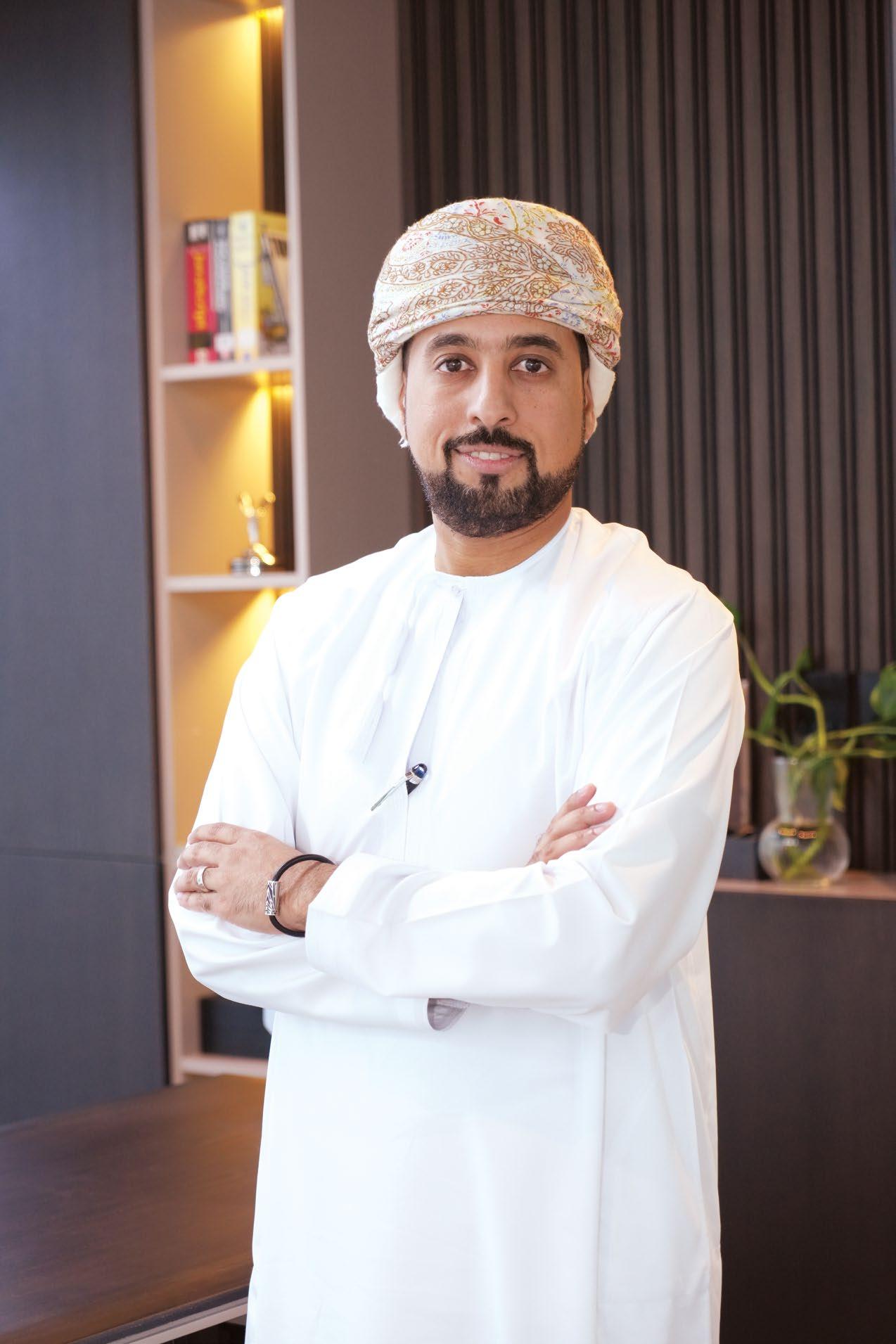

IMPACTFUL LEADERSHIP
Muadh Al Omairi Vice President, Infoline
shares his perspective on enabling organisations in rethinking their customer engagement strategies by leveraging empathy, technology and data to create meaningful impact

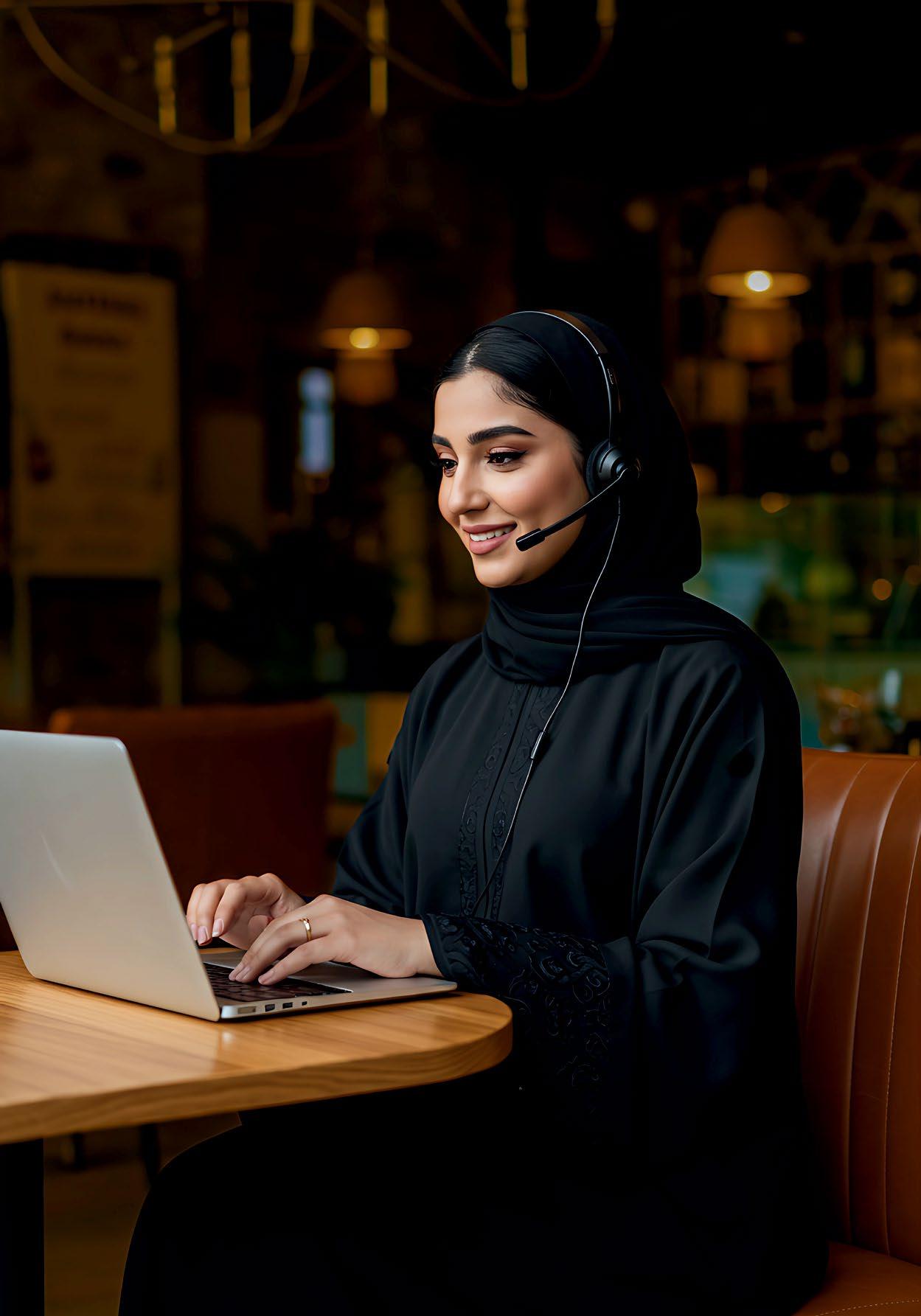


Elevating Brands CX Since 2004







EDITORIAL
Editor-in-chief
Said Masoud Almashani
Executive Vice President and Group Editor
Mayank Singh
Editor
Oommen John P
DESIGN
Director Production – Print & Digital
Ramesh Govindaraj
Chief Photographer
Rajesh Rajan
Cover concept
Rakesh Radhakrishnan
MARKETING
Associate Advertising Director
Shivkumar Gaitonde
Business Manager
Dhanish Pillai
CORPORATE
Chief Executive Officer
Atulya Sharma Distribution
Published by
LLC
United Press & Publishing LLC
PO Box 3305, Ruwi, Postal Code - 112 Muscat, Sultanate of Oman
Tel: (968) 24700896, Fax: (968) 24707939
Website: www.umsoman.com
All rights reserved. No part of this publication may be reproduced without the written permission of the publisher. The publisher does not accept responsibility for any loss occasioned to any person or organisation acting or refraining as a result of material in this publication. OER accepts no responsibility for advertising content.
Copyright © 2025 United Press & Publishing LLC
Printed by Oman Printers & Stationers Ltd. Co. S.P.C.
Correspondence should be sent to:
Oman Economic Review
United Media Services
PO Box 3305, Ruwi 112, Sultanate of Oman
Fax: (968)24707939
Website: www.oerlive.com
For editorial enquiries: 99884854
For advertising enquiries: 99267159
Leading the charge
OER is proud to present the 26th edition of the OER Top 20 – the most definitive ranking of the largest listed companies on the MSX for the year 2024. The survey shows how these entities are solidifying their position while pursuing new opportunities for growth and expansion.
According to Deloitte report on Oman’s 2025 Budget and performance in 2024, actual revenues for 2025 is estimated at RO11.2bn as compared to the budgeted RO12.2bn for 2024. This is mainly on account of a projected decrease in oil production. Oman’s average daily production of oil during 2024 amounted to 1.031mn barrels per day.
During the year ending December 2024, the revenues of Oman’s 20 largest companies showed an increase of RO293mn compared to the year ended December 2023. Total revenues for the OER Top 20 companies increased by three per cent to RO10,496mn. Corporate performance for the year 2024, overall, reduced due to some large losses incurred by some companies. The profits for the year 2024 reduced by 17 per cent to RO1,342mn from RO1,615mn in 2023. The total market cap of the OER Top 20 companies on December 2024 was RO10,019mn, which increased by about 45 per cent compared to 2023 due to the few large IPO in 2024.
The OER Top 20 companies account for 36 percent of the MSM’s total market cap of RO27.6bn as of December 2024. The average P/E ratio for these companies, based on market cap as of March 31, 2025, is seven times their total profits for 2024.
The Top 20 index not only reflects the performance of Oman’s economy but also indicates a robust macro-economic recovery and its cascading effect on the overall performance of the corporate sector.
OommenJohn
Oommen John


Sign up for OERLive's daily WhatsApp updates on economy, lifestyle, and technology. Send us a WhatsApp message with the word “OERLIVE” on 91242930

FUTURISTIC GROWTH
Your cover story made an interesting read. Oman’s manufacturing sector has shown significant growth during the first quarter of 2024. As reported by the National Centre for Statistics and Information, the sector expanded by over 10 per cent compared to 2023, reaching an impressive output of RO1.868 billion. This growth, particularly in oil refining and petrochemicals, not only boosts the sector itself but also stimulates demand across various industries, promoting investment in vital areas like research and innovation.
The Ministry of Commerce, Industry and Investment Promotion has noted a substantial increase in foreign direct investment, reaching RO2.13 billion—a 51.9 per cent rise compared to 2023. The Industrial Strategy 2040, developed in partnership with UNIDO, positions Oman to establish a knowledge-based manufacturing base, aligning with global economic trends and enhancing public health initiatives. It encourages the development of products that contribute to improving public health and well-being. This positive trajectory is crucial for Oman’s economic diversification and prosperity, paving the way for future growth and innovation.
Ahmed Saleh, Seeb
STRIKING A BALANCE
I thoroughly enjoyed reading “One for the Ages” in the OER April 2025 issue. As someone who has long admired the legacy of the Mercedes G-Class, I was initially skeptical about its transition to electric. However, this auto review reassured me that the spirit of the G remains untouched — if not enhanced — in its EQ avatar. The article struck a great balance between technical insight and storytelling. As a fan of the classic look, just the subtle notes of the ‘EQ’ badging without changing much of the classic look is truly appreciated. This thoughtful modernisation perfectly justifies the new direction. What truly stood out for me were the G-Turn and G-Steering features. The ability to let the G 580 spin nearly on its own axis, perfect for tight spots where reversing isn’t an option, combined with intelligent torque distribution that shrinks the turning radius — these innovations rank among the most impressive advances in driving technology I’ve come across. Personally, for someone who struggles in reversing, it’s a slice of paradise. Thank you for capturing both the heritage and innovation of this iconic vehicle so vividly. I look forward to more such insightful features.
Anna Alexander, Muscat
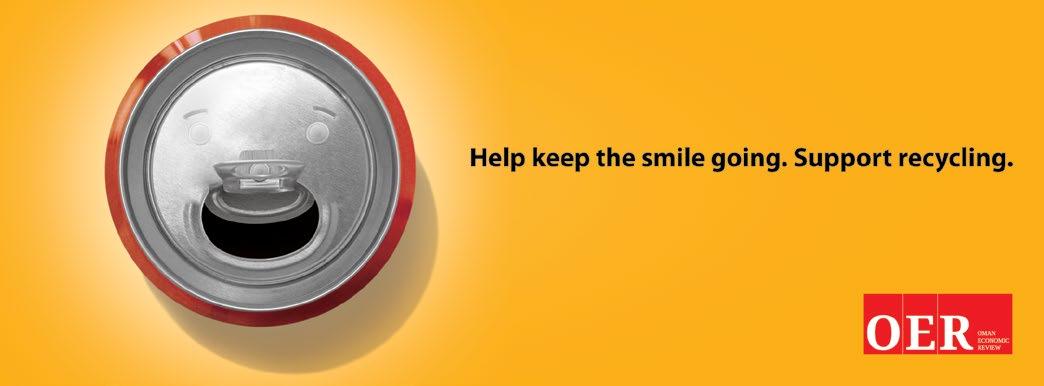


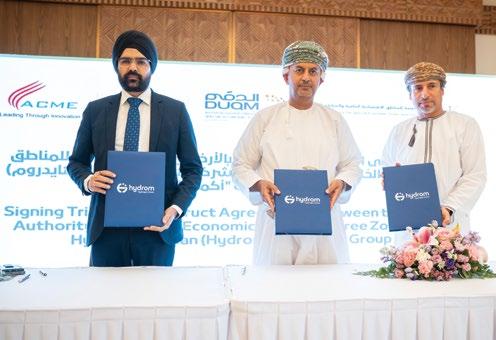
Hydrom, OPAZ AND ACME group sign agreements to integrate Duqm Hydrogen Project into national portfolio
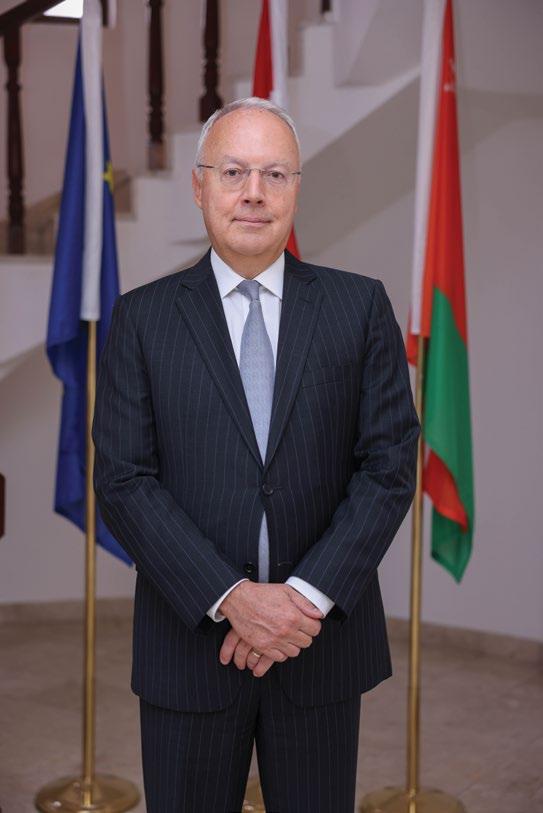
RELATIONSHIP
HE Christophe Ceska, Ambassador of Austria to the Sultanate of Oman sees a host of bilateral opportunities to further trade and investment relations between Austria and Oman
SUSTAINABLE INNOVATION
Oman Cables Industry’s portfolio is engineered to empower all projects in Oman and the region including renewables projects and LEED certified projects in Oman, says CEO, Erkan Aydogdu
South Korea plans to support auto sector with $2B following US tariffs
South Korean officials announced that the government intends to allocate an emergency aid package worth 3 trillion won (around $2 billion) to support the local automotive industry. The move aims to mitigate the impact of the new 25 per cent US tariffs imposed by the administration of President Donald Trump.
SPIEF 2025 to see participation from over 92 countries
The St. Petersburg International Economic Forum (SPIEF), which begins in just over a month has seen a tremendous response with representatives of more than 92 countries confirming their intention to participate. This marks a 5 per cent increase over last year.
Oman oil prices witness drop amid shifting global trade dynamics
In a notable development, the price of Oman crude oil for June 2025 delivery has declined sharply to $64.56 per barrel, marking a substantial drop of $5.96 compared to last Friday’s closing price of $70.52 per barrel.
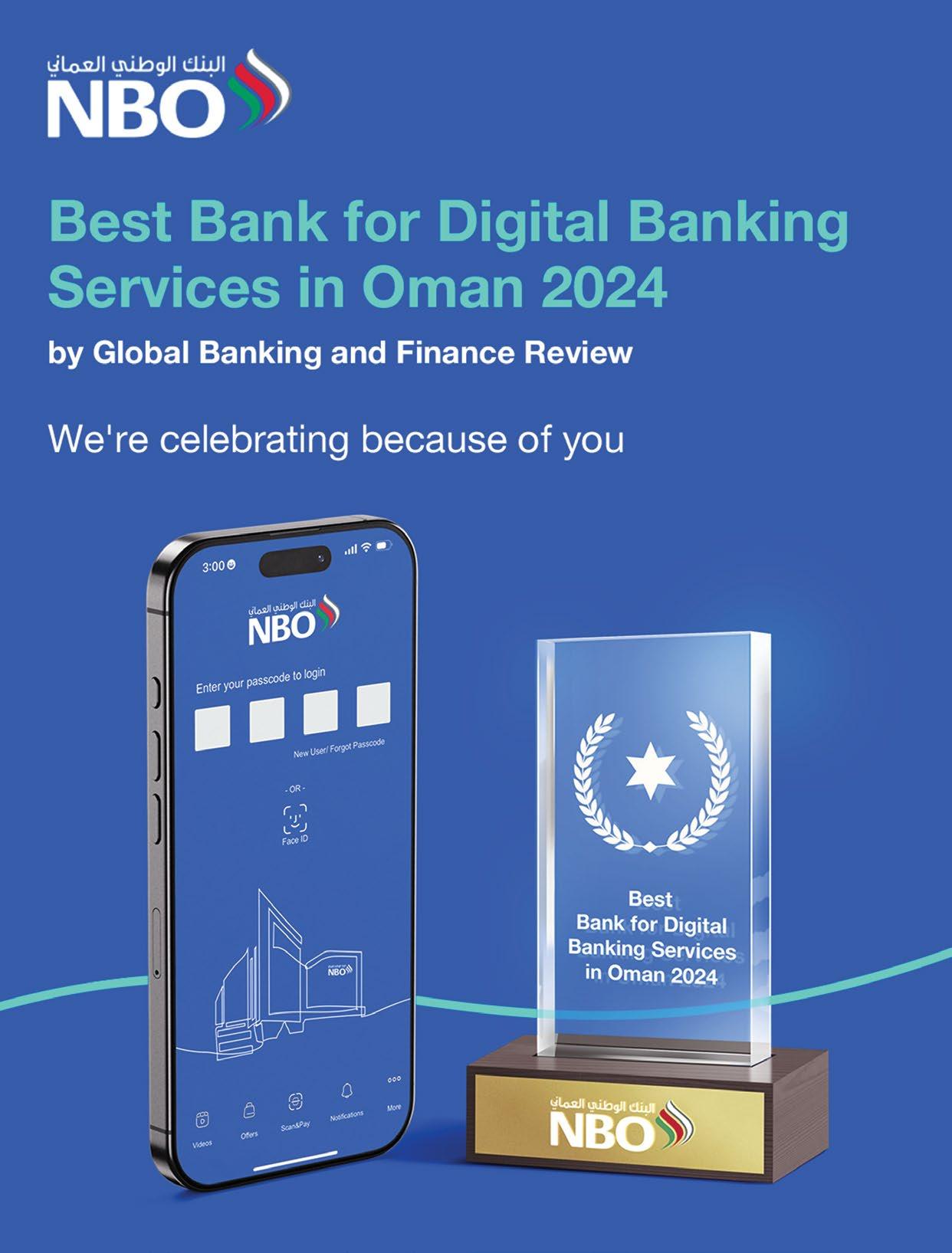

In a proud and historic moment for the Sultanate, Oman has officially hoisted its tallest national flag, an enduring symbol of strength, unity, and pride. The momentous occasion, held under the patronage of His Excellency Saud bin Hilal Al Busaidi, Governor of Muscat, marks a new chapter in nation’s legacy of pride and identity. Standing tall at Al Khuwair Square, the monumental flagpole is the result of a remarkable collaboration between Muscat Municipality and Jindal Steel. The project is a testament to what can be achieved when Corporates CSR aligns with National priorities.
This towering structure stands not only as a feat of engineering but as a profound expression of unity and strength. Fabricated using steel manufactured entirely by Jindal Steel, the flagpole is a testament to the capabilities of local industry and the spirit of cooperation between public institutions and private enterprise. The journey from concept to completion
has been guided by a singular vision: to create a monument that belongs to the people of Oman and evokes a deep sense of belonging and pride.
Sayyid Saud bin Hilal Al Busaidi, Governor of Muscat, said, “This project represents a significant addition to the public amenities of Muscat Governorate, carrying symbolic and cultural value.”
He further added, “We hope this square becomes a vibrant space and an attractive destination that enriches the urban landscape of Muscat, enhances the quality of life for residents and visitors, and contributes to the governorate’s ongoing efforts to humanize the city and strengthen social connections across its neighborhoods.”
Highlighting the national importance of the project, Naveen Jindal, Chairman of Jindal steel Group, stated, “This landmark is not just a physical structure, it is a powerful reflection of Oman’s enduring values and forward-
looking vision. Throughout the history of modern civilizations, it is evident that “Steel Builds Nations”—not just through the usage of steel, but through the multiplier effects of the steel value chain, in creating a vibrant economy. Jindal Steel’s steely commitment towards the community is evident in our various initiatives aimed at creating a sustainable impact and inclusive growth. Al Khuwair Square stands as a testament to the kind of socially sustainable projects we aspire to develop that showcase national identity, and uphold the rich culture, noble values, and ancient heritage of Oman -embodying the spirit of partnership between the public and private sectors.
HE Ahmed bin Mohammed Al Humaidi, Chairman of Muscat Municipality, said, “The opening of this distinctive urban project is a qualitative addition to the capital, Muscat, and reflects the ambitious vision of creating vibrant public spaces that meet the community’s
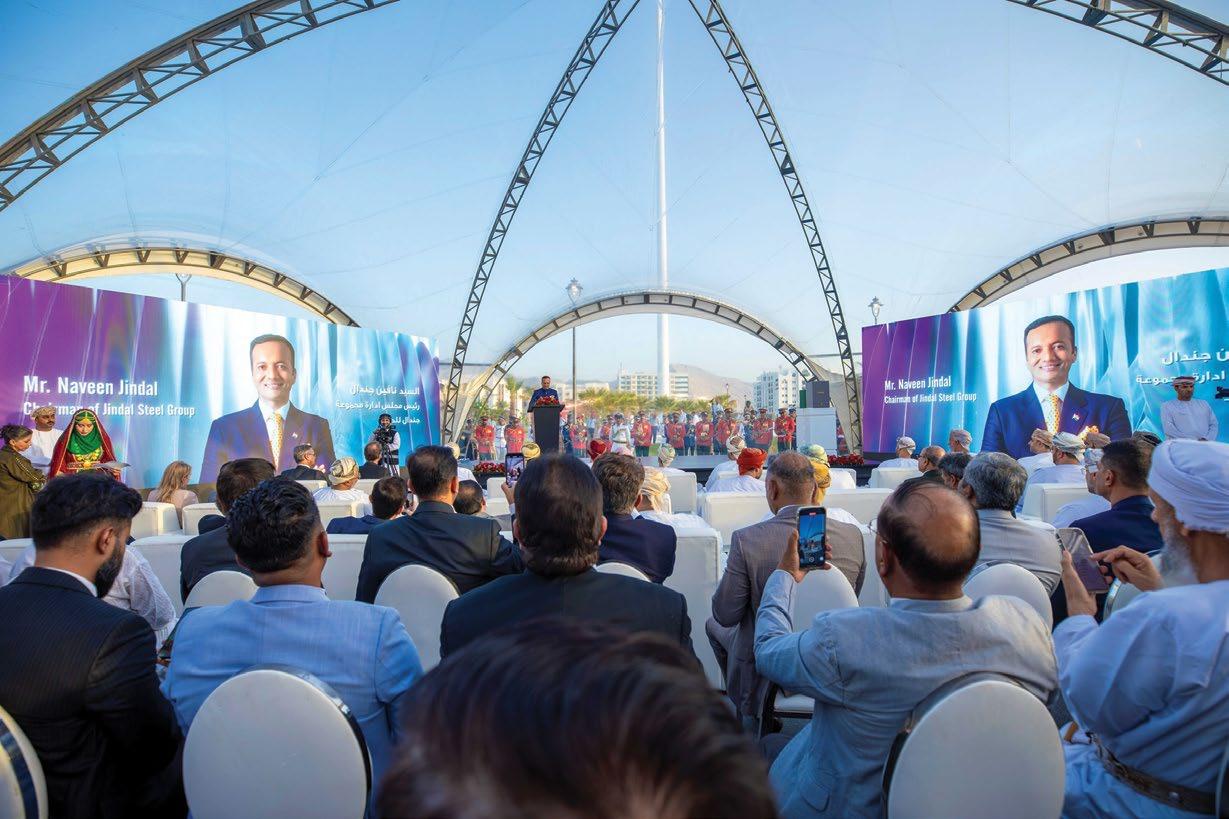
aspirations by providing sustainable areas that incorporate natural elements and Omani identity.”
He further mentioned, “this project is the result of integrated and constructive cooperation between the public and private sectors, through a strategic partnership between the Governorate of Muscat, represented by Muscat Municipality, and Jindal Steel, embodying the importance of national partnerships in achieving sustainable urban development goals.”
Commenting on the occasion, Harssha Shetty, CEO, Jindal Steel, Oman, said, “Jindal Steel is grateful to the Sultanate of Oman for the opportunity to partner in building this deeply symbolic landmark that will forever stand as a representation of Oman’s unity and ambition. We extend our sincere thanks to Muscat Municipality for their trust and collaboration throughout this journey. It is our belief that this flagpole will inspire generations and remain a shining emblem of what Oman stands for. Al Khuwair Square is set to become a vibrant melting pot of community celebrations showcasing local art, culture, tourism, and family togetherness, and we are honored to have played our part in bringing it to life.”
Located at Al Khuwair Square, the 126-meter-tall flagpole is supported
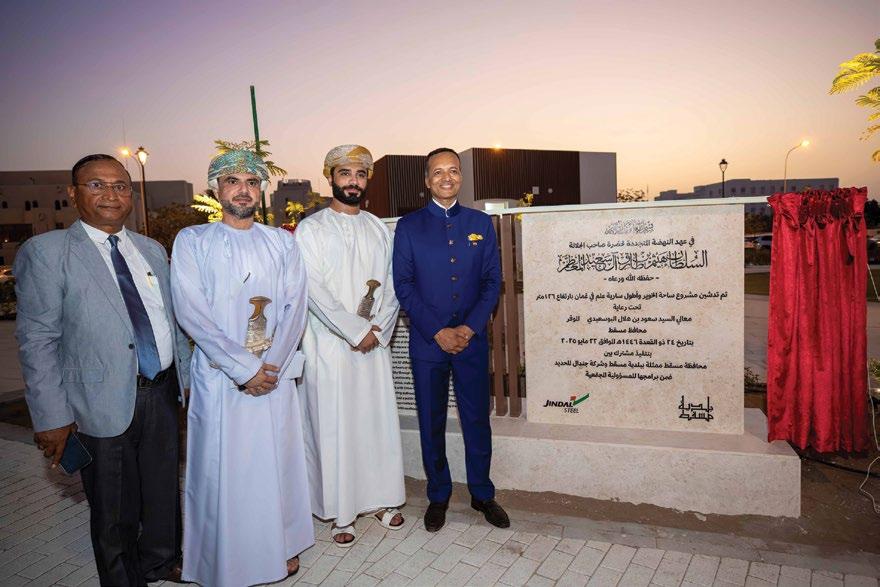
by a robust foundation system. The flagpole itself was built using 141 metric tons of Jindal structural steel and 135 metric tons of Jindal rebar, totaling 276 metric tons of high-quality Jindal steel. The project spans a total plot area of 21,638 sq. m and includes green landscaping featuring 57 diverse species of vegetation. Customised design elements such as wayfinding signage, a Mashrabiya pattern integrated around the flagpole, and decorative marble paving at the podium enhance the aesthetic appeal. The square also includes a range of public facilities such as open lawns, walkways, a central sunken plaza, kiosks, a 415-meter cycle
path, cafeteria with drive-thru, public amenities, parking for 73 cars, and thoughtfully designed site furniture.
Jindal Steel’s broader CSR strategy further underscores its deep commitment to national development. Over the years, the company has launched and supported numerous initiatives across sports, education, healthcare, environmental sustainability, and social empowerment. The development of the tallest flagpole is a natural extension of this legacy—a visible, lasting tribute to the values of giving back, nation-building, and fostering collective pride.
Sohar International and Sohar Islamic launch landmark credit card campaign offering premium rewards
Reinforcing their customer-first philosophy and commitment to delivering superior banking experiences, Sohar International and Sohar Islamic have recently launched a Credit Card Acquisition and Spend Campaign aimed at enhancing value, convenience, and access for both new and existing clients. The campaign encourages customers to apply for and actively use their Visa Credit Cards, unlocking a suite of exclusive benefits and a chance to win premium prizes through monthly raffle draws. Commenting on the launch, Abdul Qader Al Sumali, Chief Retail and Premier Banking Officer at Sohar International, stated, “At Sohar International, we firmly believe that banking excellence is not merely about delivering financial solutions, it’s about enriching our customers’ lives through exceptional value-added benefits. Our credit card packages are thoughtfully designed to address a wide range of needs, from comprehensive insurance and 24/7 global assistance to concierge services, travel and shopping privileges, and exclusive deals from leading international brands. These distinctive offerings reflect our unwavering commitment to delivering a holistic banking experience that places our customers at the forefront of distinction and exclusivity.”
To incentivise engagement, Sohar International and Sohar Islamic are offering a combined total of more than 400 smart devices as part of this campaign. Winners will be selected through monthly raffle draws, with 30 winners from Sohar International and 10 from Sohar Islamic each month. The prizes will be distributed on a rotating basis to maintain excitement and encourage sustained participation. Anchored in a customer-centric product offering, the campaign highlights the compelling credit card proposition designed to meet the various needs and preferences of consumers. Whether new-to-bank or existing customers, applicants will benefit from a lifetime
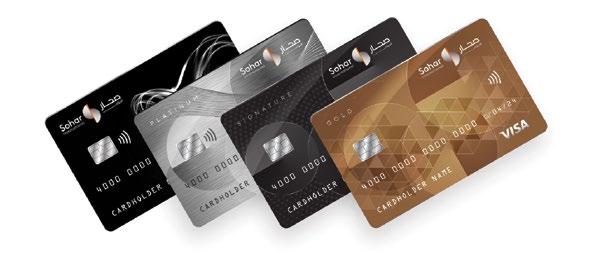
free card, eliminating annual fees and ensuring long-term affordability, in addition to an easy payment plan. Additionally, cardholders gain access to the widely recognized Entertainer App, unlocking hundreds of exclusive offers across dining, retail, and entertainment outlets. Tailored for those with dynamic lifestyles, the card further enhances the travel experience by providing access to over 1,000 international airport lounges, delivering elevated comfort across global journeys. To add immediate value, new users will receive up to 5,000 welcome points and 500 bonus points upon activation. For continued benefit, cardholders enjoy 1% cashback on their purchases, reinforcing everyday utility with tangible financial rewards.
The campaign is designed to engage a diverse range of customer segments. Customers who spend a minimum of RO50 using their credit card will qualify for entry into the monthly raffle draw. The offer applies to all existing Sohar International and Sohar Islamic credit card holders, as well as current customers who do not yet hold a credit card but apply for one during the campaign period.
Bank Muscat hosts discussion panel about E-Mandate for Government Institutions and Corporates

Bank Muscat, the leading financial services provider in the Sultanate of Oman, recently hosted an insightful discussion panel introducing its newly launched E-mandate for Direct Debit transactions. The event brought together senior representatives from key entities including the Central Bank of Oman. Attendees engaged in a series of informative presentations followed by an interactive session that encouraged dialogue, knowledge sharing, and collective input on how the E-Mandate solution can be adopted to enhance operational efficiency across sectors. Ilham Murtadha Al Hamaid, General
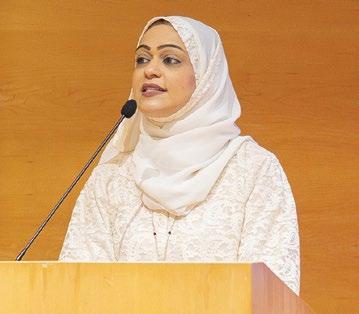
Manager Corporate Banking, at Bank Muscat, highlighted the Bank’s commitment to digital transformation and customer-centric innovation. She emphasised that the introduction of the E-Mandate solution reflects Bank Muscat’s leadership in financial technology and it’s continuous investment in infrastructure to support, secure, scalable, future-ready banking solutions.
Al Hamaid encouraged institutions to leverage this new service as part of their digital transformation journey, reiterating that Bank Muscat will continue to evolve its banking offerings for both government and private sectors by providing innovative solutions tailored to their diverse needs. Wafa Ibrahim al Ajmi, Assistant General Manager of Transaction and Government Banking Services at Bank Muscat, noted that the E-Mandate initiative is a testament to the strong collaboration between the Bank and its strategic partners.
The E-Mandate operates on a one-time “direct debit mandate authorization” basis, enabling government and corporate customers to initiate direct debit mandate registration electronically through Bank Muscat Internet Banking platform. Upon receiving a mandate initiated by the beneficiary customers, the payers can review, approve, and electronically authorize the mandate via Internet Banking or Mobile App, thereby streamlining the payment process without the need for physical documentation or post-dated cheques.
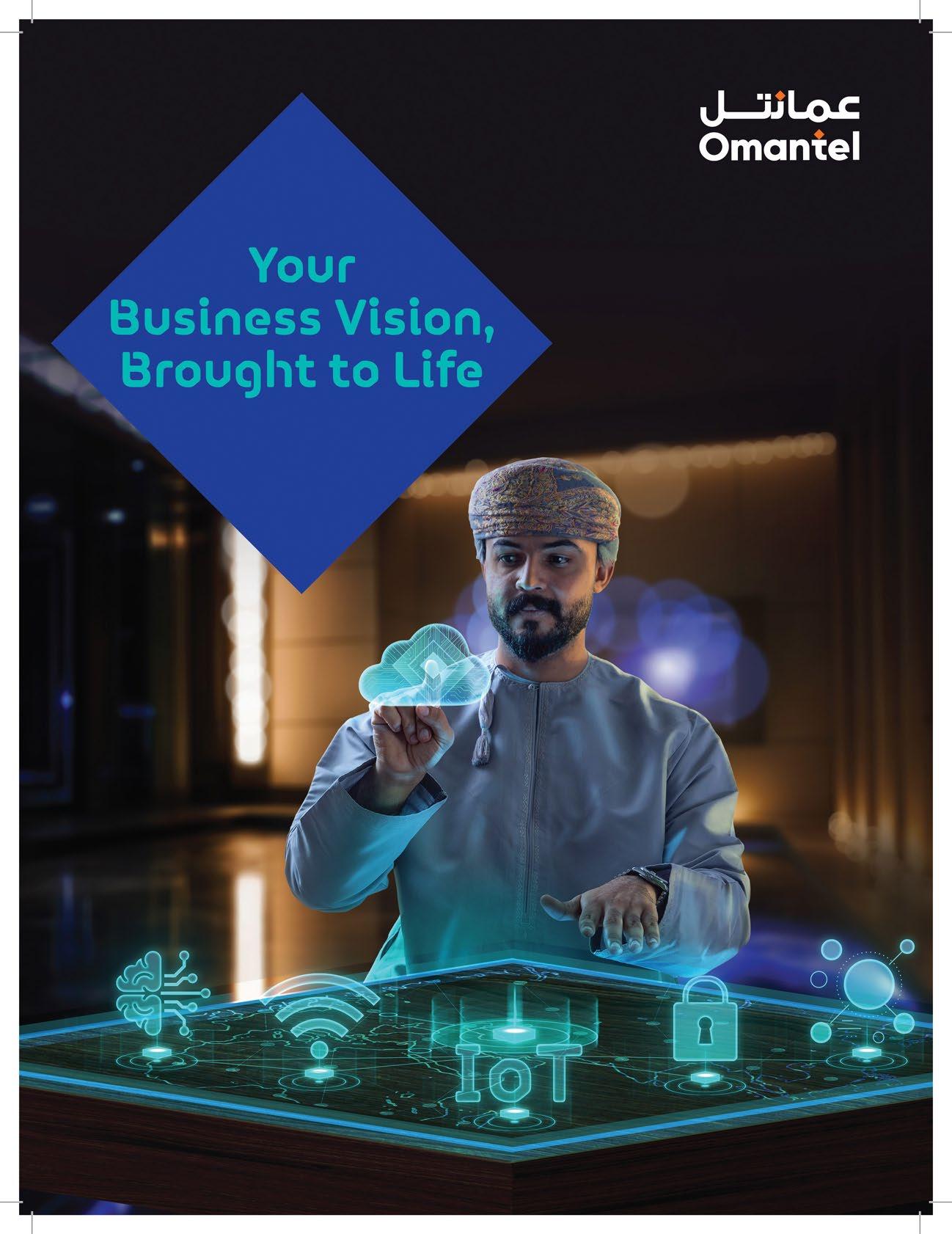

EMPOWERING ENTREPRENEURS
Bank Muscat launches exclusive Visa Platinum Business Credit Card for “Najahi” Business Banking customers
In affirmation to its ongoing commitment to providing exceptional banking services and solutions that meet the diverse needs of customers from individuals and corporates, Bank Muscat, the leading financial services provider in the Sultanate of Oman, has announced the launch of the Visa Platinum Business Credit Card for its “Najahi” Business Banking customers including Micro, Small and Medium-sized Enterprises (MSMEs) and entrepreneurs. The Visa Platinum Business Credit Card is tailored to meet the needs of Najahi customers seeking flexible financial solutions to complete their business purchase transactions.
The Visa Platinum Business Credit Card provides customers to avail a card limit of up to RO5,000. The card comes with a range of benefits for customers, including a 0.5 per cent cashback on all purchases, access to 25 airport lounges worldwide, discounted offers for selected merchants, and various other business-related benefits and offers. Furthermore, the card offers an interest-free repayment period, providing enhanced financial flexibility and reducing the financial burden on customers.
The Visa Platinum Business Credit Card is a significant addition to Bank Muscat’s diverse portfolio of banking products and services. It is designed to enhance the banking experience of “Najahi” customers by offering them innovative financial solutions to overcome market challenges, hence, enabling them to complete transactions with ease and achieve their financial goals. Along with Najahi Debit Card and Najahi Pre-Load Card, this product
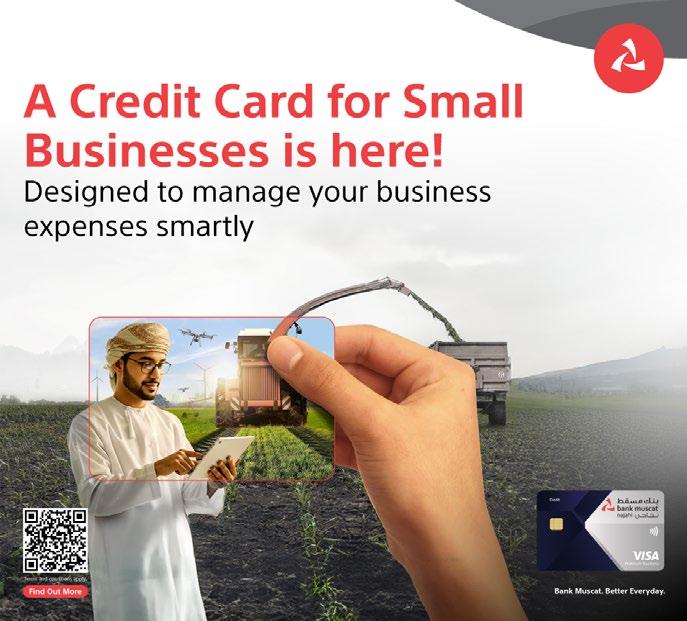
empowers entrepreneurs and MSMEs to benefit from exceptional features that enhance financial management and support their operations.
Bank Muscat places great emphasis on digital transformation and is committed to offering innovative digital banking solutions. This includes the online banking platform, which provides business customers with 24/7 access to manage their financial transactions, helping MSMEs control their finances and facilitating growth. Through these efforts, the Bank continues to offer financial solutions tailored to meet the specific needs of businesses in Oman, ultimately supporting their growth and
development. Bank Muscat recognizes the importance of Micro, Small and Medium-sized Enterprises (MSMEs) in diversifying the economy and fostering competition. The launch of the “Najahi” Business Banking Unit in 2014 is a testament to the Bank’s commitment to supporting SMEs by providing a wide range of banking services designed to help these businesses thrive.
To obtain more information on the “Najahi” Credit Card or access the terms and conditions of applying for it, customers can contact the respective team contact at 24790000 or visit the Najahi Business Banking page at Najahi@bankmuscat.com.
SUSTAINABLE INNOVATION
Oman Cables Industry’s portfolio is engineered to empower all projects in Oman and the region including renewables projects and LEED certified projects in Oman, says CEO, Erkan Aydogdu in an interview with Oommen John
Can you share the key achievements of Oman Cables Industry in the year 2024?
Oman Cables Industry (OCI), the leading cable solutions provider in the Sultanate, is committed to sustainable growth, aligning with its vision of ‘Empowerment, Innovation, and Excellence.’ In 2024, OCI expanded its product portfolio to include green cables and other sustainable offerings tailored to meet the growing demands of renewable energy projects. The company is continuing its mission to push the boundaries of innovation, reinforcing its position as a leader in the transition to sustainable energy solutions. Guided by ambitions in Climate, Social, Innovation, and Governance, the company recorded significant growth in 2024, driven by increased exports in the renewable energy sector, supported by its Renewable Excellence Centre. The Group recorded an impressive sales turnover marking 8.3 per cent yearon-year increase, reaching RO268.7mn, and net profit surging 19.5 per cent, reaching RO22.622mn. This growth was driven by a careful commercial strategy that has favoured diversification and penetration in the various business areas and a strong push towards sustainable innovation, with the expansion of the product portfolio, including high-value-added solutions and services.
How does the company differentiate itself from competitors in the rapidly evolving cable manufacturing sector?
Through the partnership with Prysmian - the global leader in the cable manufacturing and system solutions for the energy transition and digital transformation - Oman Cables Industry continues to strengthen its position in and outside Middle East. The opportunities offered during 2024 were including access to a broader product portfolio of green cables and eco-friendly solutions, together with enhanced service offerings, from monitoring to tracking systems, covering the new needs of the diverse industries. This was made possible through accessing to 27 Prysmian cutting-edge research centres worldwide, accelerating the development of innovative products and integrated solutions, but also through leveraging global testing facilities, ensuring the highest international quality standards, advanced expertise and industry best practices, preparing and qualifying the company to compete with highest European standards.
In what ways is the company contributing to the local economy, particularly in terms of job creation and skill development?
During the past 5 years, the company has increased its net profit significantly, creating value for its shareholders, for its employees - who have since become shareholders of Prysmian group according to a rewarding profit share based system - and for the Omani community. As part of its contribution to Oman Vision 2040 and the journey toward net zero by 2050, Oman Cables
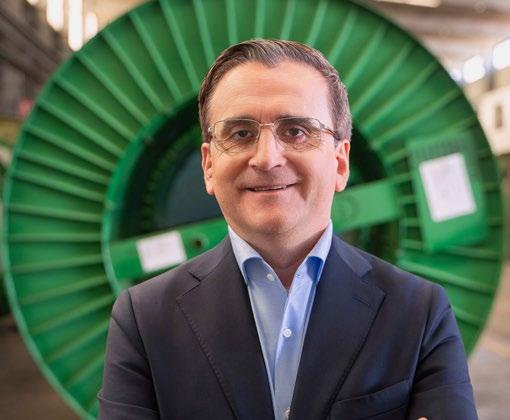
is dedicated to driving sustainable growth. It has transferred know-how and technology to the Sultanate and is expanding its geographical reach beyond GCC and Middle East. Further, it has created and nurtured a talent pool through different advanced leadership programs and the employees are appreciated in every part of the globe, having the opportunity to work any different locations worldwide, exposed to international practices and global experiences and expertise. Furthermore, it has opened its Omani Sustainability Academy, that enjoys collaboration with the best universities in the world, not only to cater for the 33,000 Prysmian employees but also to our stakeholders, playing a responsible role in the communities where we operate.
What are the challenges and opportunities that the company anticipates over the next five years, and how is it preparing to address them?
As the company celebrates 40 plus years of excellence, it remains committed in driving innovation to support Oman Vision 2040. The continuous focus and investments in sustainable and innovative technologies and being the Renewable Excellence Centre in the region, reflect the company’s pledge to a smarter, safer future, both locally and globally. From Prysmian E-Path and solar renewable solutions to digital advancements like Omhero and Alesea, our portfolio is engineered to empower all projects in Oman and the region including renewables projects and LEED certified projects in Oman. “Sustainability, innovation, quality, safety, and efficiency are at the heart of every solution we deliver.” Contributing to Oman Vision 2040, OCI’s initiatives reaffirm its leadership in delivering safe, efficient, and sustainable cable solutions, powering the nation’s infrastructure, energy transition and smart cities of the future.
IMPACTFUL LEADERSHIP
Muadh Al Omairi,
Vice President, Infoline shares his perspective on enabling organisations in rethinking their customer engagement strategies by leveraging empathy, technology and data to create meaningful impact
How do you define customer experience in today’s digital-first economy, and why is it more critical than ever?
Customer experience (CX) is the sum total of every interaction a customer has with a brand—from the first click to post-sale support. But today, it goes beyond just delivering service. It is about creating emotionally intelligent, end-to-end experiences that are connected, personalised, and consistent across all touchpoints.
In a hyper-competitive digital economy, products and pricing can be easily replicated, but experiences cannot. What truly differentiates a business today is how it makes its customers feel—and how effortlessly it can meet their needs. CX has become the new battleground for brand loyalty. Companies that prioritise CX see higher customer lifetime value, lower churn, and sustainable growth. The ROI is no longer theoretical, it is measurable and undeniable.
What role is artificial intelligence playing in the evolution of CX, and what does the future look like?
Artificial intelligence is revolutionising the way businesses understand and serve their customers. It is enabling real-time personalisation, predictive service, and automated conversations at a scale we could not imagine a decade ago. Natural Language Processing (NLP), sentiment analysis, and AI-powered chatbots are no longer futuristic—they are foundational. But where AI becomes transformative is when it is used not to replace human touch, but to enhance it. AI empowers businesses to listen better, respond faster, and anticipate needs before
customers even express them. Imagine an ecosystem where customer support knows your issue before you call, or a website that adapts based on your past preferences and behavior. That is where we are heading—toward hyper-personalized, proactive, and frictionless experiences. The future of CX lies in augmented intelligence, a blend of human empathy and machine efficiency. And the businesses that will lead are the ones who learn to orchestrate both seamlessly.
How can businesses practically map and optimise the customer journey using automation and AI tools? It begins with data—real-time, structured, and unstructured data across the entire customer journey. Businesses need to visualise the journey, not just as a linear path, but as a dynamic network of touchpoints influenced by context, intent, and emotion. Tools like customer journey analytics platforms, heatmaps, and AI-driven dashboards help identify friction points, drop-offs, and conversion triggers.
Once the journey is mapped, automation can be layered in strategically. For example, an intelligent IVR can route calls based on intent, reducing wait times and increasing satisfaction. A chatbot can handle 60 per cent of enquiries instantly, while complex cases get routed to human agents with full context. AI can even predict when a customer is likely to churn, allowing the business to intervene with a tailored offer or conversation.
The key is continuous optimisation— CX is not a “set it and forget it” function. With the right AI and
automation stack, businesses can iterate, test, and evolve their journeys just like they do with product development or marketing campaigns.
From your experience, what’s the most common mistake organisations make when it comes to customer experience strategy?
The biggest mistake is treating customer experience as a siloed function—often parked under marketing or customer service. CX should be treated as a strategic pillar that cuts across every department, from operations and product to HR and finance.
Every team, regardless of role, contributes to the customer journey in some way. Another common oversight is data inertia—businesses collect vast amounts of customer data but do not activate it meaningfully. The value of feedback lies not just in gathering it but in closing the loop—responding, refining, and personalising based on real-time insights.
Lastly, many companies jump into CX technology before defining their CX vision. Tech is an enabler, not a strategy. The most successful organisations start with purpose: What do we want our customers to feel? Then they design the journey and deploy the tools that bring that feeling to life.
What advice would you give to companies that want to grow and scale through CX transformation? Start by understanding that growth through CX is not about spending more—it is about spending smarter. The most scalable businesses are those that invest in clarity—clarity of journey, roles, data, and purpose.
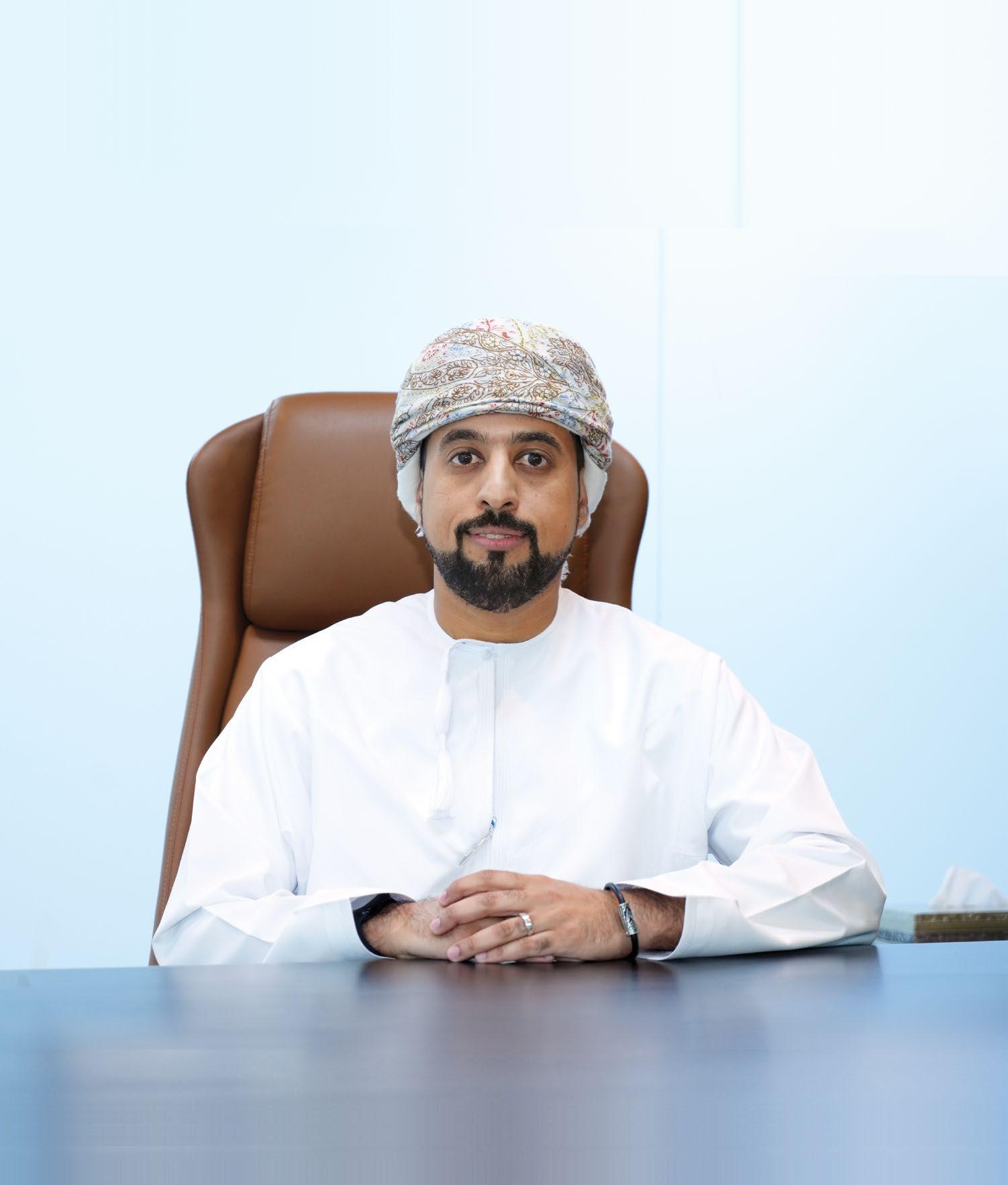

GROWING A HISTORIC RELATIONSHIP
HE Christophe Ceska, Ambassador of Austria to the Sultanate of Oman sees a host of bilateral opportunities to further trade and investment relations between Austria and Oman. Mayank Singh reports
Can you share details of OmanAustria bilateral trade relations?
Austria has a long history of good and friendly relations with the Sultanate of Oman. The 50th anniversary of diplomatic relations was celebrated in Muscat in 2023. Austria highly values Oman’s traditional foreign policy of reconciliation and dialogue with all its neighbouring states. The release of two Austrians from Iranian prison in the summer of 2023 also came about thanks to Omani mediation.
Negotiations are currently underway between Austria and Oman on a series of sector-specific memoranda of understanding, which should help to further deepen our excellent bilateral relations. The finalised agreement between Austria and Oman for the elimination of double taxation should enter into force soon. Next year, the first Empress Sissi exhibition should be held in Muscat. We are currently working on realising the former project of an exhibition of the world-famous Museum of Art History in Vienna in the National Museum in Muscat.
Austria and Oman have a further political instrument at multilateral level as respective member states of the European Union and the Gulf Cooperation Council, which emphasises the trusting relations between the two countries.
On the commercial front, Austria and Oman maintain a modest but steadily evolving bilateral trade relationship, underpinned by strategic cooperation in various sectors.
Bilateral discussions have highlighted several sectors for enhanced collaboration: On hydrogen, Austria has expressed interest in cooperating with Oman in the production of green hydrogen, aligning with both nations’ sustainability goals.
Opportunities exist also to develop joint ventures in tourism, construction, and infrastructure projects and there is a shared focus on advancing technology initiatives and vocational education, including the adoption of Austria’s dual-learning system. Having developed its own national AI strategy, Austria is keen to explore collaborative efforts with Oman in this field.
What are the key milestones in the bilateral trade relationship between Oman and Austria over the past decade?
Over the past decade, the bilateral trade and economic relationship between Oman and Austria has evolved through strategic engagements, official visits, and sector-specific collaborations. Here are the key milestones:
• 2014: Establishment of Austrian Business Presence in Oman
• The Austrian Chamber of Commerce opened an office in Muscat, facilitating direct support for Austrian businesses seeking to enter the Omani market.
• 2019: Austrian Trade Mission to Oman
• A delegation of Austrian companies
visited Muscat to explore business opportunities in infrastructure and engineering sectors. The mission included B2B meetings aimed at fostering partnerships between Austrian and Omani firms.
• 2021: High-Level Political Talks
• Austrian Foreign Minister HE Alexander Schallenberg visited Muscat, accompanied by a business delegation. Discussions focused on enhancing cooperation in culture, tourism, vocational training, and technology. A memorandum of understanding on political consultation was signed, and the new Austrian Embassy headquarters in Muscat was inaugurated.
• 2022: Ministerial Visit and Focus on Renewable Energy
• Austrian Minister for Digitalisation and Economy, Margarete Schramböck, visited Oman with a business delegation. Talks centered on renewable energy, dual education systems, and infrastructure projects, including a visit to the STRABAG dam construction site in Muscat.
• 2023: 50th Anniversary of Diplomatic Relations
• Oman and Austria celebrated 50 years of diplomatic ties. Events included art exhibitions and cultural exchanges, underscoring the depth of bilateral relations.
• December 2023: Omani-Austrian Business Forum
• The Oman Chamber of Commerce
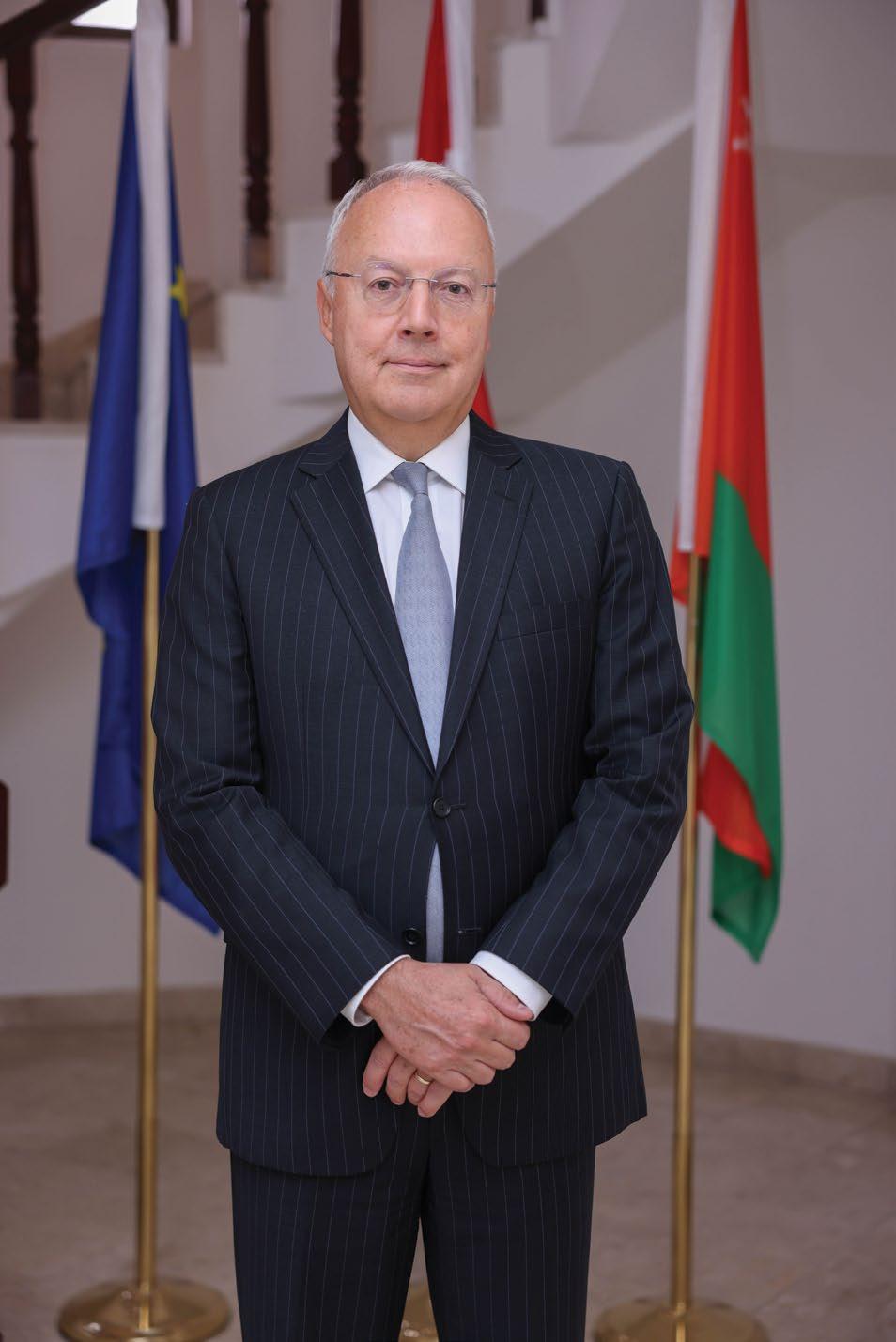

and Industry, in collaboration with the Ministry of Commerce, Industry and Investment Promotion, organised a forum to discuss cooperation in tourism, industry, construction, infrastructure, IT, and medical education. The forum highlighted investment opportunities aligned with Oman Vision 2040, focusing on sectors like green hydrogen and food security.
January 2025: Austrian Trade Mission in Mining and Minerals
Austrian companies specialising in mining and minerals visited Oman to explore collaboration opportunities. The mission was part of a broader effort to strengthen economic ties and foster innovation in the sector.
These milestones reflect a growing and diversified partnership between Oman and Austria, characterised by strategic dialogues, sector-specific cooperation, and a shared commitment to sustainable development and innovation.
What opportunities exist for Austrian companies to expand their exports to Oman, considering the recent trade statistics?
Given the recent trends and the areas of strategic collaboration between Austria and Oman, there are several promising opportunities for Austrian companies to expand their exports to Oman. Here are some key sectors where Austrian products and services can find growing demand in Oman:
Renewable Energy and Green Technologies
Oman is committed to diversifying its energy sources and has been investing heavily in renewable energy, particularly solar and wind power. The country is also exploring green hydrogen, aligning with Austria’s expertise in clean energy technologies. Therefore, Austrian companies specialising in renewable energy equipment, solar panel technology, wind turbines, and energy storage solutions could tap into the growing demand in Oman. Austria’s commitment to sustainability
INTERVIEW
and green technologies - as of 2023, Austria has made significant strides in renewable energy, with approximately 87 per cent of its electricity generation derived from renewable sourcesmakes it a natural partner for Oman in its energy transition.
Infrastructure Development
Oman’s infrastructure sector is a key focus area in its Vision 2040 plan, with investments in transport, urban development, and tourism infrastructure. Austrian companies with expertise in construction, engineering, and specialised infrastructure technologies could benefit from high-demand projects in roads, railways, airports, and urban planning. The recent Austrian diplomatic and business delegation visits have underscored Austria’s readiness to engage in large infrastructure projects.
Tourism and Hospitality
Oman is positioning itself as a prime tourist destination in the Middle East, with a focus on eco-tourism, cultural heritage, and luxury travel. Austrian companies involved in hospitality management, hotel construction, and eco-tourism could find substantial demand. There are also opportunities for Austrian firms in providing highend tourism experiences, such as tour operators, event planning, and services catering to luxury travellers. During the 2023 Oman-Austria Business Forum, tourism emerged as a major point of discussion, with both countries looking at expanding their tourism sectors.
Healthcare and Medical Technology
Oman’s healthcare sector is rapidly expanding, and there is a growing need for advanced medical equipment, healthcare management solutions, and specialised medical training. Austrian companies that provide cutting-edge medical technologies, digital health solutions, and specialised healthcare services have significant prospects in Oman. There is also demand for training in medical fields, where Austria’s dual education system can be a unique offering. Both Austria
and Oman are keen to expand their collaboration in medical education and technology.
Food and Beverage
As Oman’s population grows and diversifies, so does its appetite for high-quality food and beverages. The country’s strong demand for premium and specialised food products, including organic and sustainable options, presents opportunities for Austrian exporters. Austrian companies in the food and beverage sector, especially those involved in organic food, specialised dairy, and premium beverages like wine and spirits, could find a niche market in Oman. Trade statistics show a growing interest in imports of Austrian agricultural products.
Technology and Industrial Equipment
Austria is known for its high-tech industrial machinery, precision equipment, and specialised components, which are crucial to the modernisation of Oman’s industrial base. Austrian companies in sectors such as manufacturing, automation, robotics, and IT services have significant prospects in Oman, especially in areas like industrial automation, data analytics, and artificial intelligence. The Austrian Minister’s visits to Oman in 2021 and 2022 stressed the importance of digitalisation and technological collaboration, indicating a growing interest in these sectors.
Education and Vocational Training
Oman is focusing on improving its education and vocational training systems, particularly in technical and specialised fields. Austria’s dual education system, which integrates apprenticeships with formal education, is highly regarded and aligns with Oman’s efforts. Austrian institutions could partner with Omani organisations to offer educational programs and vocational training, especially in fields like engineering, healthcare, and IT. Education and training are also areas of focus in recent bilateral discussions, with Austria promoting its expertise in skills
development and knowledge transfer.
Automotive and Mobility Solutions
Oman’s automotive market is expanding, and there is growing interest in sustainable mobility solutions, such as electric vehicles (EVs) and hybrid technologies. Austrian companies specialising in automotive engineering, electric vehicle technology, and mobility solutions could benefit from Oman’s evolving automotive sector. As Oman looks to develop its transportation and infrastructure systems, the demand for advanced automotive technology is likely to rise.
In summary, the key opportunities for Austrian companies to expand their exports to Oman revolve around sectors such as renewable energy, infrastructure, tourism, healthcare, food and beverages, technology, and education. With the growing economic and diplomatic ties between the two countries, Austrian companies are wellpositioned to explore these markets through increased collaboration, trade missions, and direct investments.
Which sectors in Oman show the most potential for Austrian investment?
Oman presents a range of promising sectors for Austrian investors, particularly in areas that align with Austria’s expertise in renewable energy, advanced manufacturing, and sustainable technologies. The Omani government’s Vision 2040 strategy emphasises economic diversification and openness to foreign investment, creating a conducive environment for Austrian enterprises.
Oman’s abundant solar and wind resources position it as a key player in renewable energy. The country has initiated significant projects, including the Duqm Green Hydrogen Project in collaboration with Belgium-based DEME Group, aiming to produce green hydrogen and ammonia. Oman’s commitment to achieving net-zero carbon emissions by 2050 underscores its dedication to sustainable energy initiatives. As approximately 87
per cent of electricity generation in Austria is derived from renewable sources, Austrian firms specialising in renewable technologies and energy storage solutions may find substantial opportunities in this sector. Green hydrogen will play a key role in Oman’s future energy supply and exports, and Austrian technology companies such as AVL are looking into activities in Oman.
Oman’s manufacturing sector experienced over 10 per cent growth in the first half of 2024, driven by expansions in oil refining, petrochemicals, and basic chemicals. The government supports industrial growth through incentives and the development of industrial parks and free zones. Austrian companies with expertise in advanced manufacturing, machinery, and industrial automation could leverage these opportunities. A good example in that regard is Mondi Oman, a company which produces industrial paper bags - a typical product is the paper bag which is used by cement companies to pack their cement. Mondi Oman is part of the international Mondi Group, a global leader in packaging and paper, with headquarters in Vienna, Austria. The company was established as a greenfield operation in Oman in 2004 with the objective to supply customers in Oman and other GCC countries in various market segments of cement, building material, chemical, and food/ feed with high quality industrial paper bags for their product packaging.
During the past 21 years, Mondi Oman has found that the decision to establish a production operation in Oman was a right decision facilitated by the investment friendly environmentwhich has allowed Mondi Oman to achieve significant growth during these years, with customers in the local Oman market, as well as significant export customers located across the GCC, East Africa, India, and other countries.
Strategically located between Asia, Africa, and Europe, Oman is enhancing its logistics infrastructure to become a global logistics hub by 2040. Investments in deep-water ports like Salalah, Sohar, and Duqm, along with
improved road and rail networks, create prospects for Austrian firms in warehousing, transportation services, and supply chain management.
Oman’s rich cultural heritage and natural landscapes are central to its Vision 2040 tourism strategy, aiming to increase tourism’s contribution to GDP. Projects like the development of Jebel Akhdar Mountain into a luxury tourist destination highlight the country’s commitment to this sector. Austrian investors in luxury hospitality, ecotourism, adventure and cultural tourism could find collaborative opportunities here.
Oman is prioritising digital transformation, with initiatives to modernise IT infrastructure and expand e-government services. The rollout of 5G networks and the development of smart city projects present opportunities for Austrian companies specialising in ICT solutions, cybersecurity, and digital services.
In conclusion, Oman’s strategic initiatives across these sectors align well with Austrian strengths, offering a conducive environment for investment and collaboration.
How can collaboration between Omani and Austrian businesses drive innovation in the construction, mining and technology sector? Collaboration between Omani and Austrian businesses can significantly drive innovation in the construction, mining, and technology sectors through a combination of Austrian technical expertise and Oman’s resource potential and strategic location.
For example, in the construction sector Austria has a global reputation for advanced construction technologies, sustainable building materials, and energy-efficient design. Austrian firms excel in modular construction, prefabricated systems, and green infrastructure. As Oman is investing in large-scale infrastructure and smart city projects under its Vision 2040 Omani firms could adopt Austrian innovations in sustainable urban planning, reducing environmental
impact and improving efficiency. Joint ventures could pioneer energy-efficient building techniques adapted to Oman’s climate. Knowledge-sharing initiatives could upskill the Omani workforce in advanced construction methods. In this sector STRABAG is a prominent player in Oman’s construction industry, with a long-standing presence in the country. The company has been involved in building roads, bridges, dams, and other infrastructure. Most recently, STRABAG is taking part in the Sultan Haitham City project. Another Austrian example in the construction industry in Oman is the company Doka that was established in 2009. Doka has demonstrated its strength in Oman through its involvement in major projects such as Sundus Rotana, Muscat International Airport, Duqm, and Salalah Airports. In 2021, Doka expanded its presence by launching an online shop in Oman, providing customers with fast, easy, and costcompetitive access to a wide range of Doka products.
In the mining sector, Austria has strong capabilities in mining machinery, automation, environmental management, and safety technologies. It also leads in sustainable mineral processing and efficient extraction methods. As Oman is actively expanding its mining industry to diversify its economy, focusing on copper, gypsum, and limestone it needs modern, environmentally sound technologies to increase productivity and reduce ecological impact. Collaboration could lead to smart mining operations similar to the two Austrian-Omani joint ventures of Greentech and LL Resources in Sohar where the former company processes old contaminated tailings in an ecofriendly manner in order to extract pure copper and the latter operates the first Ferrochrome smelters in Oman.
In the area of leisure and entertainment, cable cars from the Austrian world leading company Doppelmayr will be soon accessible in Oman.
In the field of water and wastewater treatment, we are proud to introduce
the Austrian company ILF Consulting Engineers GmbH, which has been supporting the Sultanate of Oman with advisory and engineering services in the water, energy, and industrial sectors for over 20 years. With their diverse portfolio and multi-disciplinary approach, they are strongly aligned with Oman Vision 2040 and its Net Zero commitments. Notable recent contributions include: Serving as technical advisor to Hydrom for the development of common infrastructure in the green hydrogen sector; supporting Nama Power and Water Procurement Company as technical advisor in the national sector transformation, focusing on power and water sector reform and acting as transaction advisor for the 500-MW Ibri III Solar PV IPP in Al Dhahirah Governorate.
In the technology sector, Austria is strong, especially in industrial

RETHINKING STRATEGY
What is the shape of the World?
In 2005, Thomas Friedman’s in his landmark book “The World is Flat” highlighted that rapid globalisation has flattened barriers to commerce, innovation, and productivity. The “flattening” of the world was a metaphor for diminishing barriers to global business, thanks to digital connectivity, outsourcing, supply chain integration, and emerging-market participation, which was creating a level playing field where businesses and individuals from every corner of the world could compete. This flattening fostered unprecedented productivity, lowered costs, and allowed companies to scale rapidly across borders.
However, just three years later, David Smick offered a compelling counterpoint in “The World is Curved.” While globalisation had made trade more accessible, Smick highlighted the invisible barriers—the hidden financial risks, geopolitical friction, and cultural and regulatory differences— made globalisation far more complex than Friedman’s optimism suggested. The world, Smick argued, wasn’t flat; it was curved—unpredictable and laden with unseen turns that could derail wellplanned global strategies. In effect, while the world was increasingly globalised, it had not eliminated asymmetry.
Fast forward to today, and we see yet another shift—one that raises the question: Is the world building walls instead of flattening curves? The United States, traditionally a champion of open markets, has imposed sweeping tariffs across a wide range of imports. These protectionist measures, aimed at rebalancing trade deficits and securing domestic industries, are also prompting retaliatory actions from trading partners.
The imposition of high tariffs has ripple effects. At a macro level, global trade slows down. When goods cost more to move across borders, supply chains fragment, production becomes costlier, and consumer prices rise. Businesses that once thrived on efficiency and global integration are forced to regionalize or duplicate operations, sacrificing economies of scale. Innovation, which thrives on open collaboration and resource fluidity, faces constraints as talent and capital become more inwardlooking.
More critically, the uncertainty around trade policy—marked by abrupt changes and political brinkmanship—makes it difficult for businesses to plan long-term. Investment slows. Talent migrates less freely. And instead of a cohesive global marketplace, companies navigate a patchwork of local rules, tariffs, and geopolitical tensions. This has placed the world economy in a precarious situation where businesses must navigate a fragmented, unpredictable terrain. In trying to label today’s trade environment, two metaphors emerge.
“The World is Spiral” could reflect the chaotic, unpredictable decision-making we are witnessing. Trade policies often change overnight, not from economic strategy but from political calculus. This spiral of erratic change leaves business leaders disoriented. They are trapped in a world of second-guessing and reactive strategies, trying to read the next geopolitical turn like a stock ticker. In such an environment, resilience and adaptability become more valuable than long-term efficiency.
“The World is Walled”, emerges as another descriptor. The barriers are not
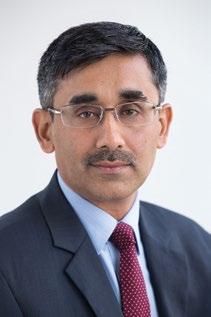
just metaphorical—they are literal. Tariff walls, visa restrictions, domestic content requirements, and digital firewalls are rising globally. Unlike the flat world of unimpeded commerce or the curved world of selective barriers, a walled world could lead to a claustrophobic economic environment, forcing businesses to rethink strategies that once thrived on open markets. This approach may protect local industries in the short term, but over time, it chokes innovation, reduces competition, and creates silos. Economic growth becomes more inwardlooking and less sustainable.
Business leaders must now operate in a hybrid world—part global, part local, and wholly uncertain. Companies accustomed to stable globalisation now face erratic trade policies, regulatory unpredictability, and geopolitical tensions that demand constant adaptation. We may be leaving the era of the flat world behind, but the journey forward isn’t yet settled. Whether the future is spiral—full of unpredictable twists—or walled—dominated by rigid barriers—business leaders must rethink the assumptions of globalisation. The goal isn’t to retreat from the world, but to re-engage with a smarter, more resilient strategy. Leaders must prepare for uncertainty, seek adaptability, and find ways to thrive in a global economy that is no longer linear—but constantly shifting. After all, it’s not the shape of the world that matters most—it’s how we move through it.
Dr. Manish Dhameja Strategic Leader and Senior Banking professional
AHEAD OF THE CURVE
Vipul Tuli, President & CEO, Renewables, West; CEO, Hydrogen Business; and Executive Director, UK, Sembcorp Industries is confident about contributing to Oman’s future energy needs across renewables and green hydrogen. Excerpts from an exclusive interview with OER on the company’s commitment to contribute to Oman’s Vision 2040
Can you please share an overview of Sembcorp’s operations in Oman and its contribution to the Sultanate’s utilities sector over the years?
Looking back, it has been a journey we are quite proud of. We started building the Salalah Independent Water and Power Plant in 2009, after securing the Power and Water Purchase Agreement with Oman Power and Water Procurement Company. It has been in full commercial operation since 2012, with a net capacity of 489 megawatts (contracted capacity of 445 megawatts) and a contracted water capacity of 15 million imperial gallons (69,000 cubic metres) per day. Today, it is one of the largest and most energy-efficient power and water plants in the Dhofar region.
Dhofar is relatively remote from the main Muscat capital area and this plant has really been a lifeline both in terms of water and power for the region. Today, the governorate has come up well, there is a growth in demand, and the grid is being extended to that area.
As Oman’s energy transition progressed, we have been on course with our support. In 2023, we decided to bring in our renewables expertise into this market. While this is a relatively new renewables market for us, we are confident of building on our expertise of 17.2 gigawatts of gross renewable energy capacity globally.
Gradually, with a lot of planning and preparation, we made a successful bid for Manah II, and here we are today.
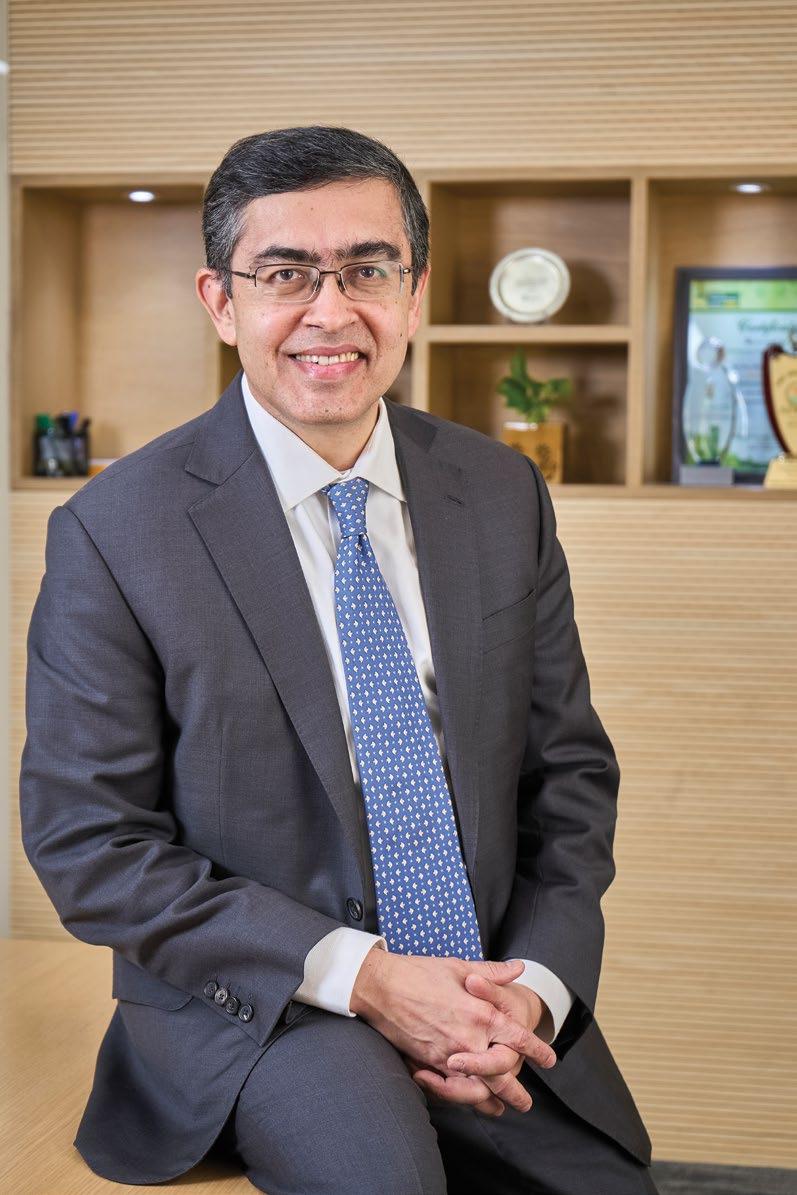
How does Sembcorp aim to position itself in this market?
One of Sembcorp’s differentiators is how we approach our projects. We are leveraging our deep capabilities in engineering, procurement and governance developed over the years in other markets, including India, to build our projects in the Middle East.
Apart from our well-run integrated power and water plants in Oman and Fujairah, we successfully completed the Manah project ahead of time and within cost. This gives us the confidence to build and deliver costcompetitive projects in the Middle East, particularly in the renewables and green hydrogen sectors.
We are a global energy company, with the intent to be the highest performing player consistently, because we perform well when our assets perform well.
We like to be able to pick the right
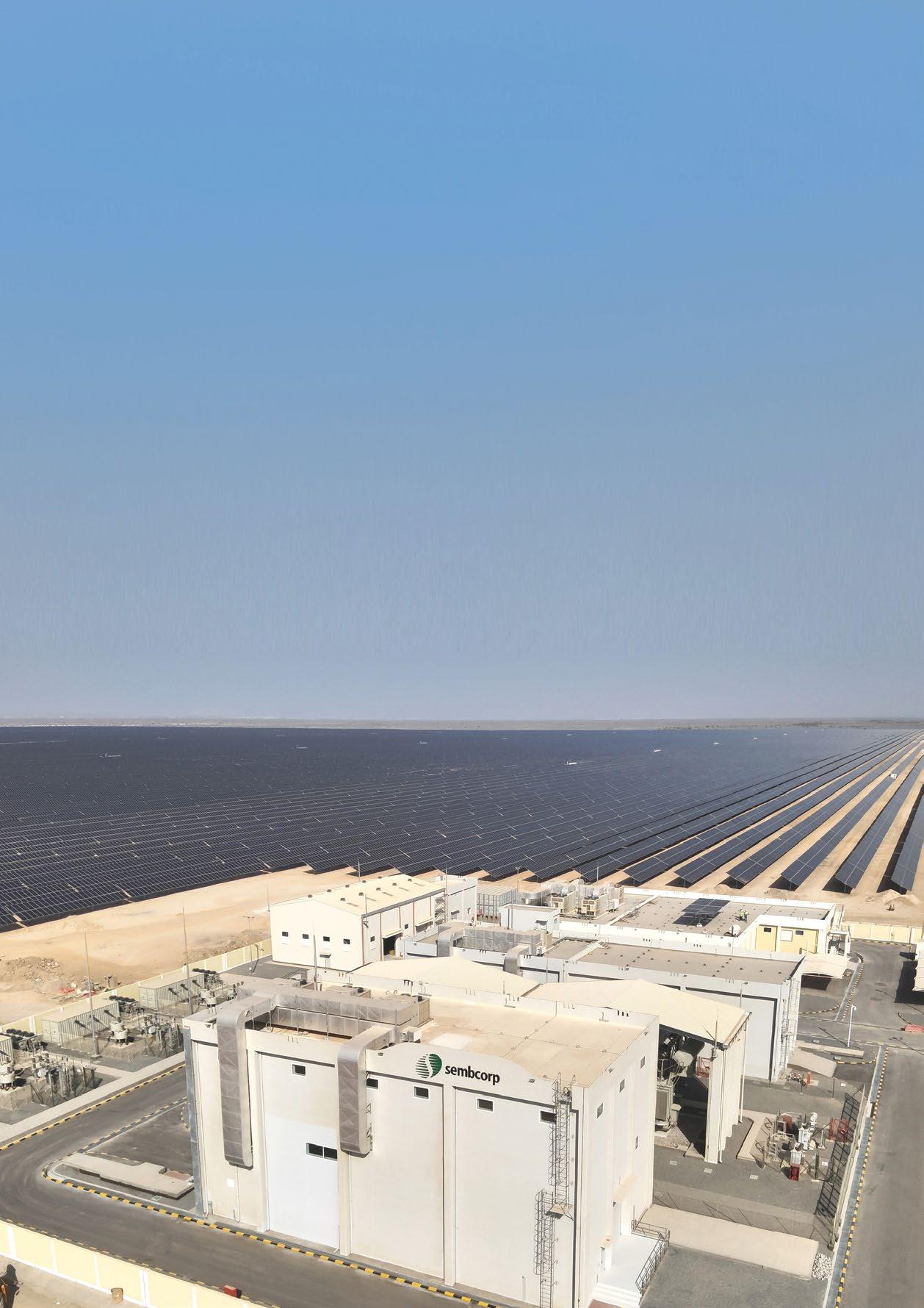
solutions in terms of technology to maintain our edge. If you see the Manah II project, we started contributing to the grid several months ahead of schedule, with full generation starting almost four months ahead of schedule.
Then, for the remaining life of a project, our focus is on maximising generation every operating year. What that means in terms of a solar plant is making sure that whenever there are any dips in generation, whether due to a faulty panel or connector, or dust accumulation, they are addressed as quickly and efficiently as possible.
We have a range of in-house digital solutions that help us stay ahead of the industry on some of these solutions. Over time, it has become a part of our capabilities, which we bring to a country to maximise the benefits.
With the achievement of SCOD for Manah II in Oman, can you please
share details of the project and ways in which it will help Oman’s net zero goals?
Manah II is an excellent project by any standard. It is 588 megawatts at its peak capacity. If you think about it and imagine its scale, the project spans an area of 6.8 million square metres, which is a sea of nearly seven square kilometres of solar panels.
All these solar panels are on trackers, so they follow the sun to get maximum generation. The two projects, Manah I and Manah II together generate more than a thousand megawatts. With these two new projects in Manah, Oman’s renewable energy makes up for nearly 6% of the country’s total electricity generation capacity—an accelerating shift from a low base.
The successful commissioning of Manah II, being Sembcorp’s first greenfield renewables project in the Middle East and the largest utilityscale solar farm project to date, has
strengthened the company’s track record in delivering large-scale renewables globally.
That said, Oman has a much higher target for renewables and there is a long list of projects under bidding. These projects require a lot of preparation such as finding the right site, carrying out the grid studies, inviting bids, selecting a winner, finding the finance and then building the project. If I am not mistaken, there are currently 10 to 15 projects in the pipeline that are at various stages of evaluation by the relevant institutions. Sembcorp is keen on participating in some of those.
Sustainability is a priority for Sembcorp. In what ways is the company furthering sustainability objectives in Asia and Oman? We operate across different asset classes in the area of sustainable energy. In our renewables business, we have a strong presence in utility scale, ground-mounted solar. We are also one of the leading players in wind with a focus on optimising the generation and efficiency of turbines, to deliver maximum returns for all our stakeholders.
The idea is making sure that every joule of energy that hits the turbine, is converted into the highest possible amount of usable energy. We developed Singapore’s first inland floating solar farm – the 60
megawatt-peak Tengah Floating Solar Farm, and we are currently expanding to a 150 megawatt-peak floating solar photovoltaic system on Kranji Reservoir. Sembcorp has a large number of rooftop installations. Additionally, we operate Southeast Asia’s largest battery energy storage system and one of the largest battery fleets in the UK. We are now building up a battery presence in China and India as well.
We also have our urban business, known as our Integrated Urban Solutions business, with a focus on developing sustainable and low-carbon industrial parks. We manage not just the infrastructure of these parks, but also other utilities and the renewable energy that forms part of its ecosystem. So, these are the various ways we are trying to participate in and contribute to the renewable energy sector.
Green Hydrogen and derivatives is a focus area for Oman. Is Sembcorp working in this direction?
Oman has some very formidable natural advantages, which could make it a major green hydrogen player. It is one of the few countries that has an incredible solar resource coupled with a very strong wind resource. An ability to combine these two allows one to run the hydrogen production facilities, including the electrolysers, at much higher utilisation capacity.
Even in the Middle East, there are
only two or three markets where such projects can be set up, and Oman is one of them. Green hydrogen generation will require large off-takers with long term demand, to make it viable.
Sembcorp is certainly looking at these projects through multiple pathways. For example, once green hydrogen is produced, it can be converted into ammonia.
In Singapore, we are also currently midway through the construction of the country’s first 600 megawatt hydrogen-ready combined cycle power plant.
In India, we are advancing green hydrogen and green ammonia initiatives by leveraging our wind and solar capabilities to develop competitive green hydrogen and ammonia projects. We have also entered a joint venture (JV) agreement with Bharat Petroleum Corporation Limited to explore renewable energy and green hydrogen projects across India. The JV will also consider projects in green ammonia production and bunkering, emissions reduction for port operations and other emerging green fuel technologies.
With our strong presence in supply and demand centres, we can support largescale, cost-effective green hydrogen production and offtake. So yes, we are well positioned to contribute to Oman’s efforts in the green hydrogen space.
We operate across different asset classes in the area of sustainable energy. In our renewables business, we have a strong presence in utility scale, ground-mounted solar. We are also one of the leading players in wind with a focus on optimising the generation and efficiency of turbines, to deliver maximum returns for all our stakeholders
DRIVING INNOVATION
The NBO’s Fintech Accelerator Programme reflects the bank’s long-standing commitment to drive innovation, support entrepreneurship and contribute to Oman Vision 2040, says Mustahil Ahmed Al Mamari, Assistant General Manager – Head of Strategy and Transformation, in an interview
What is the NBO Fintech Accelerator Programme and what inspired its launch?
The NBO Fintech Accelerator Programme is a first-of-its-kind initiative in Oman’s banking sector, designed to discover, mentor and scale innovative fintech startups that offer real solutions to challenges in banking and finance. The journey commenced with a Hackathon, continued through a rigorous accelerator phase, and culminated in a Demo Day. This structured pathway enabled startups to develop, refine and validate their products in a real banking environment. The Fintech Accelerator Programme reflects NBO’s long-standing commitment to drive innovation, support entrepreneurship and contribute meaningfully to Oman Vision 2040, which places innovation and knowledge-based industries at the heart of national development.

What makes Demo Day a pivotal moment?
The Demo Day served as the highlight of the Fintech Accelerator Programme,
from NBO leadership and industry experts, insights into regulatory frameworks, access to technical support and the unique opportunity to test their solutions in a live banking
setting. This practical exposure helped refine their business models and ensured their readiness for market integration. The support was not just advisory but immersive and actiondriven, laying the foundation for longterm success.
How does this align with NBO’s innovation strategy and Oman Vision 2040?
At its core, the programme reflects NBO’s focus on building sustainable, customer-centric innovation that has real impact. By nurturing fintech talent and enabling access to banking infrastructure, NBO is helping develop a robust ecosystem that encourages knowledge exchange and accelerates digital transformation. These efforts are closely aligned with Oman Vision 2040, which emphasises diversification through innovation and support for entrepreneurship. NBO is proud to contribute to the national agenda while driving growth in Oman’s financial services sector.
What are NBO’s future plans in this space?
The Accelerator Programme is merely the beginning. NBO plans to run additional cycles, expand its innovative initiatives and strengthen collaborations across multiple sectors. We aim to continue integrating emerging technologies such as artificial intelligence, blockchain and open banking, ensuring that the fintech ecosystem in Oman is both competitive and future ready. By deepening our role in this space, NBO hopes to serve as a platform for entrepreneurs and innovators to thrive, whilst delivering value to our customers and contributing to national development.
ACCELERATED GROWTH
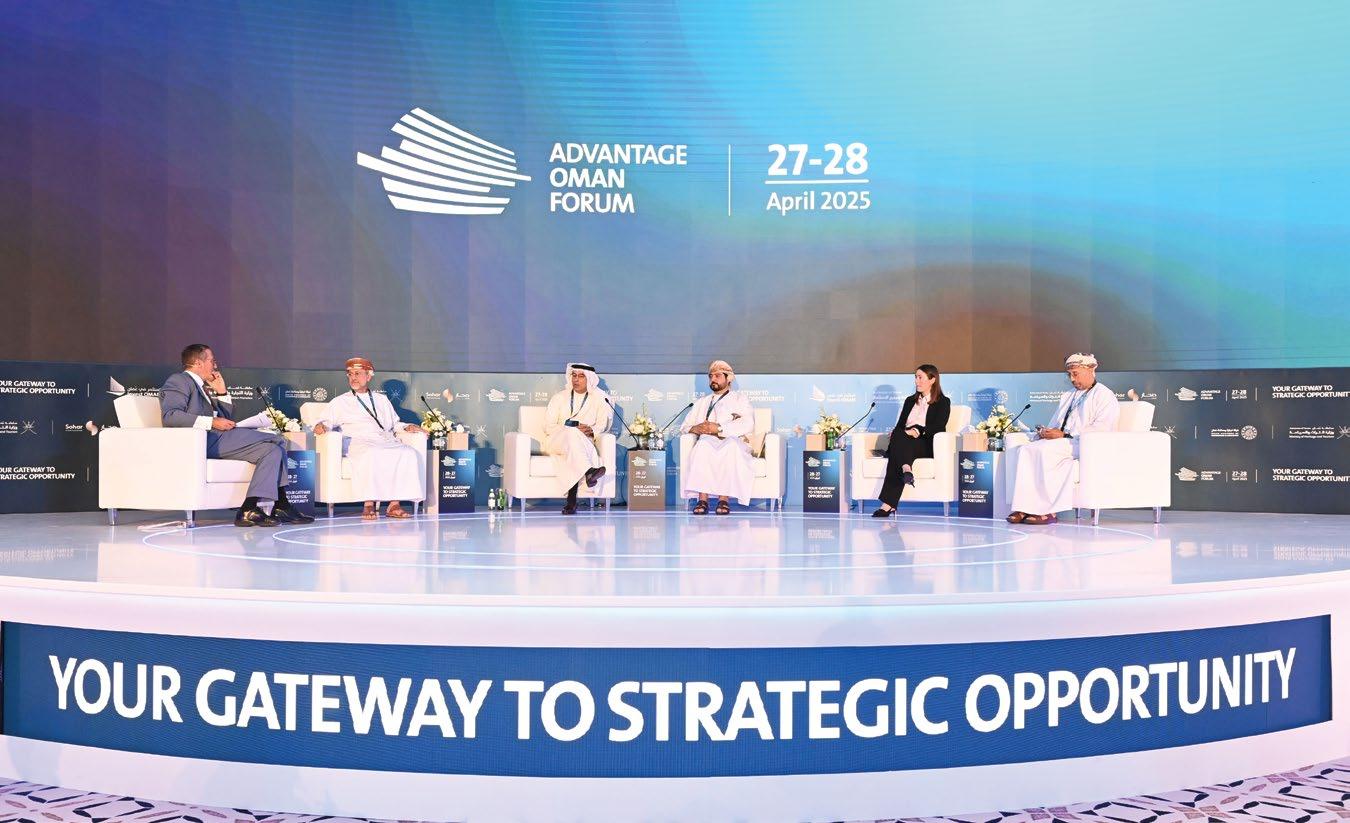
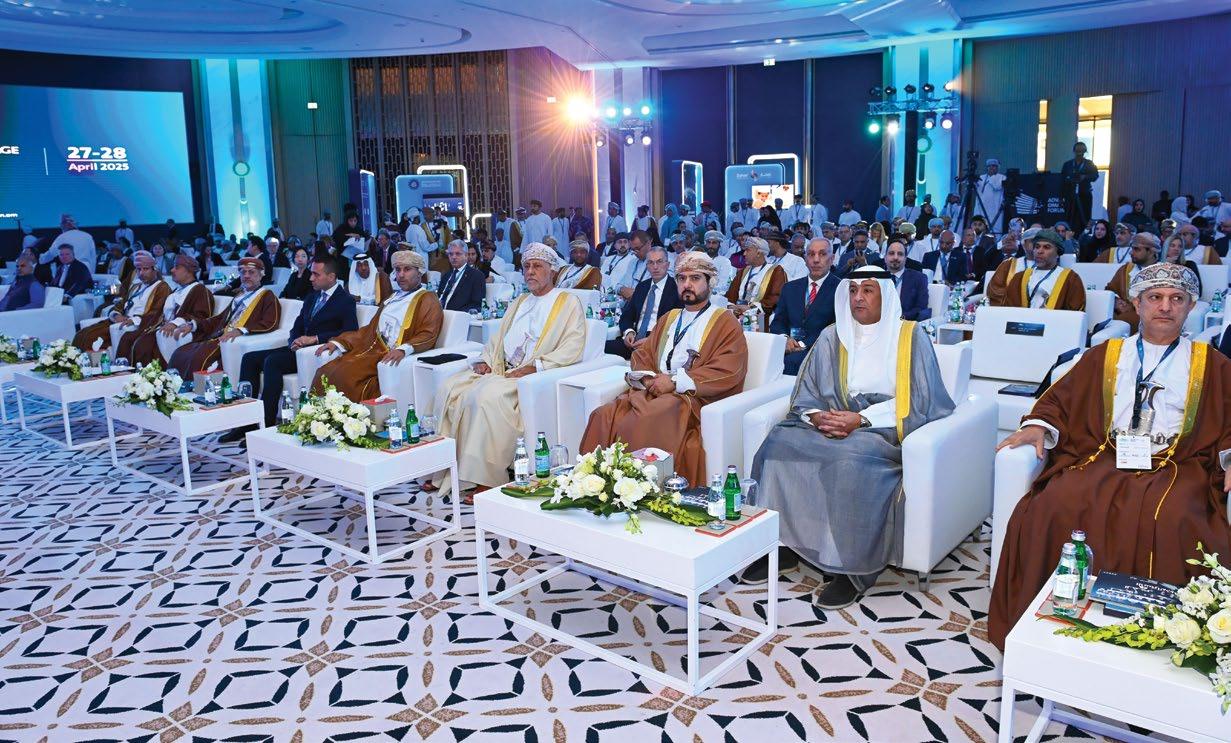
Hofficially inaugurated the inaugural international investment forum, Advantage Oman, organised by the Ministry of Commerce, Industry, and Investment Promotion. The prestigious two-day event, hosted at the St. Regis Al Mouj Resort in Muscat recently, convened over 250 senior officials, decision-makers, and regional and international investors, underscoring Oman’s emergence as a premier global investment destination.
In his keynote address, HE Qais bin Mohammed Al Yousef, Minister of Commerce, Industry, and Investment Promotion, highlighted the forum’s significance as a first-of-its-kind strategic platform designed to attract top-tier decision-makers, business leaders, and investors across pivotal sectors. He noted that the event comes at a time of accelerated growth in Oman’s economic and investment spheres, bolstered by positive international indicators. Al Yousef shared that foreign direct
growing investor confidence.
Furthermore, Oman’s credit rating was upgraded to BBB- with a stable outlook by Standard & Poor’s, and the national GDP is projected to grow by 3.4 per cent in 2025 – outperforming several global economies and reinforcing the resilience of Oman’s economy.
The event also featured renowned speaker and Editor-at-Large Richard Quest, who had dialogue with H.E. Abdulsalam Al Murshidi, President of the Oman Investment Authority; and H.E. Qais Al Yousef, offering global and regional perspectives on investment and the Sultanate of Oman’s role in shaping future opportunities. The forum’s first day featured five high-impact sessions exploring global economic megatrends and sectoral opportunities: Session One examined transformative global shifts and the influence of technologies such as artificial intelligence, climate tech, and hyperconnectivity, emphasising innovation and sustainability as pillars
critical role of calculated risk-taking in organisational success, focusing on fostering risk culture and psychological safety. Session Three, Business Decisions – Environmental Challenges and Corporate Responsibility, addressed the urgent need for corporate accountability in tackling climate change and biodiversity loss, advocating for solutions like circular economy practices and green technologies.
Session Four, Creative Leadership in a Rapidly Changing World, showcased how dynamic leadership and creative reinvention are essential for navigating today’s complex business environment.
Session Five, The Power of Storytelling in Building Brand Trust and Loyalty, explored how businesses can effectively translate data and values into narratives that deeply connect with their audiences. HH Sayyid Shihab bin Tarik Al Said also toured the forum’s exhibition, which featured a wide array of participants from both government entities and private sector institutions. Day 1 also

Advantage Oman Forum, organised by the Ministry of Commerce, Industry, and Investment Promotion and led by its investment promotion arm Invest Oman, shifted focus towards deeper engagement with strategic sectors and decision-makers. The day’s agenda emphasised moving from dialogue to action, featuring high-level panel discussions, investor networking sessions, specialised roundtables, and the signing of landmark agreements.
Her Excellency Ibtisam Al-Farooji, Undersecretary for Investment Promotion, addressed investors and delegates, reaffirming Oman’s commitment to facilitating private sector growth through transparent and streamlined engagement. She stated, “We open the doors to Oman’s most strategic and future-focused sectors, and you will meet the senior government officials directly shaping their development. From renewable energy and green hydrogen to advanced manufacturing, logistics, digital technologies, sustainable tourism, and fisheries—you will discover where Oman’s priorities meet global demand. Through the efforts of Invest Oman and our network of partners, we have streamlined procedures, cut red tape, and introduced targeted incentives designed to move from interest to
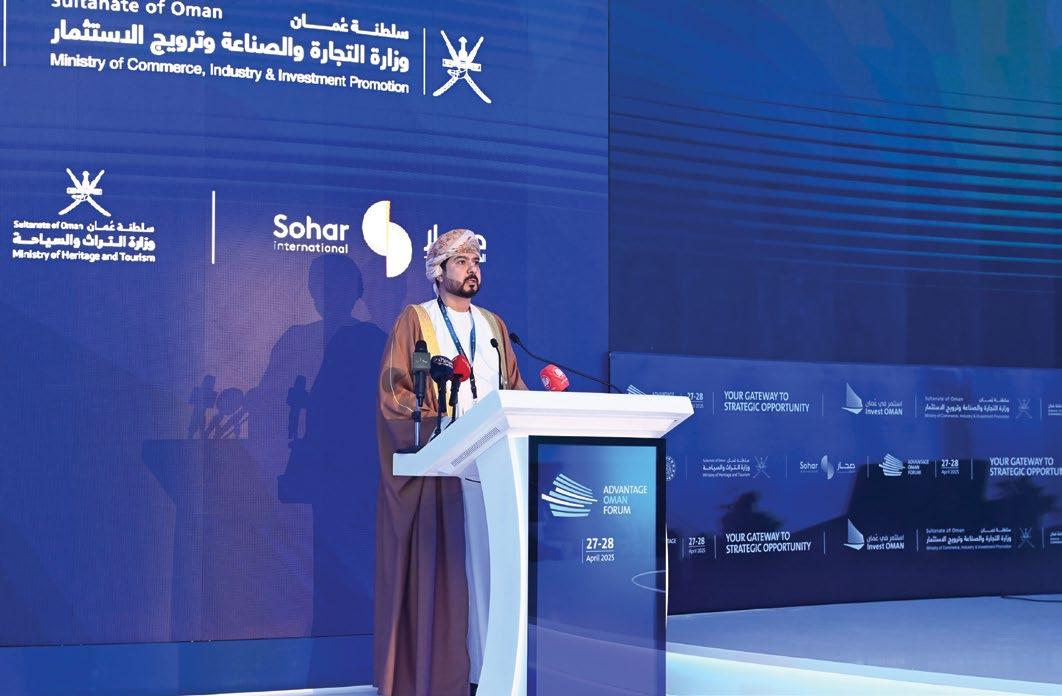
geographic positioning, and integrated planning under how these strengths are opening new avenues in clean energy, advanced manufacturing, logistics corridors, digital innovation, sustainable tourism, and fisheries. One of the defining highlights of Day Two was the announcement of a landmark $565mn clean energy manufacturing agreement. Facilitated by Invest Oman, the deal was finalised between JA Solar Energy – one of the world’s top four manufacturers of high-performance solar cells and modules – and key Omani entities including SOHAR Port and Freezone and Majis Industrial Services S.A.O.C.
The agreement marks a major milestone for Oman’s renewable energy ambitions. Covering 32.8 hectares within the second phase of the SOHAR Freezone, the project is slated to achieve an annual production capacity of 6 gigawatts of solar cells and 3 gigawatts of solar modules. Target markets include Europe, the United States, and domestic consumers, with operations expected to commence in 2025. This investment aligns squarely with the sustainability and diversification goals laid out in Oman Vision 2040, and it showcases the success of Oman’s strategic investment facilitation model, which included coordinated efforts
Oman Electricity Transmission Company (OETC), NAMA Supply, and Majis Industrial Services.
The second day’s activities demonstrated Oman’s proactive commitment to fostering strategic sector growth, accelerating real investment outcomes, and building durable international partnerships. As the Advantage Oman Forum drew to a close, many international CEOs and investors embarked on curated tours across Oman to experience the country’s investment-ready infrastructure, rich cultural heritage, and the practical advantages that position Oman as a distinctive hub for long-term growth and global engagement. With strong foundations laid and tangible agreements secured, the Advantage Oman Forum has undoubtedly set the stage for a new era of investmentdriven economic expansion in the Sultanate.
PURSUING EXCELLENCE
Oman Economic Review’s 26th annual review of Oman’s top 20 leading listed companies for the year 2024, shows how these entities are consolidating their position while pursuing new opportunities for growth and expansion
Introduction
The global economy in 2024 was characterised by a complex interplay of recovery, uncertainty, and transformation. Countries were navigating the aftershocks of the COVID-19 pandemic, geopolitical tensions, and the accelerating transition to sustainable and digital economies. Amidst these dynamics, governments and businesses strived to adapt to shifting economic landscapes.
The global economy
The pace of global economic growth in 2024 remained modest, heavily influenced by divergent regional recovery patterns. Advanced economies, including the United States and parts of Europe, experienced slower growth rates due to inflationary pressures and tight monetary policies. Emerging markets, particularly in Asia, continued to lead global growth, driven by robust manufacturing and digital innovation sectors.
Although global GDP growth hovered around 3 per cent, uncertainties such as fluctuating energy prices, supply chain disruptions, and inconsistent trade policies contributed to cautious optimism among economists. According to the data from the

International Monetary Fund (IMF) and the World Bank, the global economy grew by about three per cent in 2024, reflecting a gradual recovery from the challenges faced by global markets in previous years. However, significant disparities remained between developed and developing economies, with the former recording a growth rate of under two per cent, while emerging economies achieved a growth rate of about four per cent.
Inflation remained a critical issue for policymakers worldwide. Central banks, including the Federal Reserve and the European Central Bank, adopted restrictive monetary policies to curb inflation, leading to higher interest rates. These measures impacted consumer spending and investment, creating ripple effects across various industries.
Geopolitical shifts continued to shape economic developments in 2024. The ongoing war in Ukraine impacted energy markets and global trade, while tensions between major powers like the United States and China influenced supply chains and technology sectors. These challenges emphasised the need for diversification in trade and investment strategies.
The oil market
The year 2024 has proven to be pivotal for the global oil market amidst economic fluctuations, geopolitical tensions, and advancements in energy technology. Global oil demand witnessed steady growth in 2024 due to economic recovery post-pandemic and increased industrial activity. The year began with relative stability in oil prices as major economies demonstrated signs of resilience. Brent crude averaged around $80 per barrel in January. By mid-2024, oil prices experienced sharp volatility. Prices peaked briefly at $95 per barrel in June. As 2024 wound down, oil prices settled into a narrower range, averaging $85 per barrel in December.
The average price of Oman crude oil remained unchanged at US$82 per barrel by the end of December 2024 compared to the same period in 2023.
This was higher than the assumed budgeted price of $60 per barrel. According to Deloitte report on Oman’s 2025 Budget and performance in 2024, actual revenues for 2025 is estimated at RO11.2bn as compared to the budgeted RO12.2bn for 2024. This is mainly on account of a projected decrease in oil production. Oman’s average daily production of oil during 2024 amounted to 1.031mn barrels per day.
Stock markets performance in 2024
The year 2024 proved to be a remarkable and dynamic period for global stock markets. Amid economic uncertainties, geopolitical tensions, and technological advancements, equity markets worldwide displayed both resilience and volatility.
In the United States, the S&P 500 and NASDAQ Composite showed commendable recovery from early-

year jitters. The NASDAQ buoyed by surging tech stocks, outperformed most indices, gaining nearly 20 per cent by the year-end. Dow was up 13 per cent. The STOXX Europe 600 closed the year with modest gains of around 0.8 per cent, driven by strong performances in the luxury goods sector, particularly from French and Italian companies. Asian markets displayed mixed outcomes. In China, the Shanghai Composite struggled in the face of slowing
economic growth and property sector uncertainties, closing the year with flat performance. Japan’s Nikkei 225 surged to a multi-decade high, appreciating by over 15 per cent, driven by strong corporate earnings and innovations within the automotive and automation industries. India’s Nifty 50 also showed promising gains as foreign investments flowed into sectors like IT and infrastructure.
In early 2025, President Donald Trump’s first 100 days in office have been marked, in short, by volatility. Both uncertainty about his everchanging tariff policies and fear that they could bring a recession have taken a toll on the markets around the world. Trump’s first 100 days are the worst for the stock market since Nixon.
Oman MSX performance
As reported by MSX CEO, Haitham al Salmi in the MSX annual report, MSX launched several local and international initiatives to support the financial market, including the announcement of the Capital Market Incentive Program, in line with their strategic plan to enhance market transparency and investment attractiveness. He added that this year, MSX witnessed new listings that reflect the diversity and growth of the market. Among the most notable listings was the IPO of OQ Exploration and Production, which raised over RO1.8bn following the offering of two billion shares valued at more than RO770mn, making it the largest IPO in MSX’s history. Additionally, OQ Base Industries was listed, raising RO387mn after offering 1.7 billion shares valued at over RO180mn.
Regarding market performance during the year, MSX delivered a strong performance supported by these new listings. The total market capitalisation of the Exchange increased by 16 per cent to reach RO27.6bn, achieving gains exceeding RO3.9bn. This contributed to an 11 per cent increase in total trading value for the year, while the total number of traded securities rose by 45 per cent. The main index of the Exchange MSX 30 recorded a 1.4 per cent increase compared to the previous year, closing at 4,576.6 points.
The MSX TR Index performance was 7.7 per cent by in 2024, the financial total return (TR) index recorded an increase of 8.8 per cent, services TR index 19.8 per cent, industrial TR index 4.0 per cent, the fixed income index 7.7 per cent. Omani investors represented 87 per cent of the total
market turnover, and the value of shares purchased by them reached RO1,096mn.
GCC equity markets once again witnessed one of the smallest equity market gains globally during 2024. The aggregate MSCI GCC index reported a gain of 0.7 per cent during the year following mixed performance at the country level.
Dubai was the best performing stock market in 2024 showing a gain of 27 per cent followed by Kuwait in the second position with a return of 24 per cent, Oman third position with a return of 1.4 per cent. Bahrain followed in fourth place with a return of 0.7 per cent, Saudi Arabia was fourth with a return of 0.6 per cent, Abu Dhabi was fifth with a negative return of -1.7 per cent, and Qatar was last at -2.4 per cent.
Performance of Oman ’ s top companies
During the year ended December 2024, the revenues of Oman’s 20 largest companies showed an increase of RO293mn compared to the year ended December 2023. Total revenues for the OER Top 20 companies increased by three per cent to RO10,496mn. Corporate performance for the year 2024, overall, reduced due to some large losses incurred by some companies. The profits for the year 2024 reduced by 17 per cent to RO1,342mn from RO1,615mn last year. The total market cap of the OER Top 20 companies on December 2024 was
RO10,019mn, which increased by about 45 per cent compared to 2023 due to the few large IPO in 2024. On March 31, 2025, the market cap of the Top 20 reduced to RO9,510mn. The OER Top 20 companies represent 36 per cent of the total market cap of the MSM of RO27.6 billion at the end of December 2024. The average P/E ratio of the OER Top 20 companies based on the market cap as on March 31, 2025 against the total profit for 2024 is 7 times.
Who is out and who is in ?
There are two newcomers in the OER Top 20 this year. This includes OQ Exploration and Production at the number three position, OQ Base Industries at 16, both new IPOs in 2024. Al Jazeera Steel and Oman Flour Mills have gone out of this list. One company has improved its rankings, five remain unchanged, and 12 companies’ rankings have gone down compared to last year.
The ranking of Oman’s 20 largest companies in order of revenue produces a list, which includes eight companies from the financial sector, eight from the services sector, and four companies from the industrial sector, same as last year. The following rankings are compared to the last year’s published OER Top 20 of December 2023 which was based on the financials for the year ended December 31, 2023 and adjusted for the new entrants to the list.
Omantel has maintained its position as the number one company in Oman
in terms of turnover. Omantel has shown a growth in revenue of 2.97 per cent for the year ended December 2024 compared to December 2023. The Group revenue of RO3,030mn includes RO2,467mn from the Zain Group. Bank Muscat retained its No. 2 position. OQEP a newcomer to the list has joined OER 2024 straight at No.3 at the expense of Shell Oman Marketing. Oman Oil Marketing has slipped down to four from three last year. Al Maha at five is unchanged. All the top five companies’ revenue has increased in 2024 compared to last year.
In the latest annual report addressed to shareholders, Mulham Al Jarf, the Chairman of Omantel, offered a comprehensive overview of the company’s financial and operational performance for the year ending December 31, 2024. As the leading telecommunications provider in Oman, Omantel continues to set benchmarks in the sector, reflected in its significant turnover and operations that underpin the Sultanate’s digital transformation.
Chairman Al Jarf highlighted that Omantel’s financial performance in 2024 demonstrated remarkable resilience and growth despite the prevailing market challenges. The company’s total revenue surged to RO3,030.1mn, marking a 3.0 per cent increase from RO2,942.7mn in 2023. This growth was attributed to a comprehensive expansion across various operational segments, including mobile, fixed broadband, and corporate services. Notably, the Chairman pointed out that the increase in revenues was supported by positive contributions from all operational areas, with Oman leading the charge with a 2.7 per cent yearon-year revenue increase. The report underscored that the significant growth was particularly prominent in markets such as Iraq, Jordan, Bahrain, and Kuwait, where revenue growth rates ranged from four per cent to 11 per cent.
However, the net profit after tax for 2024 saw a slight decline of 2.8 per
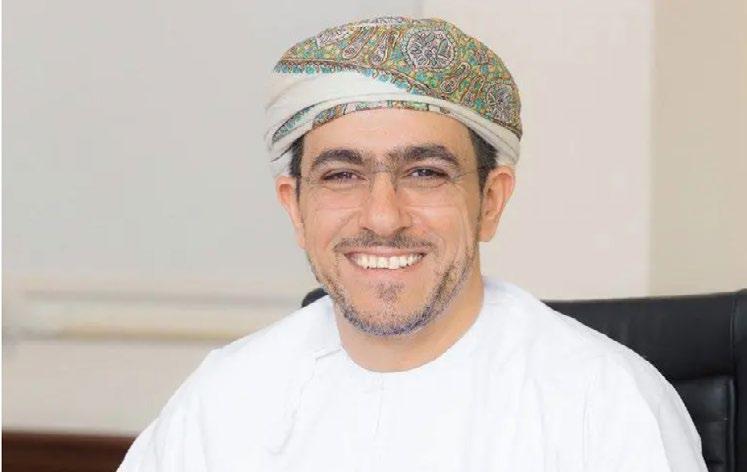
Mulham Al Jarf Chairman, Omantel
cent, totaling RO306.8mn, down from RO315.5mn in the previous year. Al Jarf attributed this decrease primarily to the adverse financial performance in Sudan and a one-time capital gain from a previous tower sale in Saudi Arabia that had positively impacted the prior year’s figures. Despite this decline, the net profit attributable to shareholders increased by 4.4 per cent to RO78.1mn, compared with RO74.8mn in 2023. This result was indicative of the company’s ability to navigate challenges while delivering value to shareholders.
In terms of dividends, Chairman Al Jarf announced that the Board of Directors recommended a final dividend of 55 baiza per share for the year 2024, a consistent payout compared to the prior year’s dividend. This decision highlights the Board’s commitment to maintaining a stable return to shareholders while investing in future growth initiatives.
Key milestones achieved during the year were also emphasised by Chairman Al Jarf. He noted the successful launch of several digital initiatives aimed at enhancing customer experience, such as improved mobile applications and the introduction of advanced
broadband packages. The Chairman mentioned that Omantel’s continuous investment in technology is essential for strengthening its competitive positioning within the telecommunications landscape. Additionally, Al Jarf expressed pride in the company’s corporate social responsibility (CSR) efforts, where Omantel launched multiple initiatives focused on digital inclusivity and healthcare technology, demonstrating its commitment to enhancing community welfare.
Furthermore, the Chairman highlighted that Omantel is strategically aligned with Oman Vision 2040, emphasising the importance of driving digital transformation initiatives that cater to the evolving needs of both consumers and businesses. He reiterated the company’s commitment to becoming a vital player in supporting the government’s objectives of fostering a knowledge-based economy.
In conclusion, Chairman Mulham Al Jarf’s report presented a picture of a resilient and forward-thinking Omantel, poised for continuous growth in the ever-evolving telecommunications sector. With robust earnings, a consistent dividend policy, and a
clear commitment to innovation and community welfare, Omantel is well positioned to maintain its leadership in the Omani market and beyond. Shareholders remain optimistic about the company’s ongoing efforts to enhance service offerings and explore new growth avenues in the coming years.
THE TOP FIVE BY PROFIT
Three banks and two services sector companies are the five most profitable companies of 2024. OQEP, a newcomer has jumped straight to the number one position. Omantel and Bank Muscat, Sohar International and NBO have slipped one place down. OQ Gas has moved out of this list.
In the annual report for the financial year ending December 31, 2024, Chairman Ashraf Al Mamari of OQ Exploration and Production SAOG (OQEP) emphasised the significant transformation and growth the company achieved during the year. Central to this report was the successful completion of the Initial Public Offering (IPO), which saw 25 per cent of the company’s share capital listed on the Muscat Stock Exchange (MSX) on December 15, 2024. This milestone marked a pivotal moment in OQEP’s journey and is expected to enhance its visibility and investor engagement.
Chairman Al Mamari expressed pride in OQEP’s unwavering dedication to health, safety, security, and environmental performance. He reported robust advancements in the company’s HSSE initiatives, which reflect a strong safety culture aligned with annual objectives. Both the
methanol and LPG plants received relevant certifications, showcasing OQEP’s commitment to maintaining high operational standards while pursuing environmental sustainability. The Chairman noted that the implementation of their “12 lifesaving rules” and extensive training programs has contributed significantly to their
total to 27 rigs. Chairman Al Mamari applauded the company’s ability to maintain operational efficiency, achieving utilisation rates of 86 per cent for drilling rigs and 100 per cent for workover rigs. He detailed progress in Block 60, where effective production strategies allowed for a stable output despite facing challenges.
In addition to operational successes, the Chairman underscored OQEP’s strategic focus on sustainability and innovation. Key initiatives include investments in renewable energy projects and advanced technologies to improve operational efficiency and meet future energy demands. The company’s commitment to corporate social responsibility was also highlighted, with ongoing efforts to support local communities and promote environmental stewardship.
safety achievements.
Regarding financial performance, the Chairman reported that OQEP’s total revenue for 2024 was RO841.3mn, representing a decline from RO1,063.3mn in the previous year. The net profit after tax stood at RO326.6mn, which was also a decline compared to RO627mn in 2023. Al Mamari attributed this decrease to the divestment of 40 per cent of Block 60 in 2023, which had significantly impacted last year’s figures. He emphasised that excluding the divestment impact, the underlying operating performance was stable, demonstrating the company’s resilience in navigating market complexities.
The Board of Directors announced a recommended cash dividend of 7.21 baizas per share, totaling RO57.68mn. The company had already paid a cash dividend of baizas 2.16 per share in 2024. This decision illustrates the Board’s commitment to returning value to shareholders despite the challenging economic environment.
In terms of operations, the report highlighted the successful commencement of key projects, notably in Kuwait, which added two drilling rigs to OQEP’s fleet, bringing the
In closing, Chairman Ashraf Al Mamari expressed gratitude to all stakeholders, including employees, government entities, and partners, for their vital roles in OQEP’s achievements. He reaffirmed the company’s commitment to aligning its growth strategies with Oman’s Vision 2040, positioning OQEP as a leading player in the energy sector.
This report serves as a testament to OQEP’s resilience, adaptability, and dedication to excellence in the pursuit of sustained growth and success in the challenging and evolving energy landscape.
Three companies are newcomers to this list with a growth in profits compared to last year. Oman Arab Bank, a newcomer, comes in straight at the number one position. Sohar International retains its number two slot from last year. Oman Oil Marketing is another newcomer at number three. Oman Cables slips one to the number four position. Ahlibank is the third newcomer added to this list in number five position. Liva Group and Al Jazeera Steel appearing in this list last year have exited.
In his annual report addressed to shareholders, Chairman Rashad Al
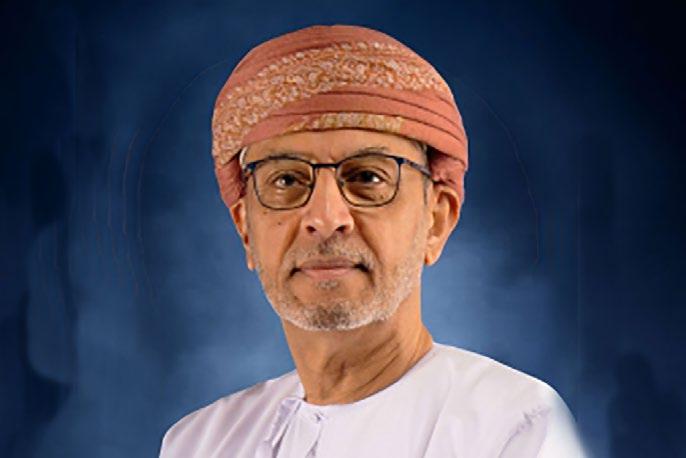
Rashad Al Zubair Chairman, Oman Arab Bank
Zubair of Oman Arab Bank (OAB) articulated the bank’s exceptional performance for the financial year ending December 31, 2024, highlighting its status as the company with the highest growth in profit in Oman. The bank recorded a consolidated net profit after tax of RO30.4mn, representing a staggering increase of 48 per cent from RO20.6mn in 2023. This impressive growth underscores OAB’s strategic initiatives and resilience in navigating the complexities of the banking sector.
Chairman Al Zubair attributed this notable rise in profitability primarily to a robust increase in net interest income from conventional banking and net income from Islamic services, which
reached RO99.5mn, up three per cent from the previous year. The increase in interest income was primarily driven by the expansion of the bank’s lending portfolio and improved margins, emphasising effective financial management amid a favorable interest rate environment. Overall operating revenue increased by five per cent to RO126.5mn, underpinned by strong performances across various segments including corporate and retail banking.
The report also outlined significant operational advancements made throughout the year. Chairman Al Zubair noted that OAB successfully launched several innovative digital banking solutions, including a new
mobile banking application that has enhanced user experience and engagement. These technological advancements were essential for meeting the evolving needs of customers and maintaining a competitive edge in the market.
In addition to technological initiatives, the Chairman highlighted OAB’s commitment to corporate social responsibility (CSR). The bank implemented several communityfocused programs aimed at fostering economic development and promoting financial literacy among local youth. These initiatives aligned with Oman Vision 2040, emphasising the bank’s role in contributing to national objectives.
Al Zubair discussed the importance of employee development as a key component of OAB’s strategy. He reported that the bank invested in extensive training programs and leadership initiatives, fostering a culture of growth and inclusivity. By equipping employees with the necessary skills and knowledge, OAB aims to enhance its overall service delivery and operational efficiency.
In summary, Chairman Rashad Al Zubair’s report illuminated a year of exceptional performance and significant achievements for Oman Arab Bank. With impressive growth in profits, the declaration of a generous dividend, and a strong focus on innovation, CSR, and employee development, OAB is firmly positioned to continue its upward trajectory in the coming years. The Chairman expressed appreciation for the support from shareholders, customers, and employees, emphasising that their collective efforts will drive the bank’s long-term success and contribute positively to the Omani economy.
Two of the top five companies that have the highest amount of equity employed are banks. Four companies are the same as last year. Bank Muscat remains in the number one position, OQEP is the newcomer in slot number two. Sohar International has moved down one
place to number three, Omantel has maintained its position at number four. OQ Gas has moved down to number five from three last year. BankDhofar has moved out of this list.
In his annual report to shareholders, Chairman Khalid bin Mustahail Al Mashani of Bank Muscat, the highest capitalised company in Oman for 2024, highlighted the bank’s robust financial performance and strategic initiatives that reinforced its leading
after tax of RO225.58mn for the year ending December 31, 2024, which represents a 6.2 per cent increase from RO212.45mn recorded in 2023. This profit increase was primarily driven by a rise in net interest income from conventional banking and net income from Islamic financing services, which totaled RO397.70mn. This figure reflects an increase of 6.1 per cent from the previous year, attributed to an expansion in the bank’s lending portfolio and improved margins
addressing shareholder returns, Chairman Al Mashani announced that the Board of Directors recommended a cash dividend of 16.5 per cent, translating to RO0.0165 per ordinary share. This proposed dividend totals approximately RO123.86mn and underscores the bank’s capability to provide consistent returns to shareholders while ensuring sufficient capital for future growth initiatives.
In addition to financial achievements, the Chairman emphasised key highlights from the year that showcased the bank’s commitment to innovation and digital transformation. Bank Muscat continued to enhance its digital banking offerings, significantly increasing user engagement through the launch of a user-friendly mobile banking application. This endeavour has been integral in facilitating improved customer experience and operational efficiency.
status in the financial sector. The report detailed a successful year characterised by significant growth in profit and a commitment to innovation and customer-centric services.
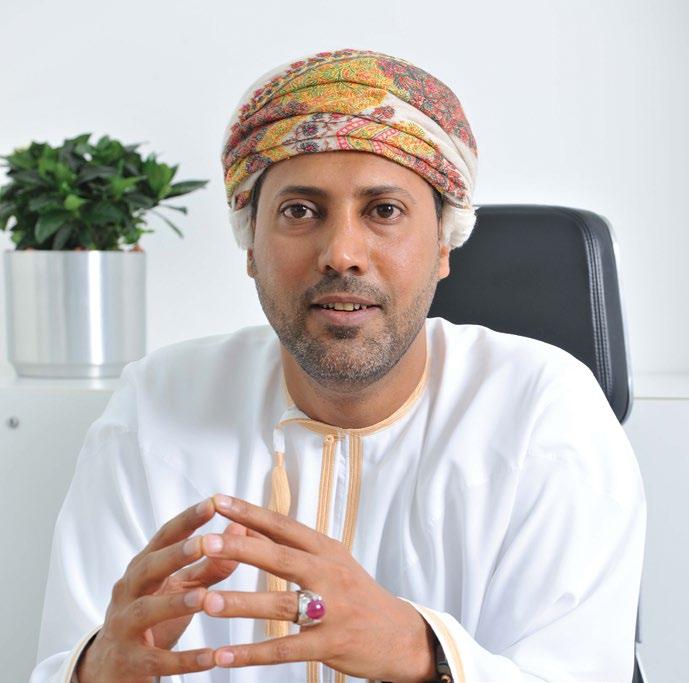
Chairman Al Mashani announced that Bank Muscat achieved a net profit
from RO196.39mn the previous year, highlighting the bank’s efficiencies in cost management. Furthermore,
Moreover, Al Mashani highlighted the bank’s proactive approach to corporate social responsibility (CSR) initiatives. In 2024, Bank Muscat launched various programs aimed at fostering economic development and supporting community welfare, which included educational initiatives and health campaigns. The Chairman underscored the bank’s commitment to making a positive impact on society, aligning with Oman Vision 2040’s broader goals.
During the year, Bank Muscat also made noteworthy progress in expanding its branch network, ensuring that customers have convenient access to its comprehensive range of banking solutions. The opening of new branches aimed to cater to the increasing demand for banking services in key regions across the Sultanate.
In conclusion, Chairman Khalid bin Mustahail Al Mashani’s report encapsulated a year of remarkable achievements for Bank Muscat, marked by impressive profit growth, a strong commitment to innovation, and an unwavering focus on community engagement. As the bank moves forward, it remains poised to navigate the dynamic economic landscape of
Khalid bin Mustahail Al Mashani Chairman, Bank Muscat
Oman, enhancing its services and contributing positively to the nation’s economic development. The Chairman expressed gratitude to shareholders, customers, and employees for their continued support and confidence in Bank Muscat’s vision for the future.
Two banks and three from the services sector comprise this list of the top five companies that have the highest market capitalization on the MSX. OQ Exploration and Production SAOG gains top ranking in this category, Bank Muscat slip down to number two from number one last year. Sohar International has moved up to number three from being five last year. Omantel has moved down two places to number four. OQ Gas is down to number five from four. NBO has exited from the list in place of OQ Exploration.
In his annual report to shareholders, Chairman Said Mohamed Al Aufi of Sohar International, the second-largest company by market capitalisation in Oman for 2024, outlined the bank’s robust financial performance and strategic initiatives undertaken during the year. The report highlighted the bank’s continued commitment to innovation and customer service as a foundation for its growth. Chairman Al Aufi announced that Sohar International recorded a net profit of RO100.2mn for the financial year ending December 31, 2024, which marks a 42 per cent increase from 2023. This significant growth in profit reflects the bank’s successful strategies in enhancing its asset base and optimising operational efficiency. Al Aufi emphasised that effective risk management practices and prudent financial discipline were pivotal in achieving this noteworthy performance.
The bank’s net operating income before impairment provisions reached RO146.5mn for the year, representing an increase of 69 per cent compared to the previous financial year. Total assets increased by 10 per cent to RO7,361mn mainly driven by a nine per cent increase in loans and Islamic financings and a 24 per cent increase in investment securities.
Throughout the year, Sohar International undertook several initiatives aimed at enhancing its digital banking capabilities. Chairman Al Aufi reported the successful launch of a new mobile banking application that provides an improved user experience and facilitates a wide range of banking services. This digital transformation effort is part of the bank’s broader strategy to meet evolving customer needs and preferences in an increasingly competitive market.
THE TOP FIVE BY RETURN ON EQUITY
progress for Sohar International. With a substantial increase in profitability and a clear focus on digital transformation and community engagement, the bank remains well positioned for continued success in the dynamic Omani banking landscape. Al Aufi expressed gratitude to the bank’s employees, customers, and shareholders for their unwavering support and confidence, emphasising that together, they can navigate the challenges and opportunities that lie ahead.
Furthermore, Al Aufi emphasised the importance of corporate social responsibility (CSR) initiatives undertaken by Sohar International during 2024. The bank engaged in numerous projects that aimed to support local communities and promote sustainable development. Notable CSR efforts included financial literacy programs targeting young Omanis and initiatives to support local small and medium enterprises (SMEs). These programs reinforce Sohar International’s commitment to fostering economic growth in the Sultanate and contributing positively to societal well-being.
Additionally, the Chairman noted the successful establishment of strategic partnerships with various local and international organisations, aiming to bolster the bank’s service offerings and expand its geographical footprint. Such collaborations are expected to enhance Sohar International’s market presence and contribute to its long-term growth objectives.
In conclusion, Chairman Said Mohamed Al Aufi’s report to shareholders encapsulated a year of significant
Of the top five companies with the best returns on equity for the year, two are from the services sector and three from the industrial sector. Omantel maintains its first position as last year. OQEP and OQBI are the newcomers on this list at number two and five respectively. Al Maha Petroleum has stepped down one to position four from its position at three last year. Bank Muscat and NBO which were number four and five last year have exited.
In the annual report presented to shareholders, Dr. Salim Saif Al Harthy, Chairman of Al Maha Petroleum Products Marketing Company, highlighted the company’s impressive achievements for the fiscal year ending December 31, 2024. Recognised as the third-largest company by return on equity in Oman, Al Maha Petroleum demonstrated resilience and strategic growth amidst a challenging economic landscape.
Chairman Al Harthy reported that Al Maha Petroleum achieved a net profit of RO6.04mn for 2024, representing a 4.3 per cent decrease compared to RO6.31mn recorded in the previous
year. This decrease was primarily driven by a lower profit margin in the aviation segment due to the decline in global oil prices. The sales revenue, which reached RO514.4mn, up from RO493.8mn in 2023. The 4.2 per cent rise in sales was largely attributed to a six per cent increase in sales volume, reflecting enhanced market demand and the effectiveness of the company’s sales strategies.
In line with maintaining shareholder value, Dr. Al Harthy announced that the Board of Directors recommended a cash dividend of 85 baizas per share. This proposed distribution, underscores the company’s commitment to rewarding its investors while ensuring adequate resources for ongoing growth initiatives. Chairman Al Harthy shared major operational highlights for the year, emphasising the company’s strategic focus on enhancing customer service and operational efficiency. The retail segment continued to be the backbone of Al Maha’s operations, achieving a significant six per cent increase in sales volume due primarily to the expansion of the fuel station network and improvements in customer satisfaction initiatives. The company opened five new fuel stations, raising the total to 252 across Oman, and renovated eight existing locations to modernize services.
Additionally, the Chairman highlighted the role of the company in diversifying its revenue streams. The success of smart fuel cards and the introduction of the “Fuely” fuel delivery service have contributed to increased customer loyalty and engagement. Corporate Social Responsibility (CSR) initiatives also remained a focus for Al Maha Petroleum in 2024. The Chairman expressed pride in the various community engagement projects that directly benefit local populations, highlighting the company’s commitment to enhancing the quality of life for individuals in Oman.
Looking to the future, Dr. Al Harthy acknowledged that Al Maha Petroleum is poised to capitalise on emerging opportunities within the energy sector, specifically in the realms of sustainability and environmental
stewardship. The establishment of strategic partnerships and ongoing investments in technology will further bolster the company’s market position.
In conclusion, Chairman Dr. Salim Saif Al Harthy’s report reflected a year marked by solid financial performance, strategic growth, and community engagement. With a strong commitment to innovation and sustainability, Al Maha Petroleum is well positioned to navigate the changing landscape of the oil and gas industry while contributing positively to Oman’s economic development. The Chairman expressed sincere gratitude to the employees, shareholders, and all stakeholders for their continued support, emphasising their collective efforts as the foundation for future success.
a pivotal moment in corporate history. Additionally, the company remains fully committed and complied with requirements of Sharia regulations, ensuring that all regulatory and governance standards were rigorously met throughout this process.
The Chairman emphasised the company’s remarkable growth for the year ending December 31, 2024, solidifying its position as the leading Omani company in terms of profitability growth. Al Lawati reported OQBI Group’s revenue increased by RO38.6mn, or 19.7 per cent to RO234.8mn for the year ended December 31, 2024, compared to RO196.2mn for the year ended December 31, 2023. The increase in revenue is largely driven by Methanol
THE TOP FIVE BY EARNINGS PER SHARE GROWTH
Four companies on this list are newcomers - OQ Base Industries, OAB, BankDhofar and Oman Oil Marketing have joined this list in positions one, two, four and five respectively. Sohar International has moved down to number three position from number one last year. In the annual report presented to shareholders, Chairman Ali Al Lawati of OQ Base Industries (OQBI) stated that the year 2024 was a period of significant transformation and growth for the Company. It adeptly navigated various challenges, seized emerging opportunities, and delivered exceptional results across all areas of operations. A key milestone in their journey was the successful completion of Initial Public Offering (IPO), where 49 per cent of the share capital was offered to the public. The shares commenced trading on the Muscat Stock Exchange (MSX) on December 15, 2024, marking
product with an increase in revenue from Methanol of RO34.3mn or 44.4 per cent, with a total of RO111.6mn for the year ended December 31, 2024, compared to RO77.3mn for the year ended December 31, 2023. The Methanol revenue increment was due to 30 per cent higher volume and due to 11 per cent increase in the average sales price compared to 2023. The Company achieved a net profit of RO40.4mn for the year, compared to RO47.5mn in 2023. The decrease in net profit for the year was primarily due to an increase of notional provision of rich gas by RO14.1mn or 50.4 per cent, to RO41.8mn in 2024 compared to RO27.8mn in 2023, one-off impairment of an RO5.3mn from a related party receivable in 2024 compared to nil in 2023 and a decline in finance income by RO14.9mn or 76.7 per cent, to RO4.5mn as compared to RO19.4mn due to the early maturity
of fixed deposits to comply with IPO Sharia requirements.
Chairman Al Lawati explained that the net profit was enhanced through offsetting effects where finance costs decreased by RO7.8mn or 28 per cent mainly due to discontinuation of hedge derivatives for the Group which has resulted in an additional gain of RO8mn or 52 per cent to RO23.5mn, compared to RO15.4mn hedge income for year ended December 31, 2023. Further, costs saw a reduction within administrative and general expenses of RO0.5mn, and additional other income of RO1.0mn.
The report elaborated on several significant highlights from the year. Al Lawati emphasised OQBI’s enhanced production capabilities, noting that the company achieved a cumulative production increase of 31.7 per cent for methanol and ammonia, totaling 1,538 metric tons (MT) compared to 1,168MT in 2023. The successful operation of plants at over 100 per cent utilisation rates106 per cent for methanol and 113 per cent for ammonia—demonstrated the company’s commitment to operational excellence.Furthermore, the Chairman mentioned the company’s ongoing initiatives towards sustainability and environmental responsibility. OQBI has integrated sustainable practices throughout its operations, including significant investments in technologies aimed at reducing emissions and improving operational efficiency. These initiatives align with Oman’s broader goals for economic diversification and sustainable growth.
Al Lawati also reflected on the subsidiary performance, particularly focusing on Oman Aluminum Processing Industries SPC (OAPIL), which continued to achieve profitability through strategic measures aimed at cost management and market expansion. Conversely, the Chairman noted that Associated Cables Private Limited (ACPL) faced challenges due to increased costs but remains focused on diversifying its offerings and improving operational efficiencies.
Looking ahead, Al Lawati expressed his optimism for future growth
opportunities, particularly in the renewable energy sector, as Oman continues to adapt to global energy transition trends. He affirmed that OQBI is well positioned to capitalise on these emerging markets and enhance its corporate strategy to achieve sustainable long-term growth.
In conclusion, Chairman Ali Al Lawati’s report encapsulated a year of substantial achievements and forward momentum for OQ Base Industries. With notable earnings growth, a strong commitment to dividends and an unwavering focus on sustainability and operational excellence, OQBI is poised for continued success in the evolving economic landscape of Oman. The Chairman extended heartfelt gratitude to all stakeholders, reinforcing the collective effort that drives the company’s accomplishments and future aspirations.
pride in the company’s resilience and strategic initiatives that have led to significant advancements in both financial performance and operational capabilities over the past year.
Chairperson Farise reported that OCI achieved a robust net profit of the Group was RO22.6mn in 2024, compared to RO19.9mn in 2023. This growth can be attributed to a sustained emphasis on operational efficiency and cost management, alongside increased demand for the company’s products in the renewable energy sector and power grid solutions. Total revenue for the year rose to RO200.99mn, up from RO183.65mn in the prior year.
This revenue growth was supported by a rise in sales volume driven by strategic pricing and enhanced market penetration.
Three new companies have joined this list of the highest share price growth during the year 2024. These include Sohar International at number one, Oman Arab Bank at number three and Ahlibank at number five. Oman Cables, which was number one last year, has moved down to the number, two position. Al Maha Petroleum, Al Jazeera Steel and Omantel have moved out of this list.
In her annual report to shareholders, Chairperson Cinzia Farise of Oman Cables Industry (OCI) highlighted the company’s impressive performance for the financial year ending December 31, 2024, establishing OCI as the second company in Oman by share price growth. The Chairperson expressed
In aligning with its commitment to delivering shareholder value, the Board of Directors recommended a cash dividend of 91.5 baizas per share, amounting to RO8.2mn. This dividend proposal signifies OCI’s strong financial performance and its dedication to providing stable returns to its shareholders. The dividend reflects a proactive approach by the board to reward investors while also retaining sufficient capital for ongoing development projects and future growth.
Chairperson Farise also highlighted several key achievements during 2024. The company focused on sustainability initiatives that have reinforced its position as a responsible
corporate entity. OCI has amplified its efforts in environmental stewardship, emphasising the importance of sustainable production practices to minimise impacts on the environment while advancing operational goals. Initiatives included the adoption of innovative technologies to improve manufacturing efficiency and reduce waste, thereby aligning with Oman’s broader sustainability objectives. Further, the Chairperson detailed the company’s commitment to enhancing its product offerings. OCI continued diversifying its product range, with investments directed toward highvalue products such as specialised cables designed for renewable energy applications. These strategic investments have allowed the company to capitalise on emerging market trends and align with the growing demand for sustainable energy solutions.
The performance of the company’s subsidiaries also contributed positively to overall growth. Oman Aluminum Processing Industries SPC (OAPIL) performed well due to its focus on cost savings and expanded market reach, while Associated Cables Private Ltd (ACPL) in India pursued diversification and operational efficiency measures that support OCI’s growth objectives in the region. Moreover, the Chairman reiterated the importance of human capital in OCI’s ongoing success. Investments in training and development programs have empowered employees, fostering a work culture that emphasizes safety, innovation, and collaboration. Farise noted that employee engagement is critical as the company continues to adapt to the fast-evolving industry landscape. In conclusion, Chairperson Cinzia Farise’s report underscored a year of substantial growth and innovation for Oman Cables Industry, buoyed by strategic investments and a commitment to sustainability. With strong financial performance, a generous dividend declaration, and an unwavering focus on operational and environmental excellence, OCI is well positioned for continued expansion and success in the competitive landscape of Oman’s cable manufacturing industry. The Chairperson expressed her gratitude
THE TOP FIVE BY DIVIDEND YIELD
to shareholders, employees, and all stakeholders for their collective support in driving the company’s achievements and upholding its future potential.
Phoenix Power, OQBI and Oman Oil Marketing are newcomers in this table at positions one, two and five respectively. Al Maha has moved one-step down at number three from number two last year. Abraj has remained at number four from last year. Bank Muscat, which was at number 5 last year, exited from the list this year. In his annual report addressed to shareholders, Chairman Ayad Al Balushi of Abraj Energy Services highlighted the company’s performance for the financial year ending December 31, 2024. As the third-largest company in Oman by dividend yield, Abraj demonstrated its commitment to delivering value to shareholders while navigating a competitive landscape in the oil and gas sector. Al Balushi stated that Abraj has demonstrated remarkable progress in 2024, achieving milestones across operational performance, employee engagement, and stakeholder appreciation. Through a series of HSE forums and workshops, the company has enhanced engagement and received recognition at industry events, including a Gold Award for its CCTV Support Center and a Silver Award for its HSE Management System at the ASSP GCC HSE Forum.
Operationally, the commencement of Abraj’s first international project in Kuwait marked a significant milestone. Deploying two rigs increased the company’s fleet to 27 drilling rigs, achieving 86 per cent utilisation for drilling rigs and 100 per cent utilisation for workover rigs. This reinforced Abraj’s leading position in Oman’s oilfield services sector, where it holds a 29 per
cent market share. Complementing these achievements, well services units reached over 98 per cent operational efficiency, significantly boosting client satisfaction. The successful Operational Readiness Audit by PDO for the second fracturing fleet enabled the seamless launch of the Gas Frac campaign. Abraj has also taken significant strides in Omanisation, focusing on developing local talent through extensive training programs. These efforts have bolstered the company’s reputation and operational capacity, ensuring longterm sustainability and alignment with national goals.
The company expressed gratitude to His Majesty Sultan Haitham bin Tariq for his leadership in fostering sustainable growth in Oman. Appreciation was extended to various ministries and authorities, including the Ministry of Oil & Gas, the Ministry of Commerce & Industry, the Ministry of Manpower, and the Capital Markets Authority, for providing guidance and support. Shareholders, bankers, suppliers, management teams, and employees were also acknowledged for their dedication and contributions to overcoming challenges and driving success.
Looking ahead, Abraj remains committed to consolidating its industry position while pursuing new opportunities for growth and expansion. The company emphasises the importance of trust and support from stakeholders as it navigates the dynamic energy sector, aiming to sustain its trajectory of excellence and innovation in the years to come.
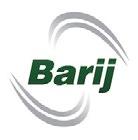
METHODOLOGY
The rankings for the OER Top 20 and the introductory write-up were done by Mukhtar Hasan who is a fellow of the Institute of Chartered Accountants in England and Wales and holds a Corporate Finance qualification issued jointly by this institute together with the Securities Investment Institute and the Chartered Accountants Institute of Canada. He graduated as a Bachelor of Commerce in 1970 and qualified as a Chartered Accountant in 1974. He is also a member of the Corporate Finance Faculty of the Institute of Chartered Accountants in England & Wales.
Hasan has local and international experience in banking, finance, senior management, private equity, corporate finance and investments. He is the managing partner of Al Barij International, which is a corporate finance firm specialising in corporate turnarounds. He has served on the board of several companies including Omani public companies United Power, Renaissance Services, Renaissance Hospitality, National Hospitality, Muscat Finance and Oman Textiles. He also served as the chairman of the American British Academy, an IB World School in Muscat for a number of years. He is currently chairman of Muscat Thread Mills, managing director of Gulf Mushroom Products Company and vice chairman of Oman Dental College as well as several other local and foreign private companies.
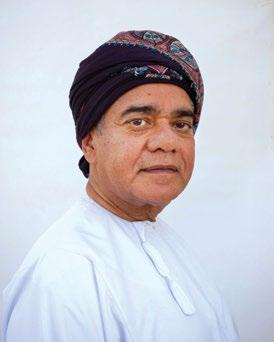
DEFINITIONS AND EXPLANATIONS
Revenues:
All companies on the list are derived from the published accounts submitted to the Muscat Securities Exchange (MSX). Therefore, closed Joint Stock Companies and private companies and establishments are excluded from this list. These companies are, in the first instance, ranked by Revenues. All the other rankings shown on the table do not consider any other companies that do not make the list on the basis of Revenue. In the case of banks and investment sector, the Gross Interest Income as well as Other Operating Income together is considered as their Revenue for this purpose. In the case of Insurance companies, the Insurance revenue and fees and commission income as well as Investment Income together is considered as their Revenue for this purpose. All figures are for the year ended December 31, 2024.
Profits:
Profits are shown after taxes and all charges including extra-ordinary charges. Figures in brackets indicate a loss. All losses and negative growth are also ranked where possible.
Assets:
Assets shown are as per the balance sheet at the end of the period. It is the total of fixed as well as the current assets.
Total Equity:
Total Equity is the paid up capital of the Company, retained earnings, and statutory and all other reserves as well as share premium. On consolidated position, Total equity pertains to the equity attributable to the equity holders of the Parent company.
Market Cap:
Market Capitalization figure has been arrived at by multiplying the total number of outstanding shares of the company by the price per share as of close of business on December 31, 2024 and March 31, 2025 or as the last trading of stock of the company.
Earnings per share:
The basic earnings per share or in
consolidation, attributable to the Parent company, are as published financial statements of the companies.
Dividend Yield:
The dividend yield figure is calculated on the basis of dividend declared in the financial statements for 2024 against the share price at the close of business on December 31, 2024.
Price Earnings ratio:
This ratio has been calculated by dividing the price per share by the earnings per share as at December 31, 2024.

MOORE GLOBAL
Moore Global is regarded as one of the world’s major accounting and consulting networks, with its headquarters in London, consisting of 547 offices, 240 firms and some 29,890 people across 113 countries. With a strong presence on every continent, the Moore Global network has developed and grown significantly, trebling profitable revenues since 2005. Today, ranked no. 11 globally by fee income and headcount according to the 2019 International Accounting Bulletin World Survey, a Moore network office can be found in more than 600 locations in 114 countries.
This capability enables to serve clients’ multi-national needs through the strength of a global professional community, and also benefit from collaboration between member firms to target new business opportunities, together. At Moore, our purpose is to help people thrive – our clients, our people and the communities they live and work in. The Moore brand is respected across global markets: it stands for quality, integrity and client care. The brand continues to evolve and strengthen, with network growth and the development of Moore as a thought leader further increasing our profile.The Moore brand helps you to attract highvalue work from quality clients, supporting profitability and providing access to exciting work opportunities for your people.
OER TOP 20 COMPANIES FOR 2024
OER TOP 20 COMPANIES FOR 2024

OMAN TELECOMMUNICATIONS COMPANY
IN TRANSITION MODE
Omantel’s strategy is focussed on leveraging the synergies created through the convergence of telecom and technology. The company has managed to maintain its leadership market positioning with an increased focus on digital services portfolio, services innovation, value driven strategies, and diversification
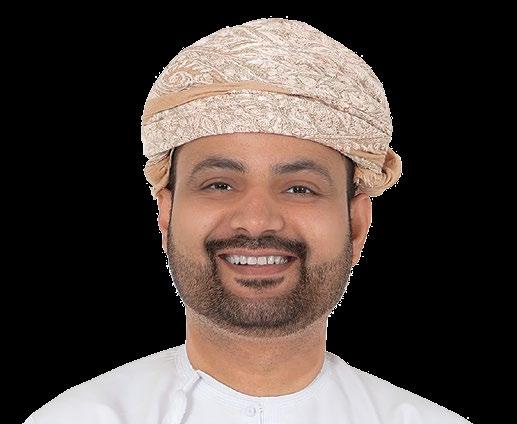
Talal bin Marhoon Al Mamari CEO, Omantel






Telecommunications industry in Oman continued to face headwinds during 2024, including intense competition, market price erosion, moderate market growth and shifting of customer demands driven by rapid technological advancements. Additionally, increasing commoditisation of core services continued to exert tremendous pressure on traditional revenue streams i.e. voice and messaging services. Over the past few years following a massive evolution of IP based OTT services, tens of millions of riyals worth of traditional voice and messaging revenue has been cannibalised over time. Omantel is steering through these challenges by actively diversifying its business streams and service offerings through digital platforms. The company is evolving from a conventional telecom provider to a technology-driven operator. As part of its corporate strategy, it is undergoing strategic transformations, including digital adoption, talent development, process optimisation, the implementation of a profit-and-loss-driven culture, and the conversion of cost centres into profit centres. The company has managed to maintain its leadership market positioning with an increased focus on our digital services portfolio, services innovation, value driven strategies, and diversification.
A pivotal element of Omantel’s success has been its enhanced focus on the Sultanate’s SME market, which notably contributed to our growth. By tailoring solutions to the specific needs of SMEs, we empowered this vital segment with affordable, scalable, and high-value services, positioning ourselves as a trusted partner in their growth journey. The company’s enterprise business continued to deliver strong performance across mobile, connectivity, and ICT services, demonstrating resilience and strategic agility in a competitive market. Omantel is also enhancing its core value propositions through ‘Innovation Labs,’ supporting start-ups and initiatives beyond traditional telecom. Aligned with Oman Vision 2040, it is actively pursuing inorganic growth through mergers and acquisitions, investing in Omani technology companies and start-ups. The company’s investment strategy is guided by market and sector trends, highlighting the convergence of telecom and technology and the synergies they create. Despite challenging market conditions characterised by intense competition and price erosion, the company managed to grow its mobile revenues during 2024 through an enhanced focus on post-paid services, customer-centric solutions and superior service quality. It also successfully maintained its Enterprise Connectivity revenues by focusing on delivering, quality, reliability and agility to meet customers’ continuously evolving needs.
BANK MUSCAT LEADERSHIP STRIDES
Bank Muscat’s investment in modern technology, developing human resources, and prioritising customer experience accounts for its success
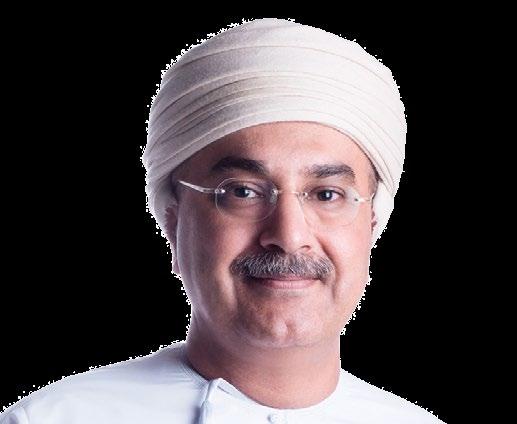







Throughout 2024, Bank Muscat continued to implement a variety of initiatives and programmes aimed at fostering economic development through the introduction of innovative banking solutions across its diverse core segments including, Personal Banking, Corporate Banking, Meethaq Islamic Banking, Investment Banking, Global Financial Institutions, Treasury & Capital Markets and International Operations. These efforts are designed to enhance the performance by providing integrated banking solutions that adapt to the dynamic market landscape. The Bank’s commitment to investing in modern technology, develop human resources, and prioritising customer experience, remains at the forefront of its strategy, ensuring to meet the evolving needs of customers effectively.
In 2024, Bank Muscat made significant strides in expanding its branch network by adding five new conventional branches thereby enhancing customer service. The Bank’s wide network of 190 branches also includes four mega branches across Oman. The branches in Oman provide comprehensive services, including housing finance, auto finance, Private Banking, wealth management, and Asalah centers, in addition to standard Banking services. As part of our commitment to accessibility, we now have over 890 conventional Automated Teller Machines (ATMs), Cash Deposit Machines (CDMs), Multi-Function Kiosks (MFKs), and Statement Printers across our network, providing customers with a wide range of banking services at their convenience.
During the year, significant progress was witnessed in the services provided to Asalah customers as seven new Asalah Centers were inaugurated, where other seven existing centers were also renovated to improve customer experience.
The digital Banking services have also seen remarkable growth, with a 44.1 per cent increase in the number of transactions and a 17.9 per cent increase in volumes generated for the acquiring business in 2024 compared to 2023. The number of users of Internet and Mobile Banking channels reached two million customers in December 2024, a 19 per cent increase from 1.69 million in December 2023. With the integration of Apple Pay and Samsung Pay, customers can now easily add their cards directly through the Bank’s mobile Banking app, promoting a fast and secure payment method that aligns with Oman’s vision 2040 for a cashless society. During the year, instant minor accounts opening feature was introduced, allowing Omani fathers to open children’s accounts with just a few clicks.
Sheikh Waleed Khamis Al Hashar CEO, Bank Muscat

OQ EXPLORATION AND PRODUCTION STRONG FUNDAMENTALS
OQ Exploration and Production makes a stellar debut on the OER Top 20 list with a promising performance
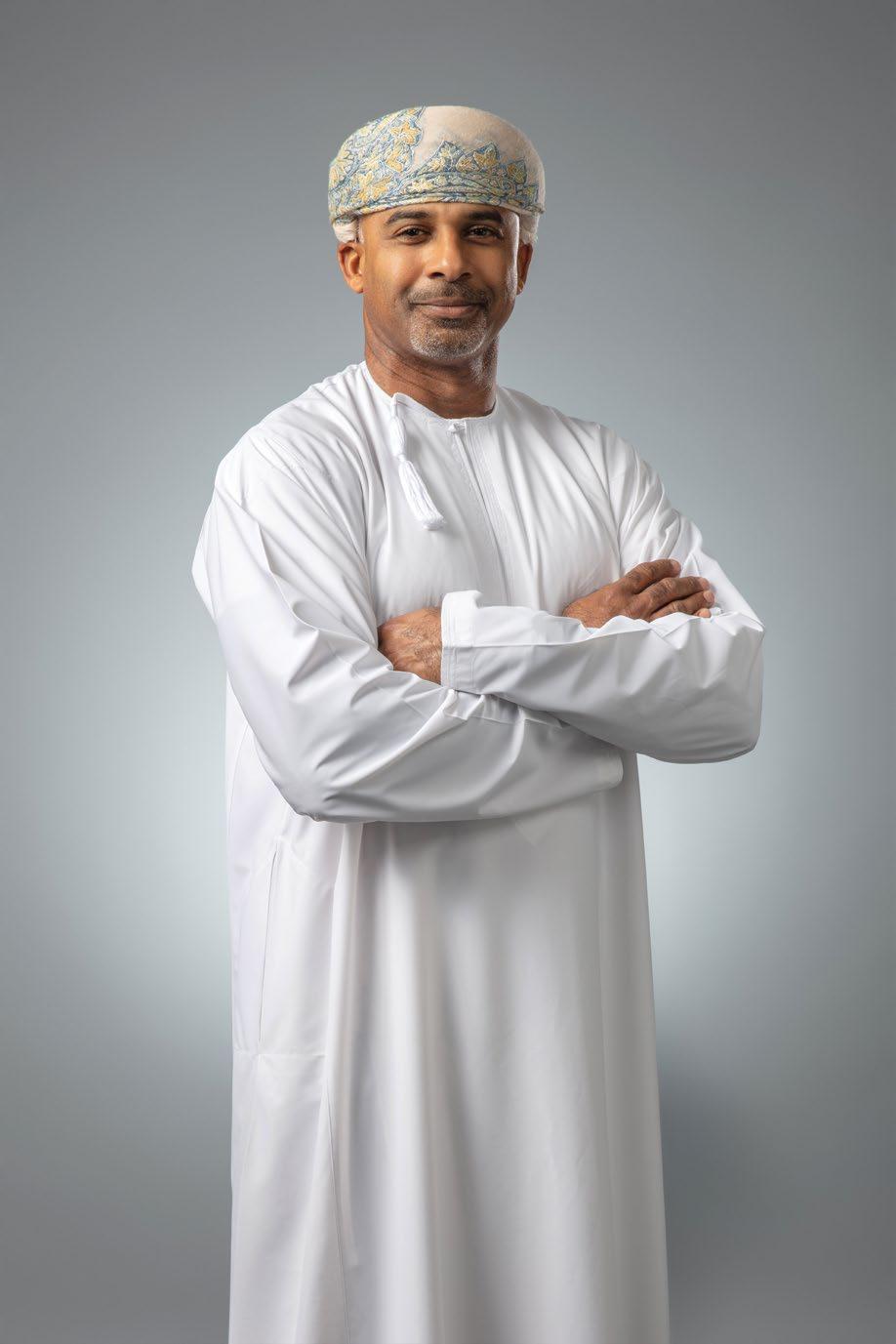
OQ Exploration and Production (OQEP) was incorporated on May 20, 2009 and registered in the Sultanate of Oman as a limited liability company under the name of Oman Oil Company Exploration and Production LLC. It was converted to a SAOC on the Commercial Register on July 15, 2024. On October 28, 2024, OQEP successfully listed its shares, and become a public joint stock company.
The company’s core business activities include exploration and production of crude oil and natural gas. These activities include exploration to identify potential reserves, drilling, development to construct necessary infrastructure, and production to extract and
OQEP is Oman’s largest pure-play oil and gas exploration and production company and is also one of the largest holders of oil and gas reserves in Oman and the total production in 2024 constituted approximately 16.3 per cent (2023: 14 per cent) of Oman’s total oil, gas and condensate production for that year.
Ahmed Al Azkawi CEO, OQEP
The mission of the company is to explore oil and gas in safe, efficient and sustainable way to support the company’s growth aspirations. OQEP’s exploration program is designed to drive reserves replenishment to support its future growth.
OQEP has a high-quality portfolio of 14 upstream oil and gas assets in Oman. These assets range from those in the development and production phase to others being appraised for commerciality or undergoing exploration programmes. Some assets are operated by the company, while in others, it has a participant/non-operator alongside one or more joint venture partners.
Block 60, the company’s flagship operated asset, an onshore contract area that primarily produces oil, and which accounted for nearly 16.3 per cent of the company’s total working interest production in 2024.
In 2024, Block 60 maintained solid production performance, operational efficiency and effective drilling activities. These achievements underscore OQEP’s commitment to sustainable and optimised resource development in Block 60.
Despite facing operational challenges mainly related to availability of permanent power, Block 60 achieved a total production of 60,550 barrels of oil equivalent (BOE) per day in 2024, maintaining a steady output in line with OQEP’s strategic goals.
OMAN

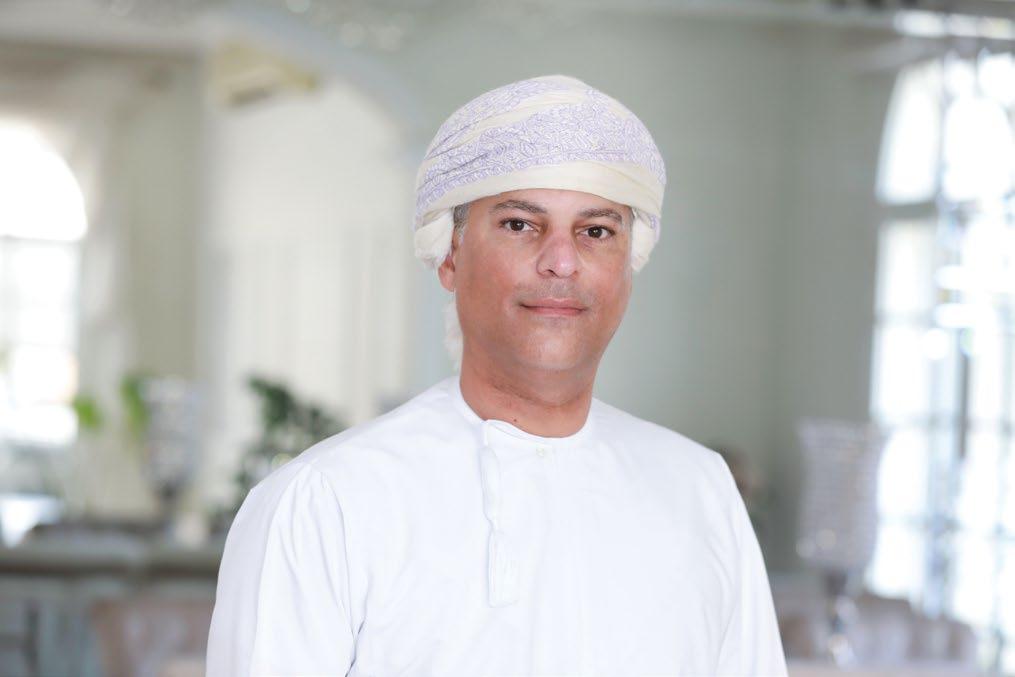






During financial year 2024, Oman Oil Marketing Company (OOMCO) was able to achieve extra miles through the expansion in the number of service stations as well as the variety of products and services provided to the customers. The company continues moving forward with the development of modern technologies and smart solutions for fast and secure purchases.
Health, Safety, Environment, Quality, and Sustainable
OOMCO considers its employees, customers, and the communities, which it serves, are the company’s most valued assets. It remains committed to ensuring a safe and secure environment for both employees and customers while safeguarding the public, company assets, and infrastructure. In 2024, OOMCO achieved a major safety milestone, recording zero Lost Time Injuries (LTI) over 6 million working hours. Additionally, OOMCO successfully completed 21 million kilometres of fuel transportation across Oman without a major road traffic accident. No OOMCO facility experienced fire incidents or environmental hazards, reflecting the company’s strong commitment to safety and risk mitigation.
To ensure a safe workplace, fuelling stations, and shopping environment, OOMCO introduced several innovative safety initiatives as part of its Road Safety Campaign, HSEQ Week, and heat stress awareness programs for service stations. These initiatives engaged employees, contractors, and stakeholders in active participation, reinforcing a culture of safety and responsibility. Emergency preparedness remained a top priority in 2024, with multiple drills conducted to enhance response capabilities. These included road traffic accident simulations, aviation fire incident drills, fuel spill response exercises at Duqm Terminal, and warehouse evacuations. OOMCO’s HSEQ culture is deeply embedded across all operations, integrating policies, best practices, and continuous monitoring. The company strategically implements policies, conducts audits, and develops performance reviews to drive ongoing improvement. In 2024, OOMCO successfully completed its external surveillance audit conducted by SGS, maintaining compliance with six internationally recognised management system standards:
• ISO 9001:2015 – Quality Management System
• ISO 14001:2015 – Environmental Management System
• ISO 45001:2018 – Occupational Health & Safety Management System
• ISO 27001:2013 – Information Security Management System
• ISO 22301:2019 – Business Continuity Management System
• ISO 22000:2018 – Food Safety Management System
Tarik Al Junaidi Oman Oil Marketing Company

AL MAHA PETROLEUM PRODUCTS MARKETING COMPANY PURSUING SUSTAINABLE GROWTH
Al Maha Petroleum Products Marketing Company’s performance was driven by growth in the retail, aviation and lubricants
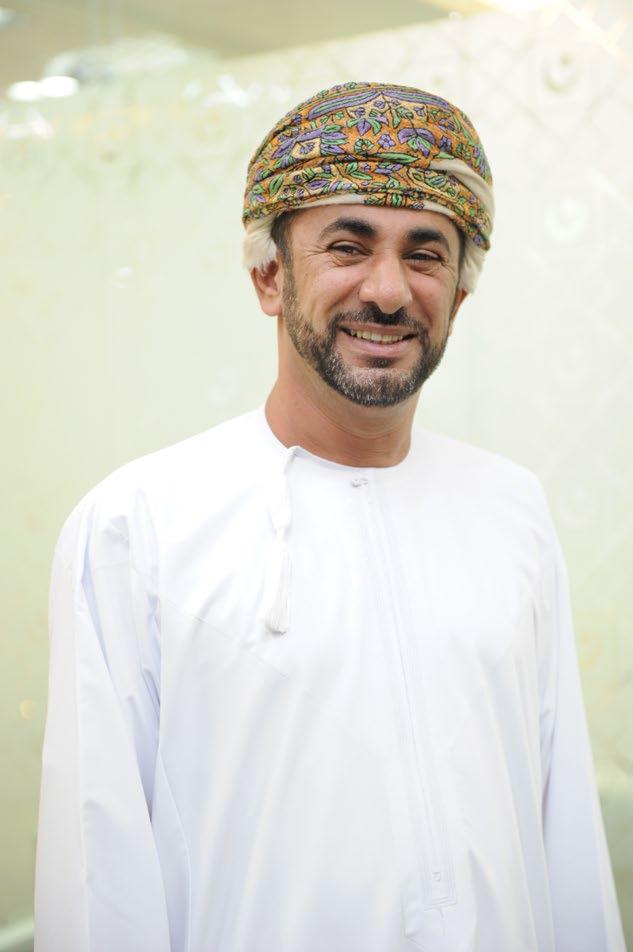
Al Maghdri CEO, Al Maha Petroleum Products Marketing Company


In 2024, Al Maha Petroleum Products Marketing Company (Al Maha) achieved strong performance by continuing its expansion strategies and strengthening its market share despite economic challenges and shifts in the energy sector. The company recorded notable growth across its various segments. The retail segment experienced improved performance, driven by the expansion of the station network and the launch of innovative digital services such as the “Maha Plus” application. The commercial segment grew as a result of securing new contracts with key customers, while the aviation segment maintained stable performance despite declining demand from one of its major customers. The lubricants segment recorded growth, supported by increasing demand for the new ‘AMPRO’ brand.
In line with its commitment to sustainability, the company enhanced its quality, health, safety, and environmental (QHSE) standards and continued investing in human resource development, achieving an Omanisation rate of 92%. Looking ahead, the Company aims to enhance its operational flexibility, explore new regional expansion opportunities, and focus on digital transformation, revenue diversification, and operational efficiency to ensure sustainable growth in an ever-evolving business environment.
Business & objectives
In 2024, the retail segment remained the primary revenue driver, achieving notable growth in performance. Throughout the year, the segment recorded several key achievements, summarised as follows:
• The Company has signed major investment agreements to develop integrated fuel stations and modern commercial centres in strategic locations. These include two agreements within Sultan Haitham City, an agreement with the Ministry of Culture, Sports, and Youth in South Al-Ghubrah, and the ‘Al-Ghubrah Front’ agreement with Saud Bahwan Group. This initiative aligns with the Company’s efforts to drive growth and establish itself as a prominent and influential brand in both the local and regional markets.
• The company expanded its network by inaugurating five new fuel stations, bringing the total to 252 across Oman. Additionally, eight existing stations underwent significant upgrades and enhancements, further improving service quality and enhancing customer experience.
• The company launched the ‘Al-Maha Plus’ smart application as part of its efforts to enhance the customer experience, contributing to increased sales.
Hamed Salim
SHELL OMAN MARKETING COMPANY
SUSTAINED GROWTH
Shell Oman Marketing Company’s focus on employee well-being has increased productivity and fostered a culture of innovation
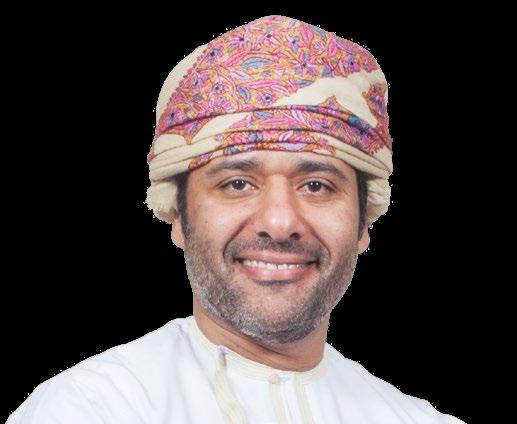
Al Balushi CEO, Shell Oman Marketing Company






The health and safety of people, customers, and the community are top priorities for Shell Oman Marketing Company (SOM). The year 2024 ended with zero recordable incidents and zero loss of primary containment (LOPCs), serving as a testament to its commitment to health, safety, security, and the environment. SOM focused on enhancing the safety and well-being of workers involved in its operations and completed a worker welfare gap assessment for all contracts operating with the company. This was achieved through the ‘Voice of the Frontline’ programme and inspections of the facilities provided for site staff. Additionally, many awareness and communication sessions were conducted to raise awareness of workers’ welfare requirements.
In 2024, the company continued its efforts to ensure the well-being of staff and forecourt service champions through various initiatives, such as health check-ups and blood donation drives in collaboration with the Ministry of Health. In addition, SOM conducted health awareness sessions targeting both mental and physical well-being. To address the challenges posed by soaring temperatures, fatigue management awareness campaigns were delivered to contractors, truck captains, frontline staff in aviation, terminals, the blending plant, and forecourt service champions. The company also launched its wellness programme through a new HR policy aimed at supporting the well-being of people. In 2024, the company made significant strides in enhancing Employee Value Proposition (EVP) to attract and retain top talent. SOM’s commitment to workforce empowerment, along with creating a supportive, inclusive, and growth oriented work environment, has been the cornerstone of its success. A People First HR Policy was launched to address the dynamic needs of the future workplace while ensuring full compliance with labour laws. This policy prioritises the well-being, development, and engagement of employees, embodying a commitment to putting employees at the heart of everything that the company does.
A number of HR policy enhancements were also done to help employees, these include:
1. Employee Well-Being: Flexible Work Policy offering remote work, working from home, and flexible working hours.
2. Professional Development: Continuous learning opportunities, career pathing, and mentorship programmes.
3. Diversity and Inclusion: Inclusive hiring practices and employee resource groups.
4. Performance-Based Rewards: Recognition programmes to acknowledge and celebrate employee achievements.
Dr Mohammed Mahmood
OMINVEST
FUTURE READY
Ominvest’s competitive edge lies in its ability to identify and capitalise on high-potential investment opportunities while maintaining strong risk management protocols
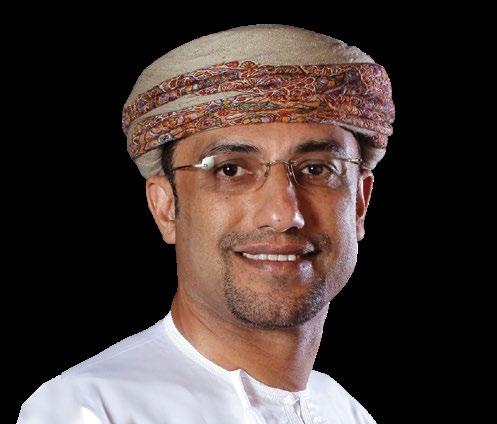
AbdulAziz Mohammed Al Balushi, Group CEO - OMINVEST






Ominvest operates in a dynamic and highly competitive investment environment characterised by evolving regulatory frameworks, market volatilities, and technological disruptions. As regional and global markets continue to shift, competition among investment firms, financial institutions, and asset managers has intensified. The Group’s competitive edge lies in its ability to identify and capitalise on high-potential investment opportunities while maintaining strong risk management protocols. Unlike traditional investment firms, Ominvest leverages its diversified portfolio across financial services, insurance and emerging technology sectors to create sustainable value. The increasing digitisation of financial services, shifting consumer expectations, and geopolitical uncertainties present both challenges and opportunities.
Key operational highlights
• Ominvest’s strategic acquisitions of additional stakes in Bank Muscat and International General Insurance delivered strong results, significantly enhancing returns.
• Ominvest, in line with its strategic objectives, successfully completed the divestment of two investments at attractive valuations, generating substantial cash inflows of RO51mn during the year. These divestments underscore Ominvest’s commitment to optimising its investment portfolio, unlocking value, and maintaining robust liquidity to capitalise on future growth opportunities.
• Ominvest secured a US$500mn facility arranged by Gulf International Bank B.S.C. (GIB) in collaboration with their partners, ABK and Gulf Bank. This agreement marks the start of a long-term strategic partnership between Ominvest and leading regional financial institutions, aimed at fostering growth and investment opportunities in Oman and the broader region. The facility empowers Ominvest to pursue impactful investments, delivering substantial value for the company and the economies it supports. The terms of the agreement reflect the institutions’ strong confidence in Ominvest’s vision and future prospects.
• Ominvest has partnered with Dreamlab Technologies, a Swissbased global leader, to elevate the cybersecurity capabilities of our subsidiary, National Security Services Group. This strategic collaboration empowers the Group to deliver state-of-the-art cybersecurity solutions, safeguarding critical infrastructure across Oman and the region. Trusted by governments and critical infrastructure providers worldwide, Dreamlab is an accredited member of SWIFT’s Customer Security Programme and the United Nations’ ITU.
SOHAR INTERNATIONAL
PROMISING PROSPECTS
Sohar International has positioned itself as a global financial institution and a key enabler of Oman’s economic progress

Abdul Wahid Mohamed Al Murshidi, CEO, Sohar International








Sohar International’s journey continues to be marked by strategic growth, digital innovation, and the pursuit of excellence. As a leading player in Oman’s banking sector, the Bank remains firmly committed to delivering exceptional value to its stakeholders through a robust blend of operational excellence, strong corporate governance, and a forward-thinking digital strategy. The Bank’s mission is rooted in fostering sustainable growth, both within Oman and internationally, while actively contributing to the nation’s economic progress. In 2024, Sohar International achieved a milestone profit exceeding RO100mn, a testament to its successful strategic execution. With a market capitalisation of US$2.4bn, the Bank ranks as the third largest listed entity on the Muscat Stock Exchange (MSX), reinforcing its stature as a financial powerhouse in the region.
Growth and Expansion
Sohar International’s strategy has been defined by thoughtful and transformative expansion. The merger of HSBC Bank Oman into Sohar International, followed by the seamless integration of operations, marked a significant milestone in the Bank’s journey. Building on this momentum, Sohar International expanded its presence beyond borders, entering the Kingdom of Saudi Arabia. This strategic move aligns with the bank’s goal of tapping into one of the GCC’s largest and most dynamic economies. By offering premium financial solutions, including working capital, trade finance, and risk management services, Sohar International has established itself in Saudi Arabia’s evolving financial landscape.
The Bank’s expansion strategy also includes applying to regulators in Oman and the United Kingdom to seek a license to open a branch in London, further solidifying Sohar International’s position as a global financial institution and a key enabler of economic progress. Sohar International continues to redefine the banking landscape with its forward-thinking ‘Digital First’ strategy, positioning itself as a market leader in both conventional and Islamic banking across Oman and the GCC. With over 30 groundbreaking digital solutions introduced in 2024, the bank has reinforced its role as a catalyst for financial innovation, driving accessibility, efficiency, and national economic progress. Rooted in the ambitions of Oman Vision 2040, Sohar International remains committed to fostering a technologically advanced and digitally inclusive economy. As a key milestone in its digital evolution, the bank has enhanced the ‘My Life | My Goals’ platform—an industry-first ecosystem that seamlessly integrates financial and lifestyle solutions— by introducing new features and developments, further elevating the user experience.

LIVA GROUP CUSTOMER CENTRICITY
Liva Group’s focus on profitable segments, innovative opportunities and customer-focused products strengthens its foundations for long-term growth
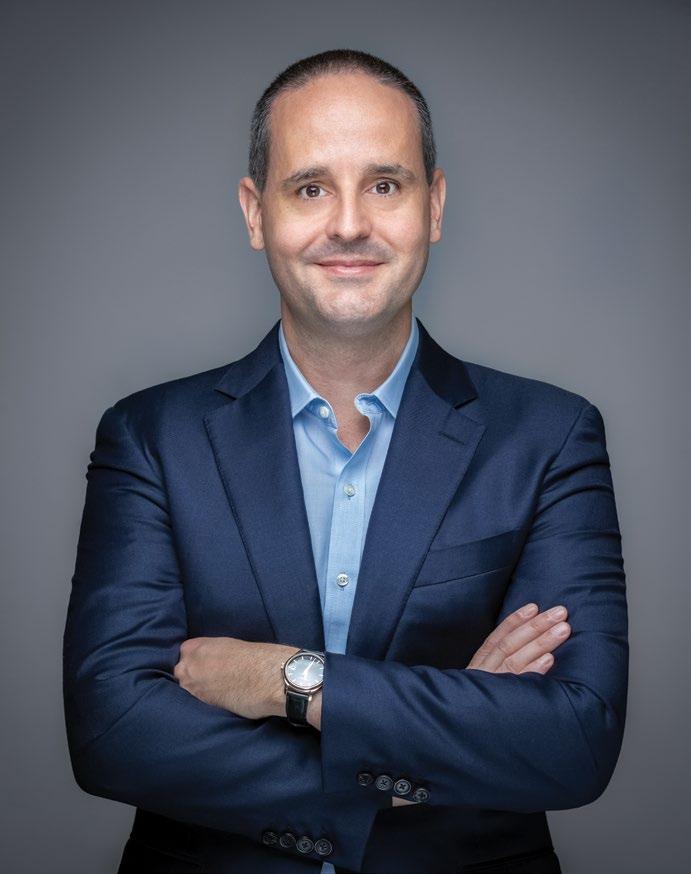



The year 2024 presented as a demanding year as a result of severe weather events, however Liva Group (‘Group’ or ‘Liva’) continued to strengthen the underlying business of the Group and its subsidiaries, advancing its strategy to diversify and scale the business, both in terms of segments and geographies.
The extreme April rainfall, particularly in the United Arab Emirates (UAE), presented significant challenges, however, the Group demonstrated resilience and adaptability in the face of these unprecedented storms. Liva is confident about its ability to significantly improve results in 2025, as demonstrated by the strong performance in the second half of 2024.
Liva reaffirmed its commitment to customers, adhering to its mission of transparency through timely recognition, booking, and handling all claims. The second half of 2024 was particularly robust, with the Group reporting a profit after tax of RO10.9mn delivered in the last 6 months, up 47 per cent compared to the same period in 2023. The Group’s insurance service result also experienced substantial growth during the second half of 2024, reaching RO12.6mn, an improvement of 79 per cent compared to the same period in 2023. This underscores the effectiveness of ongoing technical improvements and growth initiatives and demonstrating commitment to Liva’s ambition to being a leading multi-line insurer.
Looking ahead, the Group remains committed to further elevating business discipline in pursuit of growth opportunities to maximise value for shareholders. The Group reported a six per cent year-onyear increase in insurance revenue in 2024, achieving RO329mn, driven by the successful implementation of key initiatives, such as strategic partnership, new products and cross selling across our core markets of Oman, United Arab Emirates (UAE) and Kingdom of Saudi Arabia (KSA). The growth in revenue reflects the Group’s efforts to establish and strengthen a strong market presence.
The first half of the year focused on strengthening profitability, with a focus on managing pricing in the competitive KSA Personal Line market and optimising technical resilience in Health & Life in the UAE and Oman. The second half of the year delivered strong revenue growth for the Group across all segments, driven by securing new business and increased pricing amid changing market dynamics, including the extreme weather events earlier in the year.
Martin Rueegg, Group CEO, Liva Group
FOCUSSING ON FUNDAMENTALS
BankDhofar has expanded its branch network in all governorates in an effort to be closer to customers and providing them the best products with exceptional service
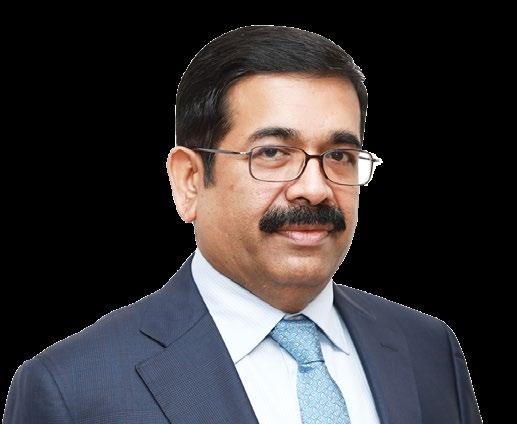
Karumathil
Acting CEO, BankDhofar







Continuing its commitment to delivering state-of-the-art products and services, BankDhofar’s Retail Banking launched several new initiatives and enhancements across its product range. These key initiatives covered loans, accounts, services, and customer segments.
The account opening process was revamped, significantly reducing the time customers spend in branches from over 20 minutes to just 5 minutes. To further support employees of corporate and SME customers, welcome kits with debit cards are now issued through the Doorstep Banking service, eliminating the need for branch visits.
Retail Banking also introduced the “Promised to Serve” campaign, ensuring that all customers are attended to within 10 minutes of entering any branch. The campaign’s performance is published weekly on social media, with the highest achievement reaching 97 per cent. The Bank also played a pivotal role in the OQEP and OQBI IPO subscription process. Through its mobile app, customers were provided with the option to access instant financing at a 1.1 ratio.
Distribution Expansion is a vital component of the bank’s business growth strategy. By effectively broadening the distribution channel, the bank will enhance its reach, improve customer satisfaction, and ultimately drive sales growth. By expanding the branch network in all governorates, BankDhofar seeks to be closer to customers and build a deep relationship with customers, retain them, and provide the best products at exceptional services. With the opening of new branches, BankDhofar has more than 100 branches distributed throughout the Sultanate. The bank opened branches in many of the universities and colleges across all regions in the Sultanate. In addition, the bank opened specially placed branches in Omantel and Oman Air H.O. The Bank expanded its ATMs / CDMs network to reach 388 ATMs, multi-use cash deposit machines, and multi-service interactive machines.
Al Riadah Priority Banking is a premium banking service tailored to the financial needs and goals of affluent individuals. It provides personalised services and exclusive benefits to enhance our affluent customer’s banking experience. In addition to personalised financial solutions, Al Riadah members enjoy a range of exclusive privileges and benefits. These include preferential interest rates on deposits and loans, premium credit cards with enhanced features and rewards, access to exclusive lounges at select airports, and special discounts and offers from partner merchants.
Gopakumar


NATIONAL BANK OF OMAN
SETTING BENCHMARKS
National Bank of Oman achieved a further year of strong growth in the volume of customer deposits, exceeding market benchmarks and reaching RO4.13bn, a 14.4 percent increase over 2023
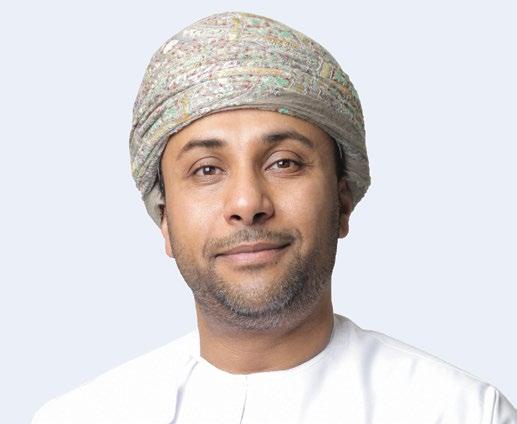
Abdullah Zahran Al Hinai CEO, National Bank of Oman






NBO recorded outstanding performance in 2024 across a range of key financial metrics, including strong growth in fee income, customer deposits and loans and advances, coupled with prudent cost management, resulting in achievement of record net profit and demonstrating the highly effective execution of its strategic plan. Net Profit for the year rose to RO63.06mn, compared to RO58.03mn in 2023, an increase of 8.7 percent. Total Operating Income for the year 2024 increased to RO151.33mn, from RO145.87mn in 2023, reflecting a 3.7 percent increase aided by a strong growth of 20.4 percent in Fee Income. While continuing to invest in people, technology and infrastructure, operating expenses were optimally managed, reflecting an increase of 1.7 per over last year. This resulted in a fourth year of consecutive improvement in the cost to income ratio to 41.6 per cent.
Total assets at the end of 2024 were RO5.24bn, an increase of 8.7 percent compared to the end of 2023. The Bank achieved a further year of strong growth in the volume of customer deposits, exceeding market benchmarks and reaching RO4.13bn, a 14.4 percent increase over 2023. The growth achieved in loans was also at healthy levels with gross loans and advances of RO4.09bn, an increase of 11.7 percent over 2023. At the same time, the effective risk management practices, coupled with careful segment selection focused on government-related entities (GRE) and better recoveries, have resulted in net impairment of RO14.14mn for the year 2024 compared to RO15.70mn for the year 2023. The Bank’s Core Equity and Total Capital Adequacy Ratio remained comfortably above regulatory minimum stipulated by Central Bank of Oman at 11.5 percent and 17.1 percent respectively, demonstrating strong levels of financial health and stability. The demand for Shari’a-compliant banking has been growing rapidly both globally and regionally, and 2024 marked a significant milestone for the Muzn Islamic Banking business. Since its relaunch, under the oversight of the dedicated Muzn Supervisory Board, Muzn has gained strong momentum, with substantial growth in customer numbers, deposits, and its contribution to NBO’s overall performance. Muzn also expanded its digital capabilities by introducing digital onboarding for accounts and enabling Apple Pay for its customers. Beyond digital advancements, Muzn reinforced its physical presence with the inauguration of a new branch in Ibra, North A’Sharqiyah Governorate. In 2025, the Bank will refresh its strategy and recalibrate objectives taking account of both the progress it has made and the emerging trends shaping the operating landscape.
GALFAR ENGINEERING & CONTRACTING
COMPETITIVE EDGE
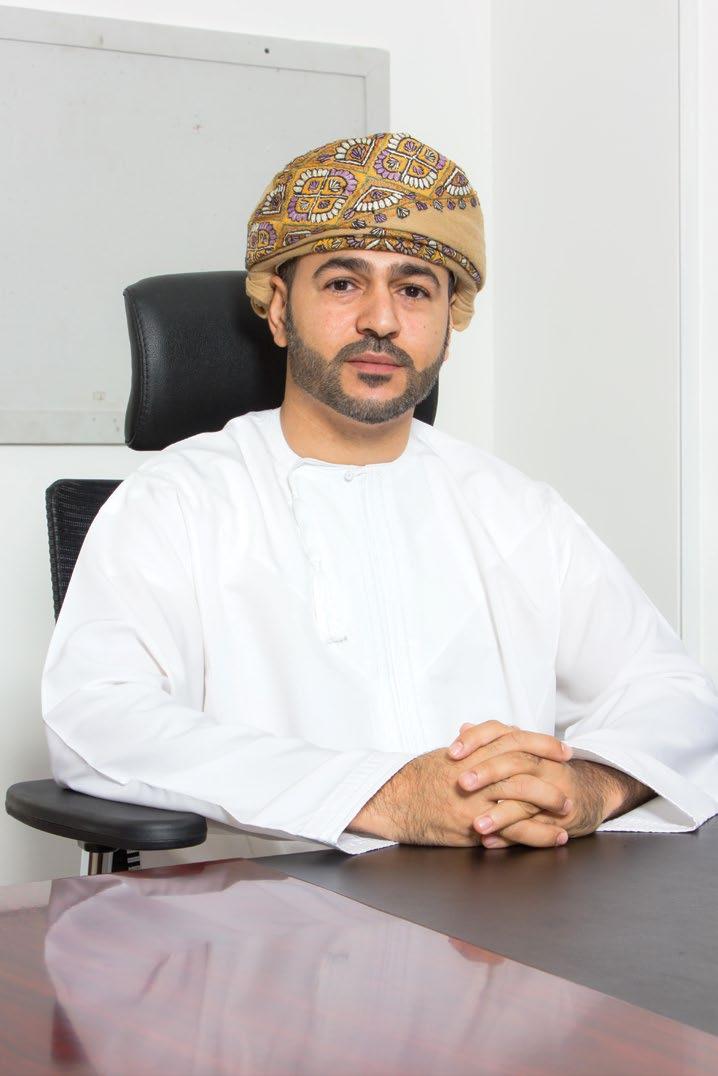
In line with its strategic focus on diversification, Galfar has successfully ventured into the railway sector with the Hafeet Rail


Dr. Hamoud Rashid Al Tobi CEO, Galfar Engineering & Contracting


Galfar Engineering and Contracting Group’s financial results for the year ended December 31, 2024 reflect a turnover of RO286mn, marking an increase from RO250mn in 2023. The Group reported a loss after tax of RO 3.9mn, compared to a profit of RO0.1mn in the previous year. The Parent Company recorded a turnover of RO273mn (2023: RO238mn) with a loss after tax of RO3.7mn, compared to a profit of RO 0.6mn in 2023.Galfar Aspire Readymix SPC, specialising in ready-mix concrete production, achieved a turnover of RO16.1mn (2023: RO14.3mn) with a profit after tax of RO0.6mn (2023: RO0.9mn). Aspire Projects and Services SPC, a specialised engineering and services company, recorded a turnover of RO4.4mn (2023: RO1.6mn) and a loss of RO0.8mn, consistent with 2023. Al Khalij Heavy Equipment & Engineering LLC, engaged in equipment rentals, reported a turnover of RO3.0mn (2023: RO 2.4mn) and a loss of RO0.1mn, the same as in 2023.
Galfar remains firmly committed to its transformation strategy, achieving significant results that strengthen its competitive edge. A core component of this strategy is Diversification and Sustainability, where it has made substantial progress over the past several years. Its sustainability efforts include implementing energy-saving measures across Galfar premises, and developing a comprehensive decarbonization strategy and plan. It has also taken tangible steps by executing an in-house renewable energy project. Underscoring this commitment, Galfar actively participates in ESG (Environmental, Social, and Governance) initiatives and reporting, supported by a dedicated team focused on these vital areas. In line with its strategic pillar of diversification, Galfar has successfully entered the railway sector through the Hafeet Rail project and is actively pursuing additional opportunities. It has also secured a Project Delivery Contract with Petroleum Development Oman and expanded its client portfolio by onboarding Grand Blue City and Hafeet Rail.
The financial performance for the year was influenced by external market factors, cost pressures, and legacy challenges, which are actively being addressed. Despite these challenges, the company has witnessed positive revenue momentum, supported by operational improvements that provide a strong foundation for future recovery and profitability. During the year, the company secured new orders worth RO 616mn, including RO 40mn in additional work within existing contracts. As a result, the total value of orders on hand as of December 31, 2024 exceeds RO 970 million.


OMAN ARAB BANK
ENHANCED SERVICE
Through market leadership and a series of impactful initiatives, Oman Arab Bank was able to enhance its accessibility by introducing seamless IBAN and account number sharing, ensuring smoother transactions for customers
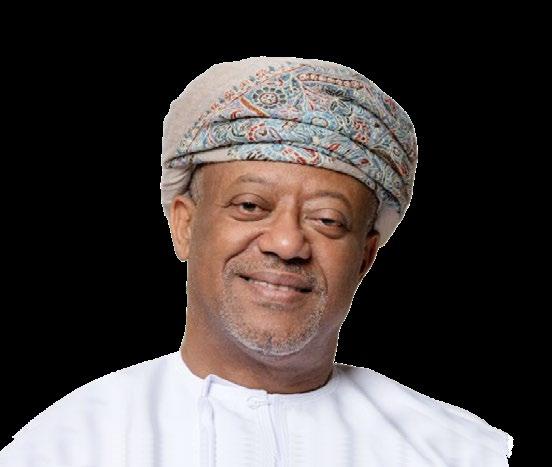
Sulaiman Al Harthi CEO, Oman Arab Bank






Oman Arab Bank delivered a net profit of RO30.4mn in 2024, an increase of RO9.9mn or 48 per cent over 2023, largely driven by growth in core operations and lower net impairment losses on financial assets. Operating profit was up 11 per cent (RO5.3mn) to reach RO54mn compared to RO49mn in 2023. Total operating income of RO126.5mn for the year 2024 increased by RO6.2mn from RO120.2mn in 2023. The increase was primarily driven by higher interest and financing income. Net interest income from conventional activities was at RO72.4mn in 2024 against RO70.7mn in 2023, up by RO1.7mn or 2 per cent, supported by strong business volumes. Net income from Islamic financing increased marginally by RO0.9mn to RO27.1mn in 2024. Net fee and commission income increased by RO0.9mn or 4.6 per cent to reach RO19.8mn in 2024 against RO18.9mn in 2023, primarily attributable to the growth of the card business and credit facilities. Total operating expenses for the year ended December 31, 2024 amounted to RO72.2mn compared to RO71.3mn for the corresponding period in 2023, reflecting an increase of RO0.9mn or 1.3 per cent. This increase is primarily due to higher staff costs, reflecting the Bank’s continued investment in people.
In 2024, the Bank reaffirmed its commitment to innovation and providing customer-centric solutions. Through market leadership and a series of impactful initiatives, the Bank was able to enhance its accessibility by introducing seamless IBAN and account number sharing, ensuring smoother transactions for customers. Moreover, to boost engagement with customers, the Bank launched a credit card sales contest, rewarding top-performing customers with coveted Apple gadgets, including iPhones, tablets, and watches. Furthermore, the Bank partnered with Aramex to streamline the delivery of retail credit cards, ensuring faster and more efficient service across Oman. Setting a benchmark in premium banking, the Bank proudly became the first in Oman to launch the Infinite Visa Elite Exclusive Premium card, reinforcing its commitment to high-net-worth clientele. Beyond banking, the Bank contributed to education and career development by signing an agreement with NHI to provide education loans for around 150 hospitality students, empowering the next generation of professionals. These initiatives reflect the Bank’s dedication to innovation, customer satisfaction, and socioeconomic progress, laying a strong foundation for continued success in the years ahead. Alizz Islamic Bank also engaged in strategic initiatives, partnering with The Oman Vision 2040 Follow-up Unit to issue the region’s first corporate innovation guides, as well as with Abraj Energy Services and Omran Group to finance projects that drive innovation and development.
LONG-TERM VALUE

Erkan Aydogdu CEO, Oman Cables Industry








Oman Cables Industry continued to deliver value and enhance profitability in 2024. Revenue growth was driven by higher exports, particularly in the renewable energy sector and increase export in Power grid too. The increase in profitability and volume is primarily due to the company’s unwavering focus on dynamic pricing, agile design-to-cost strategies, robust fixed cost management, and leveraging a diverse product portfolio that includes high value-added products and services, along with an expanded geographical export reach. In addition to improved profitability, the company remains committed to sustainability, with climate, social, and innovation goals as the core drivers of its strategy and vision. These elements are integral to the corporate culture and business operations at all levels. The company’s profitability was further bolstered by prudent management of financial income and expenses, diversification into a broader range of high-value products, services, and solutions, and an expanded presence in international export markets. Beyond being a cable producer, the company leverages its leadership position as a technological enabler of the energy transition. It aims to anticipate customer needs by strengthening supplier engagement and focusing on continuous innovation. The company utilizes its technological and industrial leadership to amplify its positive impact on the community. Sales revenues of the Parent Company for 2024 are RO 200,990,803 as compared to RO183,646,689 in 2023. The sales of the Group were RO268,782,636 compared to RO248,164,991 in 2023.
The Net Profit of the Parent Company for the year 2024 was RO 16,123,680 as compared to RO 13,461,087 in 2023. The increase in profitability is mainly due to product development, differentiation efforts both in the offered mix and geographical expansion, cost control and financial discipline. The Net Profit of the Group in 2024 was RO22,622,186 compared to RO 18,929,058 in 2023.
The company has developed strategies to accelerate the Sultanate’s transition towards sustainable and green energy. At the core of Oman Cables, sustainability is integral to business operations across the entire organisation. OCI ensures the sustainability of its production processes through efficient and effective energy management, maximising the use of renewable energy resources, relying on recycled raw materials and low-carbon products, managing waste effectively, and enhancing circularity. The company’s innovative and sustainable products are pivotal in supporting the energy transition. This transition is closely linked to the ability to transmit and dispatch energy from production sites to consumption areas.


OMANI QATARI TELECOMMUNICATIONS COMPANY (OOREDOO)
KEY ENABLER
Ooredoo demonstrated resilience and steady performance amidst intensifying competition and evolving customer demands in 2024
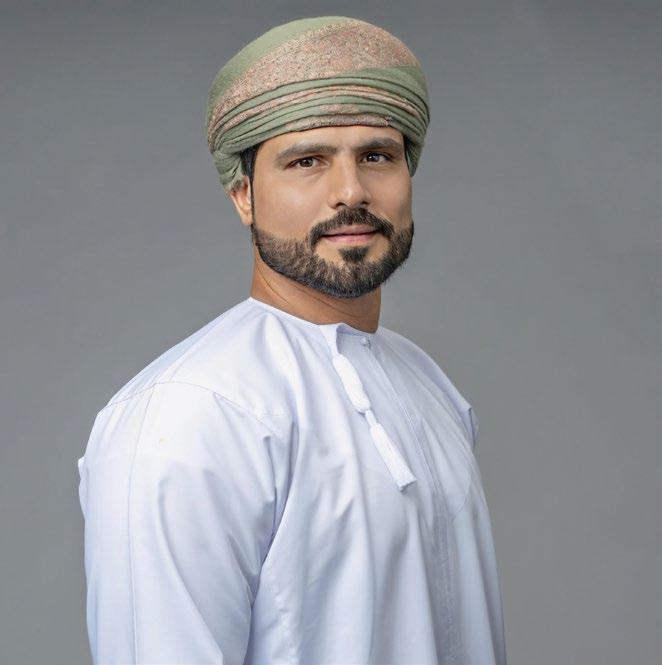
Saoud Al Riyami Acting CEO, Ooredoo Oman





In 2024, Ooredoo achieved significant milestones in 5G deployment and infrastructure development, cementing its role as a leader in driving Oman’s digital future. By year-end, its 5G network extended to over 79 per cent of Oman’s population, including underserved areas. This expansion enables customers across the Sultanate to experience higher speeds, lower latency, and greater capacity, unlocking opportunities for individuals, businesses, and communities. The growth in 5G broadband services, which increased by 4.7 per cent YoY to 77.9K customers, reflects the rising demand for next-generation technologies and the dedication to meeting this need.
To support this growing demand, the company prioritised expanding 5G coverage as well as boosting capacity on existing sites where high demand is reported, particularly for fixed wireless solutions. These efforts are critical in enabling transformative technologies like IoT, AI, smart city applications, and fintech, which are essential to Oman’s digital empowerment. Complementing its 5G advancements was the operational launch of three Tier 3 data centres in Barka, Sohar, and Salalah. These state-of-the-art facilities offer world-class cloud storage, disaster recovery, and cybersecurity services, supporting local businesses and Oman’s rapidly growing digital ecosystem. As landing points for the 2Africa subsea cable, these centres also strengthen Oman’s position as a regional data hub, connecting Africa, Asia, and Europe.
In 2024, the company demonstrated resilience and steady performance amidst intensifying competition and evolving customer demands. The telecommunications market continues to shift, with new entrants increasing competitive pressure. Despite these challenges, the company’s strategic focus on connectivity, innovation, and customer-centric solutions enabled it to maintain a strong market presence. Its mobile customer market share stood at 33.4 per cent as of December 2024, reflecting a slight decrease of 1.9 per cent YoY. In the fixed broadband sector, it retained 27.6 per cent market share, driven by the continued growth and rising competition of fibre broadband, which increased by 12.9 per cent YoY to close at 50.8K customers. Similarly, 5G broadband services saw strong demand, rising by 4.7 per cent YoY to reach 77.9K customers, highlighting the appetite for high-speed, reliable connectivity across Oman. This reinforces the company’s commitment to bridging the digital divide and enhancing connectivity nationwide with a global presence to cater national, regional and transit capacity sales.
SEIZING OPPORTUNITIES
2024 was a period of significant transformation and growth for OQ Base Industries (SFZ)








OQBI Group’s revenue increased by RO38.6mn, or 19.7 per cent, to RO234.8mn for the year ended December 31, 2024, compared to RO196.2mn for the year ended December 31, 2023. The increase in revenue is largely driven by Methanol product with an increase in revenue from Methanol of RO34.3mn or 44.4 per cent, with a total of RO111.6mn for the year ended December 31, 2024, compared to RO77.3mn for the year ended December 31, 2023. The Methanol revenue increment was due to 30 per cent higher volume and due to 11 per cent increase in the average sales price compared to 2023.
The company has an increased adjusted EBITDA by RO10.0mn, or 11.8 per cent, to RO94.6mn for the year ended December 31, 2024, compared to RO84.6mn for the year ended December 31, 2023. Adjusted EBITDA has increased primarily due to increase in revenue by RO38.6mn which is partially offset by increase in gas consumption charge by RO15.9mn in the Parent Company and additional notional gas provision of RO14.1mn in the subsidiary. Net profit for the year ended December 31, 2024 decreased by RO7.1mn, or 14.9 per cent, to RO40.4mn, compared to RO47.5mn for the year ended December 31, 2023. The decrease in net profit for the year was primarily due to an increase of notional provision of rich gas by RO14.1mn, or 50.4 per cent, to RO41.8mn in 2024 compared to RO27.8mn in 2023, one-off impairment of an RO5.3mn from a related party receivable in 2024 compared to nil in 2023 and a decline in finance income by RO14.9mn or 76.7 per cent, to RO4.5mn as compared to RO19.4mn due to the early maturity of fixed deposits to comply with IPO Sharia requirements. The net profit was enhanced through offsetting effects where finance costs decreased by RO7.8mn or 28 per cent mainly due to discontinuation of hedge derivatives for the Group which has resulted in an additional gain of RO8mn or 52 per cent to RO23.5mn, compared to RO15.4mn hedge income for year ended December 31, 2023. Further, costs saw a reduction within administrative and general expenses of RO0.5mn, and additional other income of RO1.0mn.
The Group is the only integrated producer in Oman of methanol, ammonia and LPG Products, The LPG products include propane, butane, condensate and LPG (cooking gas). The Group has achieved 31.7 per cent higher production cumulatively for Methanol and Ammonia (1,538 MT) for twelve months period ended December 31, 2024 compared to (1,168 MT) for the same period ended December 31, 2023.

AHLI BANK
INNOVATION AND EXCELLENCE
ahlibank’s milestones in 2024 highlight its commitment to excellence, adaptability, and shaping the future of banking in the Sultanate

Said Abdullah al Hatmi CEO, ahlibank






ahlibank completed 17 successful years since its incorporation as a commercial Bank and continued to move ahead with another steady performance across key financial indicators for the period ending December 2024. The Bank’s net loans, advances and financing witnessed a 12.2 per cent growth to RO3,022.3mn at the end of December 31, 2024, over the corresponding period in 2023. Customers’ deposits increased by 11.6 per cent to reach RO2,762.8mn, compared to the corresponding period of 2023; Total Assets increased by 13.2 per cent, reaching to RO3,754.9mn. Operating Income increased by 9.9 per cent to reach RO108.31mn. Operating expenses, increased by 7.6 per cent to reach RO 46.40mn. Profit for the period grew by 14.3 per cent to reach RO41.66mn, demonstrating the Bank’s sustained growth strategy.
As ahlibank reinforced its standing as a leader in banking excellence and innovation, the year 2024 achievements reflect a focused strategy to deliver exceptional value to stakeholders while aligning with Oman’s national economic goals. ahlibank’s milestones highlight its commitment to excellence, adaptability, and shaping the future of banking in the Sultanate. Following the success of the first phase of one of the most ambitious projects in the Sultanate, the Bank signed an agreement to finance the second phase of Khazaen Economic City (KEC). The project is set to enhance the country’s socio-economic development, driving forward the goals outlined in Oman Vision 2040. Further, ahlibank announced the financial closure of the project financing facility to an SPV owned by the Oman Environmental Service Company SAOC - ‘be’ah.’ The facility was undertaken to finance the Industrial Waste Treatment Facility (IWTF) Project in Sohar Port and Free zone. Keeping with the theme of providing nothing but the best to its high-net-worth customers, ahli islamic officially inaugurated its brand-new Al Shumookh center in line with its commitment to providing unparalleled banking services adhering to Sharia-compliant principles, offering an exclusive sanctuary for its discerning patrons. The Bank also successfully completed its advisory role for the Sustainable Development Investment Company in raising RO40.6mn to finance the development of 300 residential villas within The Sustainable City, Yiti. The fundraising garnered a total investment of RO58.2mn for the development of the villas. ahlibank, driven by its commitment to operational excellence and customer-centric innovation, has significantly enhanced its digital capabilities in 2024.
EXCEPTIONAL PERFORMANCE
Phoenix Power Company’s financial results for 2024 are 4.91 per cent higher than those of the same period in 2023
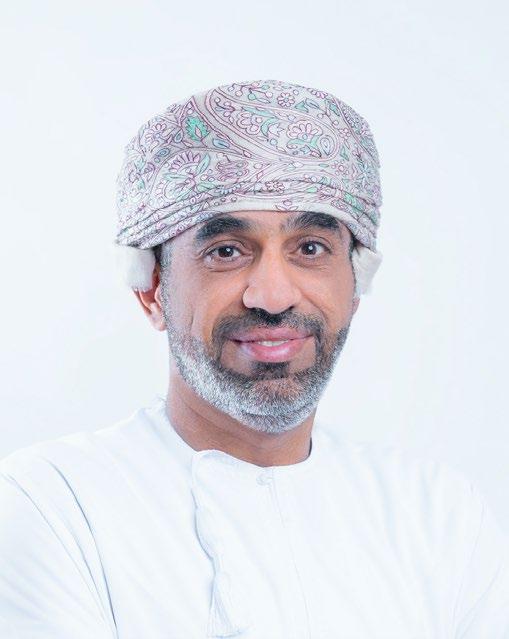
Mohammed Al Shuaili CEO, Phoenix Power Company SAOG









Phoenix Power Company generated a net profit of RO22.99mn in 2024. Revenues of RO167.79mn in 2024 were higher than the RO158.49mn generated in 2023 mainly due to higher availability and indexation. Costs in 2024 were RO129.49mn which were higher than the RO119.82mn spent in 2023, primarily driven by higher fuel prices resulting in higher corresponding fuel costs. The Net Profit of the company was RO23mn in 2024 which was higher than RO21.92mn earned in 2023. Finance cost was RO10.54mn in 2024 which is lower than RO12.31mn in 2023. The financial results for 2024 are 4.91 per cent higher than those of the same period in 2023. This improvement is mainly due to higher capacity charge revenues, a decrease in finance costs, and higher interest income. However, these upsides were partially offset by a slight increase in income tax resulting from the higher income.
By December 31, 2024, the Sur Power Plant achieved exceptional operational performance, with the commercial availability of the Sur Power Station reaching 99.57 per cent and achieving a remarkable 99.99 per cent during the peak summer months, the highest commercial availability since the plant’s inception during such period. Energy exported during the year 2024 was10,217 GWh, compared to 9,535.1 GWh in the same period in 2023. This increase reflects the increase in power generation at the plant during the reporting period, reflecting a higher demand in the grid. Omanisation levels approximate 93 per cent for PPC and to 94 per cent for POMCo combined in 2024. Endeavours to achieve the Omanisation targets are ongoing and based on a holistic human resources approach which includes attracting the necessary talent, developing that talent through training and expertise transfer, consideration of a balanced approach to remuneration and reward as well as creating a positive working environment and culture.
The company, incorporated in 2011, owns and operates the 2000 MW Sur Independent Power Plant located in the Sur industrial area, approximately 175km south-east of Muscat. Phoenix Power continues to generate its revenues pursuant to a 15-year term Power Purchase Agreement (“PPA”) with Nama Power & Water Procurement Company (“PWP”) and purchases gas from the Integrated Gas Company SAOC (“IGC”) under a 15-year Natural Gas Sales Agreement (“NGSA”). The operations and maintenance of the plant is subcontracted to Phoenix Operation and Maintenance Company LLC (“POMCo” or “the Operator”) under a 15-year Operation and Maintenance Agreement.


ABRAJ ENERGY SERVICES
DRIVING EXCELLENCE
Abraj Energy Services is well-positioned to sustain its current growth trajectory and explore further expansion opportunities in the industry
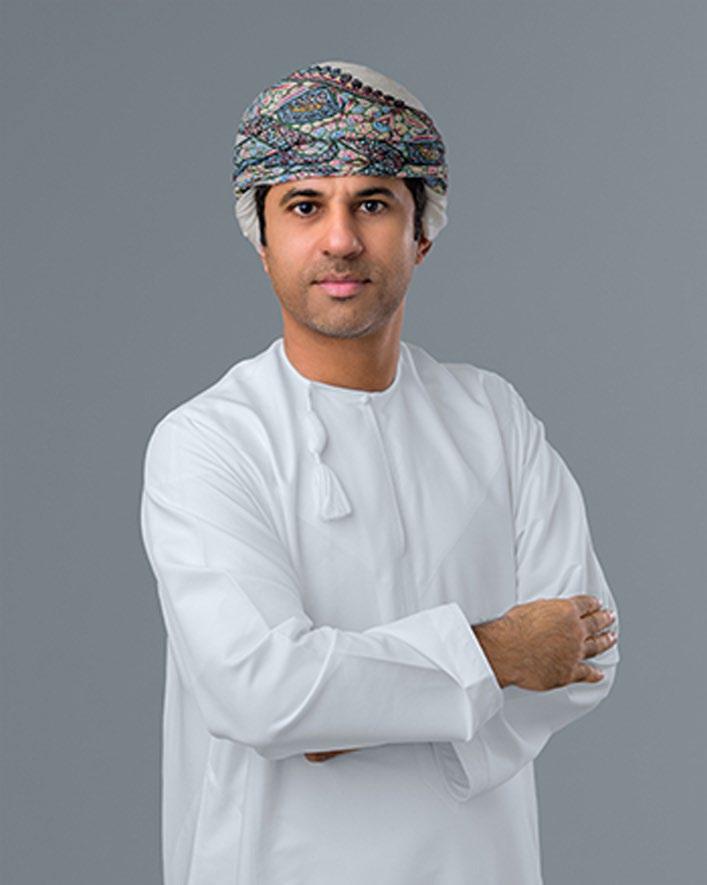



Abraj Energy Services SAOG performed well throughout the year 2024, with good steady results from the Drilling and workover services and a remarkable contribution from Well Services.
Abraj has successfully managed to grow outside Oman by commencing the WJO project on schedule for the provision of drilling rigs in Kuwait, reflecting its commitment to operational efficiency and project execution excellence. This achievement not only strengthens Abraj’s foothold in the regional market but also enhances its reputation as a reliable and capable service provider. The company has continued to grow in revenue, net profit, and retains highest market share. The operations in Kuwait have received best in class acknowledgement in overall operations for the Rigs.
With a solid track record and a growing presence, Abraj is wellpositioned to sustain its current growth trajectory and explore further expansion opportunities in the industry. Abraj is focused on providing services around Oil and Gas Wells, during and post wells construction. From building a wider service portfolio, Abraj now focuses on strategic top-tier services coupled with strong operational efficiency to realize maximum financial returns and sustainable growth. Abraj continues to benefit from the strength of long-term contracts in generating sufficient cash flow for growth.
In 2024, Abraj achieved a significant milestone by commencing its first international project in Kuwait (WJO), deploying two rigs in February and July respectively. This expansion has increased Abraj’s fleet to 27 drilling rigs, achieving 86 per cent utilisation for drilling rigs and 100 per cent utilisation for workover rigs. With a 29 per cent market share in drilling rigs, Abraj has solidified its position as the leader and national champion of Oman’s oilfield services sector.
Amidst challenging market conditions and with around 60 per cent of Abraj Rig contracts expiring between 2024 and 2025, the company has achieved over 6 per cent growth in secured contracts from a revenue standpoint. In addition, the contractual backlog remained very strong with the total value of secured contracts around RO591mn, a 13 per cent increase from 2023year end. The company retained the highest market share in Oman’s drilling market as well as pioneering in the Well Services market by offering high end products and services to clients.
Saif Al Hamhami CEO, Abraj Energy Services
OQ GAS NETWORKS PARTNER OF CHOICE
OQGN’s sustainability strategy supports Oman’s energy transition and Vision 2040, with a strong focus on emissions reduction.
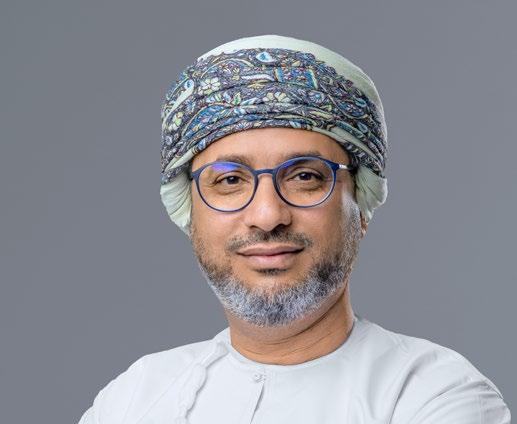
Mansoor Ali Al Abdali CEO, OQGN







OQGN demonstrated financial resilience and adaptability in 2024 with strong core performance and continued efficiency improvements. The company achieved a 2.9 per cent increase in profit, demonstrating strong operational performance and efficiency improvements, which were primarily driven by the commencement of Price Control 3 (PC3). This new regulatory framework introduced a more favourable operating expense allowance and weighted average cost of capital (WACC), which enhanced OQGN’s cash flow and income stability. Despite the absence of certain one-time gains that benefited 2023 (such as RO8.8mn from hedge termination and RO5.4mn from shareholder loan interest waiver), the company generated strong recurring profits, with a positive contribution from the RO5.3mn reimbursement under the Price Control 2 (PC2) allowance in 2024. Revenue and profit, remain robust, reflecting the company’s core operational strength and growth in the Regulated Asset Base.
OQGN’s sustainability strategy supports Oman’s energy transition and Vision 2040, with a strong focus on emissions reduction. In 2024, flaring decreased by 2 per cent and venting by 38 per cent, while the company began transitioning to electric vehicles. Strengthening transparency, the company published its first sustainability report and voluntarily disclosed ESG performance to MSX. Additionally, OQGN continues to integrate digital solutions to enhance energy efficiency and minimize environmental impact. These milestones reaffirm the commitment to responsible growth and our net-zero vision for 2050.
For the next five years, OQGN will focus on solidifying its position as a critical infrastructure provider by expanding its existing network, becoming the partner of choice in energy transition projects, and emphasizing its role in sustainability. Under its strategy, OQGN is set to expand core gas midstream services while advancing into hydrogen and Carbon Dioxide (CO2) transportation. As part of Oman’s green hydrogen strategy, the Company has signed an MoU with Hydrom in 2024 and was appointed the National Infrastructure Provider for Hydrogen (H2) pipelines. The company advises on regulatory and techno-commercial aspects of CO2 transport, working under a Memorandum of Understanding with Oxy Oman to develop a CCUS value chain. It also collaborates with Shell, OQ, and PDO on the Blue Horizons low-carbon and ammonia pre-FEED project to explore bankable commercial models. In 2024, OQGN partnered with Omantel to deploy satellite technology for long-range surveillance and third-party intrusion detection.



OERLive DX Awards 2025
o Technology Pioneer of the Year
o Smart Government Initiative of the Year
o Technology CEO of the Year
o Leaders in Al Integration
o 5G Transformation Leaders
o Excellence in Oil & Gas Digital Transformation
o Leaders in Space Technology & Innovation
o Smart Tech Project of the Year
o Fintech Solutions Provider of the Year
o Excellence in Digital Transformation
o Leaders in Digital Banking
o Leaders in Data Management & E-Government Solutions
o Pioneers in Digital Islamic Banking
o Excellence in Cybersecurity Solutions
o Cloud Innovators of the Year
STRATEGIC PARTNERS

ASSOCIATE PARTNER

KEY FOCUS AREAS
Artificial Intelligence
Computing
Core Banking
Cybersecurity
Big Data
Super Apps
Internet of Things
Digital Governance
AUTOMOTIVE PARTNER
SHERATON OMAN HOTEL
PROGRESSIVE PARTNERSHIP
The Oman Petroleum and Energy Show and Oman Sustainability Week 2025 witnessed the launch of the Oman Net Zero Centre and the announcement of the Energy Efficiency Awards
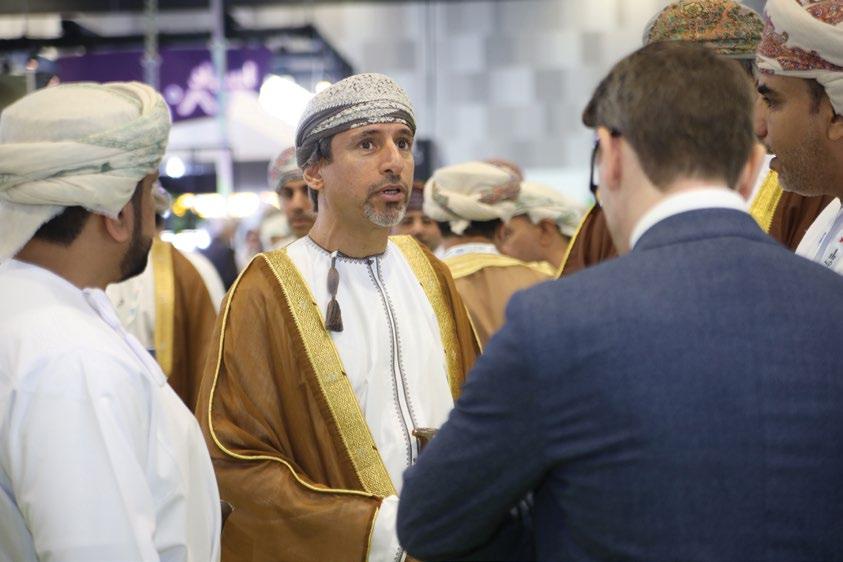
Demonstrating the Sultanate of Oman’s dedication to sustainable development and energy sector transformation, the Oman Petroleum and Energy Show and Oman Sustainability Week for 2025 were officially launched on May 12, 2025, at the Oman Convention and Exhibition Centre.
The event was held under the supervision of the Ministry of Energy and Minerals and continued until May 14. The opening ceremony was held under the patronage of His Highness Sayyid Taimur bin Asaad Al Said, with the presence of several distinguished ministers, ambassadors, senior officials, and representatives from various concerned entities, highlighting the growing national interest towards a sustainable and balanced future.
The event, organised by CONNECT (Oman Exhibitions Organising Company) and hosted by Petroleum
Development Oman (PDO), brought OSW and OPES together for the first time as an integrated platform, highlighting the importance of securing and sustaining energy while showcasing the Sultanate’s commitment to achieving a balanced and progressive future. Establishing their co-location as an annual event moving forward, this edition represented the largest gathering of its kind ever hosted in the Sultanate.
Commenting on the significance of the events, His Excellency Eng. Salim bin Nasser Al Aufi, Minister of Energy and Minerals, stated, “OPES and OSW 2025 are nationally significant events that underscore the Sultanate of Oman’s ongoing commitment to advancing sustainable energy, and achieving a balance between innovation, economic growth, and environmental preservation. The Oman Petroleum and Energy Show 2025 reinforces the country’s vision for a sustainable
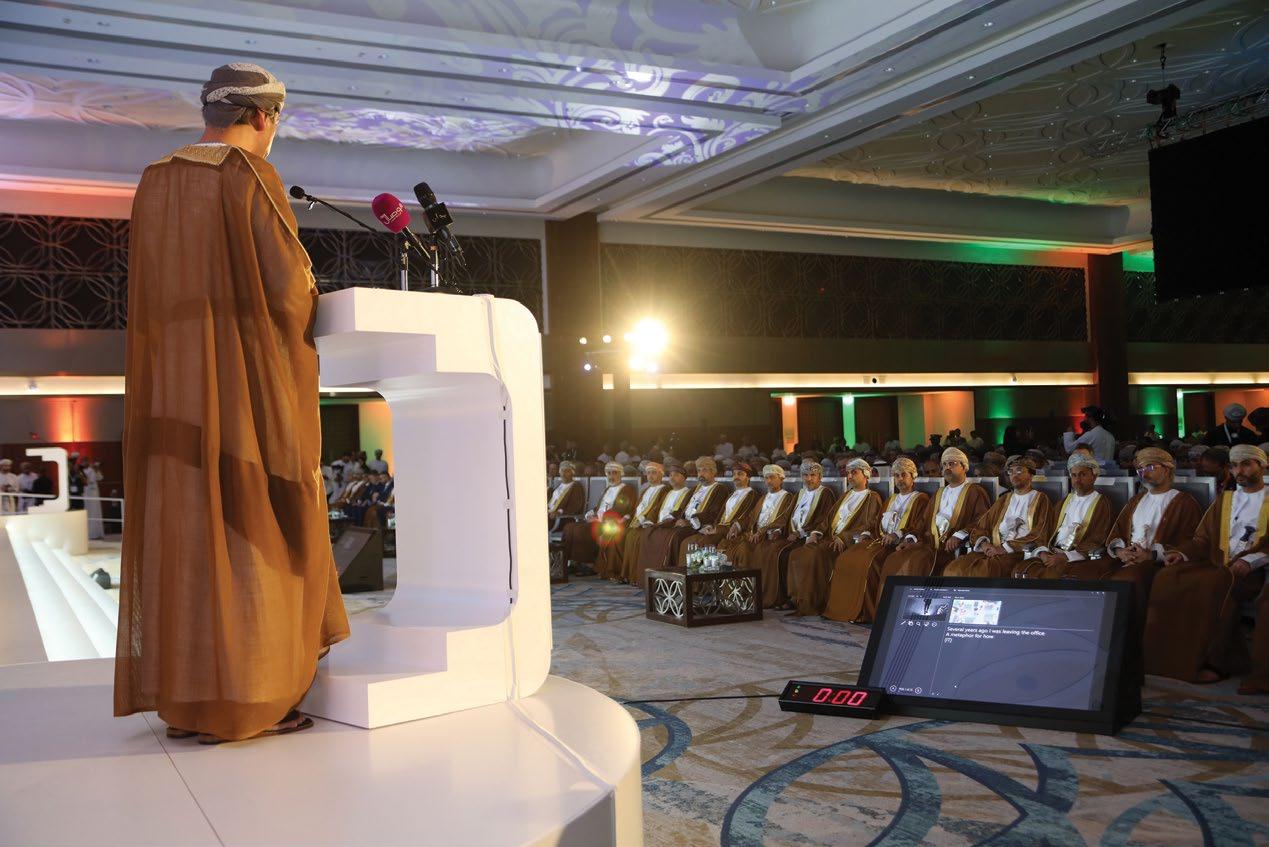
Week 2025 is closely aligned with Oman Vision 2040 and the United Nations Sustainable Development Goals, playing a vital role in promoting the green circular economy and achieving the nation’s ambition to reach net-zero carbon emissions by 2050. Together, these events serve as dynamic platforms for knowledge exchange, fostering innovation, and building strategic partnerships— driving national capacity development and enhancing economic resilience.”
Eng. Mohammed bin Ali AlAghbari, Manager of External
Affairs, Government Relations and Communications at Petroleum Development Oman, said, “Our participation in OPES and OSW underscores PDO’s strategic role in advancing the national transition toward clean energy and sustainable
participation in OSW 2025, stating, “We were pleased to participate in OSW 2025 with a dedicated Swiss Pavilion, showcasing 17 leading Swiss companies offering cuttingedge sustainable solutions across cleantech, construction, energy,

continued dedication to impactful social investment—reflecting our core values in empowering national talent. These events serve as a key platform to demonstrate our contributions and share our experience in shaping the future energy landscape of the Sultanate of Oman, in full alignment with PDO’s journey of Transformation and the goals of Oman Vision 2040 and in support of maximising in-country value across our operations.”
HE Dr. Thomas Oertle, Ambassador of Switzerland to Oman, shared his thoughts on the Swiss Embassy’s
and academia further underscores our strong commitment to fostering collaboration and exchange between Oman and Switzerland – two likeminded nations. During OSW 2025, an innovative artwork by Swiss artists will also be unveiled, symbolizing our shared vision for a sustainable future.”
Launch of Oman Net Zero Centre
His Highness, the patron of the ceremony, also inaugurated the Oman Net Zero Centre, which operates under the Ministry of Energy and Minerals. The Centre focuses on several key
areas, particularly the preparation and continuous updating of the national plan to achieve net-zero emissions. It also oversees the implementation of relevant projects and initiatives, offering support and consultation to institutions and stakeholders to help achieve national net-zero targets. In addition, the Centre is responsible for defining and updating Oman’s national strategy to reach carbon neutrality by 2050. It provides technical guidance and support to both government bodies and private sector organisations on net-zero transition and energy efficiency. The Centre also monitors progress, promotes awareness, and builds capacity to ensure the effective implementation of related programs and initiatives. These efforts reflect a firm belief in addressing climate change and advancing clean, renewable energy solutions. The initiative aligns with the Sultanate of Oman’s commitment to achieving net-zero carbon emissions by 2050, and have also accelerated the development of the renewable energy sector, created supportive legal frameworks and policies, and introduced incentives to attract foreign investment, support local industries, and localize clean energy technologies.
Commenting on their participation in OPES 2025, Salim Al Harthy, CEO, MB Petroleum Services, stated, “Mohammed Al Barwani Petroleum Services is proud to participate in the 2025 OPES Exhibition, representing our expertise in drilling and workover, drilling fluids and showcasing our latest capabilities in e – line services. The event offers a valuable platform to highlight the strength of our operations, including a diverse range of European companies operating under the MBPS umbrella—many of which are making their presence known here in Oman.”
The unified platform, consisting of distinguished and integrated themes, aims to enhance forward-looking dialogue on resource sustainability, environmental preservation, and progress in the energy sector. The theme of Oman Sustainability Week 2025 was ‘Sustainable Growth –
Balancing Progress and Preservation’, while the theme for Oman Petroleum and Energy Show 2025 was ‘Navigating the Energy Transition through Innovation in Oil and Gas’.
Throughout the week, OPES and OSW 2025 featured dynamic programs spanning exhibitions, strategic conferences, C-level roundtables, technical workshops, and site visits. By convening a global community of leaders, innovators, and policymakers, the event provided a powerful catalyst to accelerate Oman’s progress toward economic growth and diversification, climate action, and technological advancement—reaffirming its alignment with Oman Vision 2040, the Net Zero Emissions target by 2050, the United Nations Sustainable Development Goals (UN SDGs), and the Paris Climate Agreement.
Beyond their core industry focus, OPES and OSW 2025 collectively served as a powerful showcase of the Sultanate’s achievements, reinforcing its position as a key player in the energy sector and a regional pioneer of sustainable progress. Anticipating a robust turnout of more than 30,000 visits from over 50 countries, with participation from more than 350 exhibiting companies and 2,400 delegates representing diverse global sectors, the events underscored Oman’s growing prominence as a hub for international dialogue on energy and sustainability.
Positioned as key pillars of knowledge exchange within the week’s agenda, OSW Talks and OPES Talks—both running from May 12 to 14—offered dynamic, free-to-attend CPD-accredited platforms that foster strategic dialogue and professional advancement. OSW Talks delivered sessions focused on emerging sustainability practices, breakthrough innovations, and circular economy strategies—providing participants with actionable insights to navigate the evolving global sustainability landscape.
Simultaneously, OPES Talks convened global CEOs, senior government leaders, and energy pioneers for high-impact discussions on critical
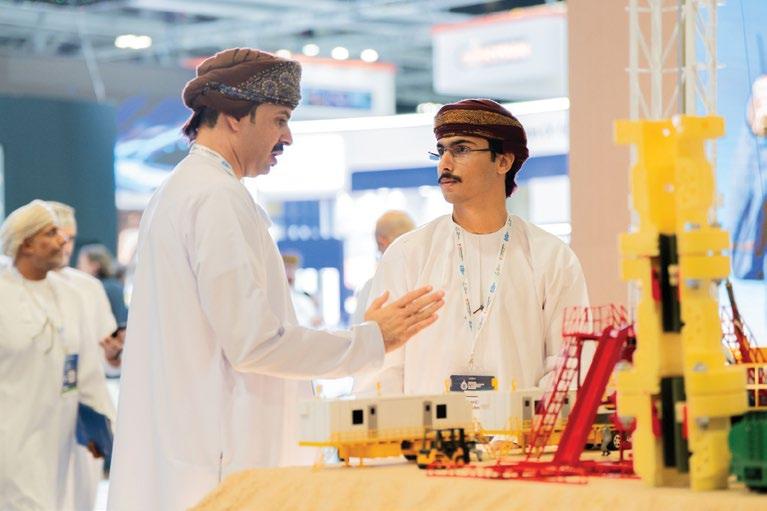
topics such as the energy transition, renewable integration, digitalisation of operations, and the future of LNG in Oman—reinforcing OPES’s role in cultivating a knowledge-driven, innovation-focused energy ecosystem.
Anchoring the week’s high-level strategic discourse, OSW and OPES each featured exclusive C-Level Roundtables governed by Chatham House Rule and facilitated by Ernst & Young (EY), offering closed-door forums for leaders to engage in impactful, solution-driven dialogue. The week’s agenda also featured a series of flagship conferences and specialist platforms that deepen sectoral engagement and cross-industry collaboration. On the sustainability front, the International Sustainability Resources & Technology Conference (ISRTC)—a cornerstone of OSW 2025 organised by Oman Environmental Services Holding Company - be’ah and programmed by Economist Impact—took place on May 12–13, convening influential stakeholders to explore post-COP29 sustainability strategies, sustainable innovation, and economic diversification. In parallel, OPES 2025 hosted the SPE Conference at OPES, programmed by the Society of Petroleum Engineers (SPE), from May 12–14, offering a dedicated forum for in-depth technical discourse on enhanced recovery methods, digital transformation, carbon capture, and decarbonisation.
Further amplifying the experiential dimension of the week, OSW 2025 spotlighted the future of sustainable transportation through its dedicated Future Mobility platform, showcasing next-generation electric and hydrogen vehicle solutions. Complementing this initiative, on-site electric vehicle (EV) test drives, delivered in collaboration with leading automotive partners, offer attendees a hands-on experience of clean mobility advancements— underscoring sustainable transport as a critical pillar of climate action.
Meanwhile, His Excellency Mohsin bin Hamad Al Hadhrami, Undersecretary of the Ministry of Energy and Minerals, sponsored the Majd Local Content Awards ceremony. These awards aimed to enhance the value of local content, focusing on three main pillars: local manufacturing, human capital development, and the implementation of integrated programs with both economic and social impacts. These pillars were carefully selected as they represent the essence of empowerment and the foundation for achieving effective national sustainability.
His Excellency the Undersecretary of the Ministry of Energy and Minerals also announced the launch of a new award, the ‘Oman Energy Efficiency Award,’ aimed at encouraging innovative practices in rationalising energy consumption and motivating institutions and companies to adopt solutions and
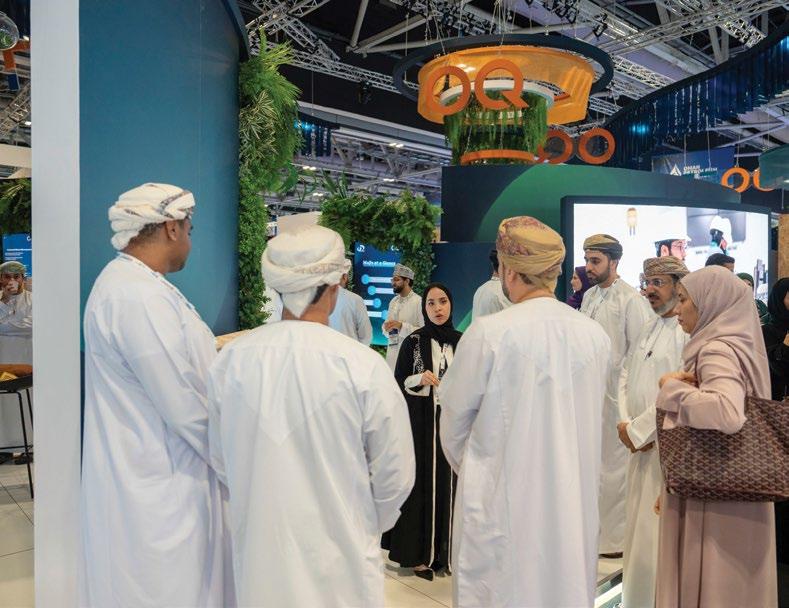

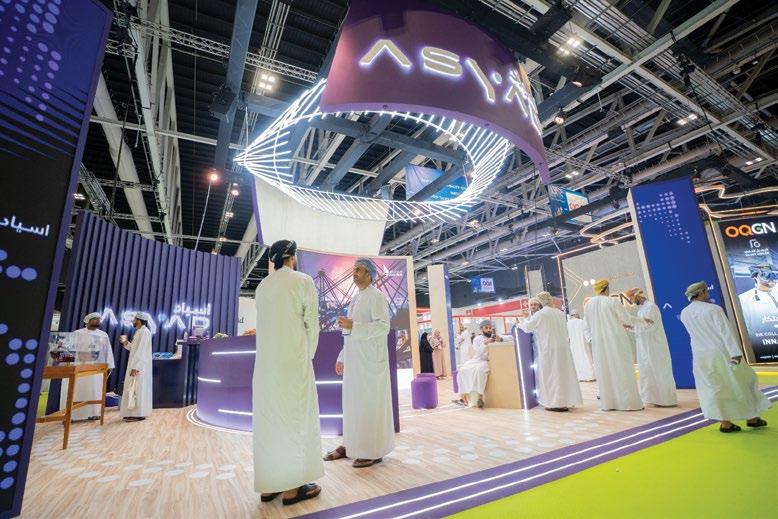
technologies that enhance efficiency and reduce emissions. This award will serve as an important step toward further consolidating the concept of environmental sustainability across various production and service sectors.
Extending the engagement beyond the exhibition floors, OPES and OSW have also integrated immersive site visit programs to provide participants with insights into Oman’s energy and sustainability landscape. Prior to the official inauguration, OPES 2025 hosted a dedicated Field Trip to strategic energy sites, offering participants a deeper understanding of the region’s oldest geological formations and their pivotal role in the development of hydrocarbon systems.
Complementing this initiative, the SEG Workshop—organised by the Society of Exploration Geophysicists—explores the evolving role of geophysics in enhancing hydrocarbon production through advanced seismic techniques, integrated reservoir monitoring, and field development optimisation. Concluding the week’s activities, the OSW Site Visits program on May 15, offered registered participants exclusive access to landmark sustainability projects across the Sultanate, providing real-world context to the themes explored during the week.
At OPES 2025, themed ‘Navigating the Energy Transition through Innovation in Oil and Gas’, more than
300 exhibiting companies from over 26 countries showcased cutting-edge technologies and strategies shaping the future of oil, gas, and energy transition. Over 1,500 delegates and 300 expert speakers offered insights into advanced recovery techniques, digital transformation, carbon capture, and the role of LNG in a decarbonised world.
Day 1 saw the SPE Conference, led by the Society of Petroleum Engineers, deliver a powerful start with discussions on decarbonisation and innovation. Meanwhile, freeto-attend OPES Talks sessions— featuring global CEOs and energy pioneers—are providing vital insights into renewables integration and operational digitalisation, continuing through the final day. The exclusive OPES C-Level Roundtable, held under Chatham House rules and facilitated by Ernst & Young, has also drawn C-Suite Executives and senior government officials to shape the future of global energy collaboration.
Across the hall, Oman Sustainability Week 2025, themed ‘Sustainable Growth – Balancing Progress and Preservation,’ continued to shine a spotlight on the critical issues of climate action, green finance, and ecomobility. Featuring 120 plus exhibitors from 10 countries, 200 speakers, and 300 plus delegates, OSW remained a must-attend event for professionals and all changemakers from students to government.
The International Sustainability Resources & Technology Conference (ISRTC) concluded its main sessions with forward-looking discussions on sustainable innovation and economic diversification post-COP29. The OSW C-Level Roundtable, with senior leaders convened to discuss green finance and the energy transition, cementing OSW’s role in driving sustainability leadership. Wrapping up OSW 2025, on May 15, the OSW Site Visits offered a behind-the-scenes look at Oman’s leading sustainability projects—giving participants a rare glimpse into the country’s efforts to build a resilient, eco-friendly future.
REWARDING EXCELLENCE
Oman Sustainability Week (OSW) Awards 2025: Honouring trailblazers driving Oman’s sustainable future
Under the patronage of His Excellency Eng. Salim bin Nasser Al Aufi, Minister of Energy and Minerals, the recognised organisations of Oman Sustainability Week (OSW) Awards 2025 have been announced. The event carried an inspiring message – sustainability is not just a goal, it is a national imperative. The OSW Awards, part of Oman Sustainability Week—overseen by the Ministry of Energy and Minerals—marked the official launch of the 2025 edition. The evening was dedicated to honouring pioneers of sustainability.
Co-organised by be’ah (Oman Environmental Services Holding Company) and CONNECT (Oman Exhibitions Organising Company LLC), the ceremony took place at the Oman Convention and Exhibition Centre. The gathering brought together senior government officials, industry leaders, and sustainability experts to celebrate and elevate the organisations driving Oman’s environmental and economic transformation.
The OSW Awards serve as a powerful catalyst, propelling organisations toward more transparent, accountable, and future-focused operations. Rooted in international sustainability standards, including the Global Reporting Initiative (GRI), and aligned with Oman Vision 2040, the UN Sustainable Development Goals (UN SDGs), and the Sultanate’s ambitious Net Zero 2050 pledge, the awards framework ensures a rigorous, credible evaluation of ESG leadership across sectors. Commenting on the event, HE Mohsin bin Hamad Al Hadhrami, Undersecretary of the Ministry of Energy and Minerals, stated, “We are launching the coming together of Oman Sustainability Week and the Oman Petroleum & Energy Show 2025 with
the Oman Sustainability Week Awards ceremony, which embodies our vision to continue strengthening support for sustainability, alongside our commitment to developing the energy sector, diversifying its sources, and enhancing its security and stability.”
He added, “This event reflects our commitment to promoting a culture of sustainability within our institutions and society. We take pride in the ongoing partnership between the public and private sectors to advance this direction. Honouring pioneering initiatives in the fields of environment, society, governance, and sustainable mobility is a pivotal step toward building a more resilient and prosperous future.”
He further emphasised, “The continuity of this movement enhances Oman’s role in supporting the sustainability journey and encourages organizations to adopt innovative practices with a positive impact, in line with the goals of Oman Vision 2040 and the national ambition to achieve net-zero by 2050.”
Speaking on the occasion, Dr. Mohab Ali Al Hinai, Vice President of Sustainability and Circular Economy at be’ah, stated, “As co-organisers of the fourth edition of the Oman Sustainability Week Awards, we take pride in providing a unique platform that encourages organisations to integrate sustainability and responsibility into their corporate strategies, contributing to the development of a sustainable business community in Oman. Since the launch of the initiative in 2022, we have witnessed remarkable growth in the number of participating organisations, increasing from 12 to 29 in 2025.
Many of these organisations have
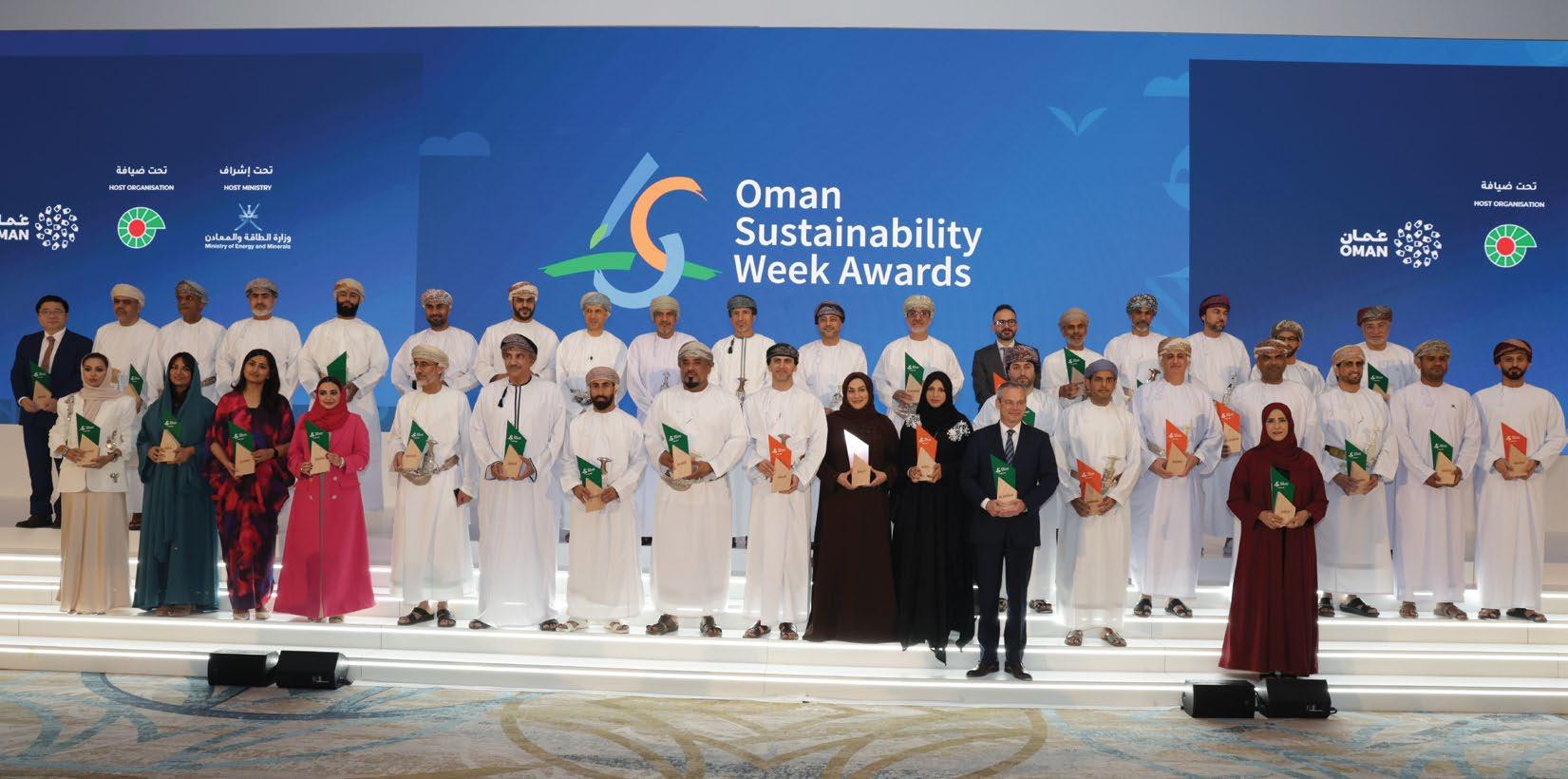
shown significant improvement, with some raising their scores by over 30%, and one SME achieving a 70% increase. This continuous growth reflects the commitment of Omani institutions to adopt best sustainability practices, and we are proud to support this movement, in alignment with Oman Vision 2040.”
In 2025, the awards continued to focus on two pivotal categories: Environment, Social, and Governance (ESG) and Eco-Mobility—each representing a strategic pillar in Oman’s sustainable development roadmap. The ESG category, developed in collaboration with the Center for Sustainability and Excellence (CSE) in Chicago, received 29 standout submissions across four
subcategories: Academia, Government, Small Business, and Medium to Large Enterprises. The submissions
University of Technology and Applied Sciences were recognized.
while 44.01 was recognized in the Bronze segment.

recognition was awarded to Asyad Group, Petroleum Development Oman, SLB, Sohar Aluminium, and Veolia. Gold honours went to Daleel Petroleum, Destination Sustainability, Oman Electricity Transmission Company, Oman Petro Environmental Services Company, and OQ Group. Silver recipients included Bank Muscat, Bank Nizwa, BP Oman, OQ8, Green Universe Enterprise, Gulf Energy, Oman LNG, Omantel, Ominvest, OQGN, Special Oilfield Services, and Sultan Qaboos University.
In the Bronze segment, the Ministry of Transport, Communications and Information Technology, Modern College of Business and Science, University of Nizwa, and the
15 finalists, the category emphasised scalable solutions for sustainable mobility. Judging was conducted by an expert panel representing key regulatory and strategic bodies— including the Ministry of Energy and Minerals, the Environment Authority, and the Authority for Public Services Regulation—reflecting the growing importance of this sector and the involvement of multiple stakeholders in its development.
In the Eco Mobility category, Platinum honours went to Electric Vehicle Oman – EVO and Shell Development Oman. Gold recognition was awarded to ABB, Oman Shell Marketing, and MWASALAT. Silver recipients included EnvirOM Solutions, OQ, Audi Oman, and Petroleum Development Oman,
of the awards. Experienced explorer Mark Evans captivated the audience with his introduction of the Jewel of Arabia expedition. Her Excellency Dr. Liane Saunders, the British Ambassador to the Sultanate of Oman, brought attention to the British Embassy Hackathon, while Shamsa Al Maskiry from HydroAI showcased the winning idea from the Connecting Futures – Challenges of Sustainability Hackathon. Eng. Abdullah Ali Al Busaidi, Director General of the Oman Logistics Centre at the Ministry of Transport, Communications and Information Technology, introduced the Eco-mobility category, and Dr. Mohab Ali Al Hinai, Vice President of Sustainability and Circular Economy at be’ah, presented the Environment, Social, and Governance (ESG) category.
CREATING VALUE
Hydrom, OPAZ AND ACME group sign agreements to integrate Duqm Hydrogen Project into national portfolio
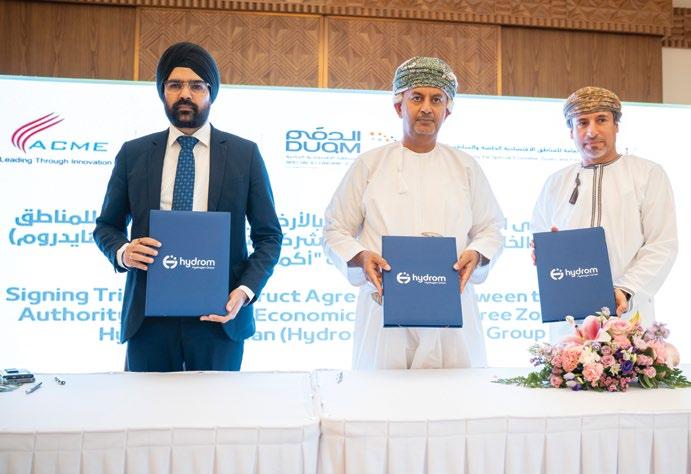
Hhave signed a Project Development Agreement and Usufruct Agreement for the incorporation of Phase 2 and 3 of ACME’s green hydrogen and ammonia project in the Special Economic Zone at Duqm (SEZAD). The agreements mark the formal onboarding of one of the Sultanate’s earliest hydrogen initiatives into Hydrom’s portfolio, concluding the consolidation of all commercial hydrogen developments under a single national structure.
The agreements were signed by HE Eng. Salim bin Nasser Al Aufi, Minister of Energy and Minerals and Hydrom’s Chairman along with HE Sheikh Dr. Ali bin Masoud Al Sunaidy, Chairman of OPAZ, and Gursharan Jassal, Country Manager for ACME. The two new phases span a combined area of 80 square kilometres and are projected to produce around 71,000 tonnes of green hydrogen and 400,000 tonnes of green ammonia annually per phase. This expansion follows the commencement of construction for ACME’s Phase 1 with an output of 100,000 tonnes of green ammonia annually, backed by an offtake agreement with YARA BIRKELAND AS. With all phases completed, ACME
“The formal integration of ACME’s project into Hydrom’s framework marks a significant milestone in Oman’s green hydrogen journey. This step not only consolidates Oman’s early initiatives but also demonstrates our commitment to structured and scalable development. By unifying all major projects under a cohesive national strategy, we are boosting investor confidence and reaffirming Oman’s position as a competitive player in the global green hydrogen market.”
The agreement comes as Hydrom advances its third land auction round, highlighting the sustained momentum of Oman’s hydrogen strategy. With a complete portfolio now in place and the regulatory, infrastructure and human capital enablers progressing as planned, the sector is moving forward with the clarity and coordination needed to meet global offtake demand and realise Oman’s long-term ambition to become a leading global exporter of green hydrogen. Eng. Ahmed bin Ali Akaak, CEO of SEZAD, said the agreements reflect Duqm’s growing appeal as a hub for green hydrogen and ammonia investment. He affirmed the attention given to the
green hydrogen sector in the Special Economic Zone at Duqm as part of the zone’s strategy (2025–2030), and the administration’s efforts to adopt green industrial projects in line with Oman Vision 2040 and the strategy of the Sultanate of Oman to achieve net-zero carbon emissions by 2050.
Gursharan Jassal, Country Manager for ACME in Oman expressed, “We are honoured to sign this landmark agreement for the development of the next phase of the green ammonia project in Duqm — a pivotal step in advancing Oman’s transition to a sustainable energy future. This milestone reflects our shared commitment to achieving Oman Vision 2040 and reinforces the Sultanate’s growing role in the global green hydrogen economy. We extend our sincere gratitude to the Public Authority for Special Economic Zones and Free Zones, the Ministry of Energy & Minerals, Hydrom, and SEZAD for their continued support and partnership. Together, we aim to create lasting value for Oman and the wider region as we progress towards a cleaner, more resilient future.”
With this signing, Hydrom’s awarded portfolio of large-scale green hydrogen projects in the Governorates of Al Wusta and Dhofar rises to nine, representing over $50bn in expected investment commitments and a combined production capacity of nearly 1.5 million tonnes of green hydrogen per annum by 2030. Enabled by nearly 35 GW of renewable energy, these projects are coordinated within a single national framework designed to deliver at scale and aligned with global demand. Through this structured portfolio, Hydrom continues to advance Oman’s positioning as one of the most advanced and investmentready hydrogen ecosystems globally. As global markets move from hydrogen ambition to action, Oman is delivering a credible platform that enables scale, certainty, and long-term offtake. With legacy developments now integrated, new projects underway, and Round 3 in progress, the Sultanate offers a complete value chain, from resource to infrastructure to export.
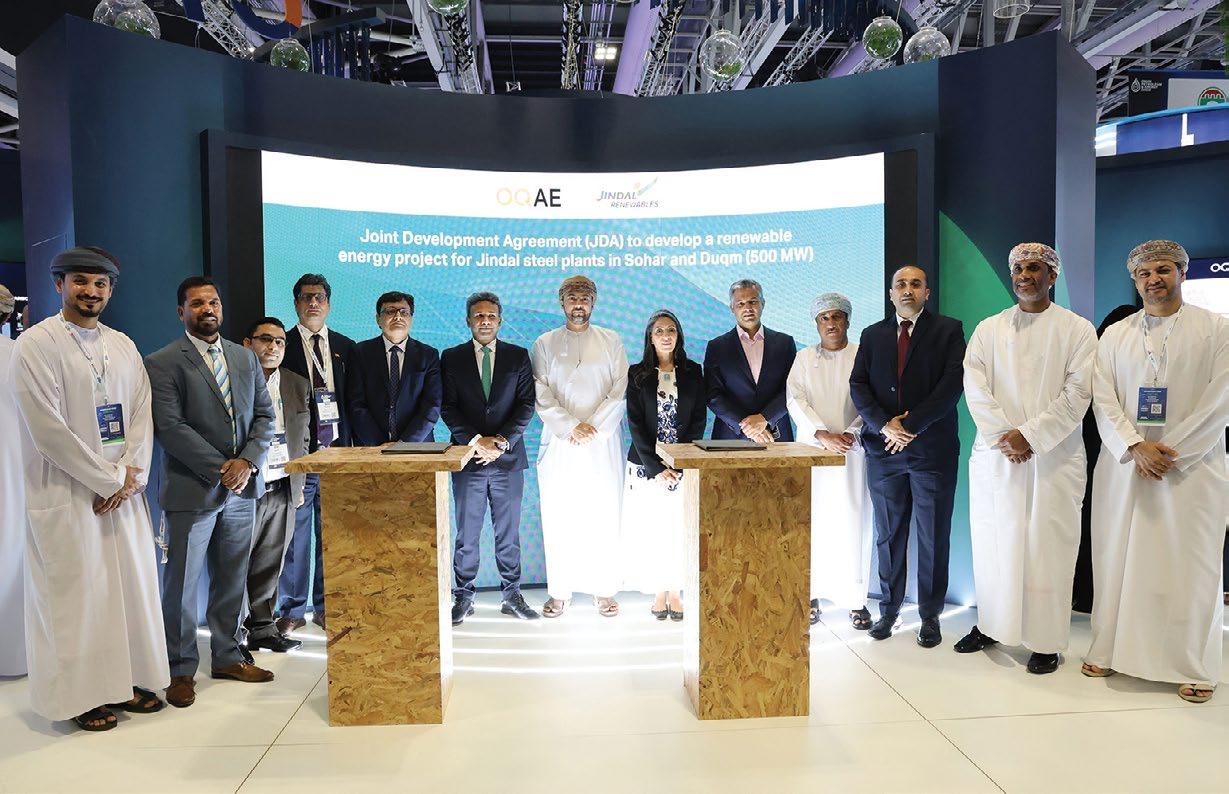
Jindal Renewables and OQ Alternative Energy sign Joint Development Agreement to advance integrated renewable power projects in Oman
In a landmark move to accelerate Oman’s transition to clean energy, Jindal Renewables, part of the $25bn India-based Jindal Group, and OQ Alternative Energy (OQAE), the Sultanate’s designated national champion for renewable energy, have signed a Joint Development Agreement (JDA) to collaborate on the development, ownership, and operation of large-scale renewable energy assets in the country.
The agreement was formally signed by Harssha Shetty, CEO of Jindal Oman, and Najla Zuhair Al Jamali, CEO of OQ Alternative Energy, at a ceremony held in Muscat during Oman Sustainability Week.
This strategic partnership marks a significant milestone in supporting the goals of Oman Vision 2040, the national roadmap for economic diversification, sustainability, and green industrialisation. Both companies expressed their deep gratitude to His Majesty Sultan Haitham bin Tarik for his visionary leadership in guiding Oman’s transition
toward a knowledge-based, low-carbon economy. The partnership reaffirms their commitment to contributing meaningfully to His Majesty’s vision of a more sustainable and prosperous Oman.
Under the JDA, both companies will co-develop Integrated Energy Valleys (IEVs) — a flagship configuration pioneered by Jindal Renewables — to deliver 24x7 firm, dispatchable renewable power by combining solar, wind, and advanced energy storage technologies. As part of its future roadmap, Jindal Renewables plans to develop the first Integrated Energy Valley (IEV) in Oman to deliver renewable power to a 5 MTPA green steel plant proposed by Jindal Steel Duqm, a sister concern of Jindal Renewables. Additionally, a separate IEV is planned to supply 300 MW of continuous clean power to the operational 2.4 MTPA Jindal steel plant in Sohar, enabling the decarbonisation of Jindal’s existing industrial footprint in the Sultanate.
Harssha Shetty, CEO of Jindal
Oman, said, “This agreement is a powerful endorsement of our shared commitment to decarbonising heavy industries and creating scalable, resilient clean energy ecosystems. Together with OQAE, we aim to make Oman a leading player in the global green energy value chain.”
Najla Zuhair Al Jamali, Chief Executive, OQ Alternative Energy, commented, “This agreement underscores OQAE’s commitment to accelerating investable, utility-scale renewable energy projects that align with Oman’s long-term decarbonisation agenda. By enabling clean power for strategic industries, we are not only supporting economic diversification under Vision 2040, but also creating tangible opportunities for sustainable investment and value creation in the region’s energy transition.”
Jindal Renewables is committed to fostering diversity, inclusivity, and in-country value, and brings deep capabilities in project development, finance, execution, and asset management to the partnership.
PREMIUM PERFORMANCE
Changan CS35 Plus Limited delivers style, comfort, and smart technology

The Changan CS35 Plus Limited delivers a premium compact SUV experience that blends elegance, innovation and performance. As the most refined version in the CS35 Plus range, it is designed for individuals who appreciate thoughtful details and modern engineering without venturing into the high-end luxury segment features. Now available with monthly installments starting

at just RO111, the CS35 Plus Limited offers exceptional value for those seeking a stylish and feature-rich compact SUV. With a 20 per cent down payment, salaried individuals can avail of financing options for up to six years, subject to bank approvals. This limited-time offer makes it easier than ever to own a smart, comfortable, and technology-driven SUV. From the exterior, the CS35 Plus Limited makes a striking first impression. The bold
grille, automatic LED headlights and 18-inch alloy wheels convey a sense of movement and strength. A panoramic sunroof adds an open, airy feel to the cabin, offering a more enjoyable atmosphere whether on long drives or short commutes.
Inside, the attention to detail continues with premium leather upholstery, a powered driver’s seat, and rear reading lights. The interior
feels both modern and welcoming. Drivers are greeted by a 7-inch LCD instrument cluster and a 10.25-inch infotainment touchscreen, forming a seamless digital hub. Technology highlights include built-in navigation, wireless phone charging, remote engine start, and keyless entry, making every journey more convenient and connected. Beneath the bonnet lies a responsive 1.4-litre turbocharged engine, paired with a seven-speed dual-clutch transmission. This combination delivers a smooth and efficient driving experience, ideal for navigating urban traffic as well as
Brake, Front Collision Warning, and a 360-degree camera system. These additions provide greater peace of mind and help create a more secure driving environment.
“Changan is redefining what drivers can expect from a compact SUV,” said a spokesperson for Changan Oman. “With the CS35 Plus Limited, we are offering a vehicle that goes beyond expectations, blending high-end features with everyday functionality and standout design.”
For those who appreciate modern

open roads. The refined suspension and tuned steering ensure that the CS35 Plus Limited handles every situation with poise and confidence.
Safety is another area where this model stands out. In addition to standard features such as dual front airbags, electronic stability control, anti-lock braking with electronic brakeforce distribution and hill hold control, the Limited variant includes curtain airbags, Automatic Emergency
design and dependable performance, the CS35 Plus 1.4L Trend is also a compelling choice. It features the same dynamic powertrain and advanced technology found in the Limited, while offering a wellbalanced blend of practicality and everyday comfort. Whether you are drawn to the luxurious appeal of the Limited or the reliable versatility of the Trend, the CS35 Plus series offers a smart and stylish way to elevate your everyday drive.
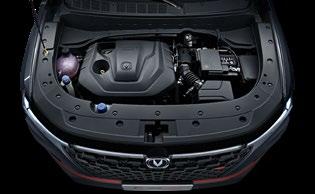



REFINED COMFORT
Elevate your everyday drive with Bestune B70 Comfort offer
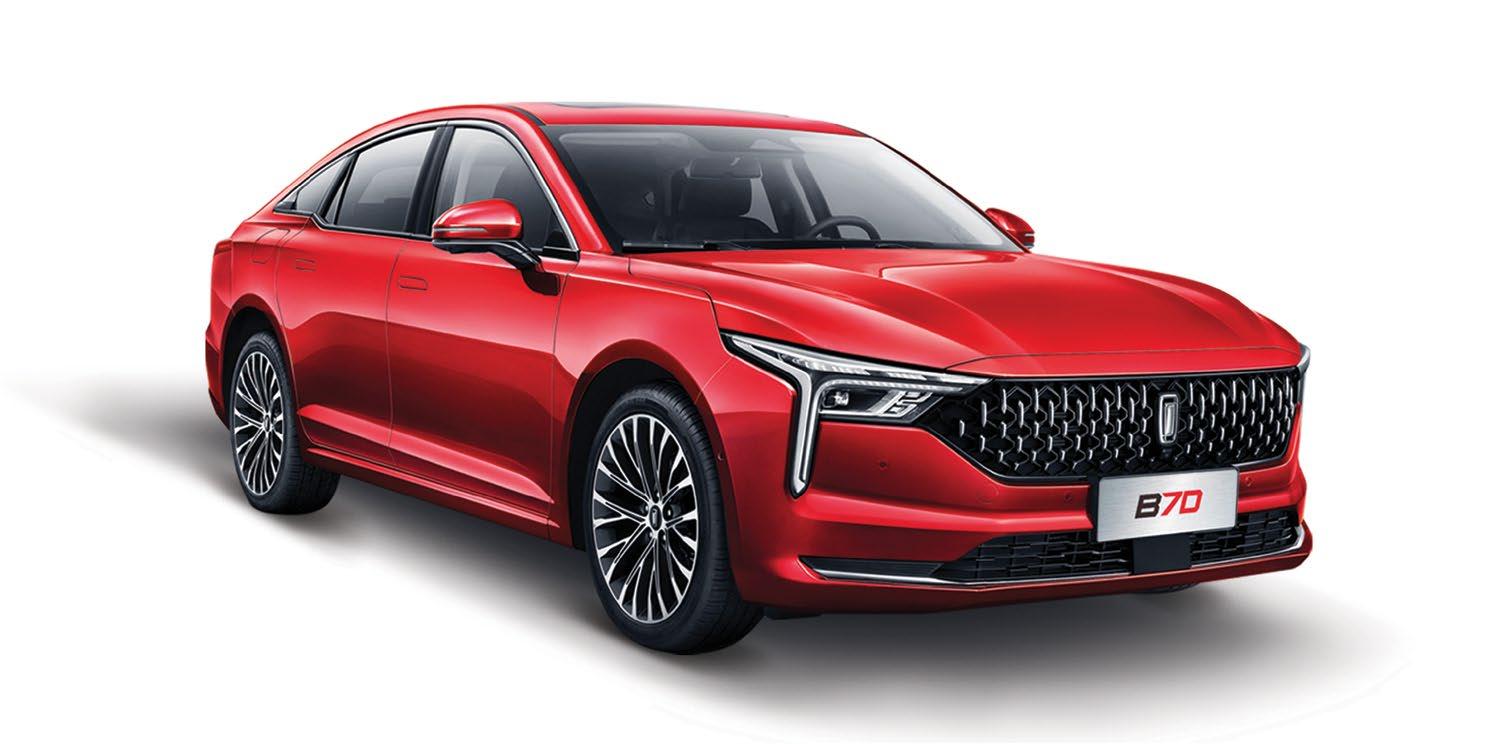
Gulf Great Sands LLC, the official distributor of Bestune in Oman, has unveiled an exceptional Eid Al Adha promotion on the Bestune B70 Comfort. Available for a limited time at a special cash price of just RO7150, inclusive of VAT, this offer brings together affordability, premium features, and comprehensive ownership benefits. In addition, each model is backed by a manufacturer’s warranty of six years or 250,000 km, giving customers confidence in the durability and support behind their investment. This limited time offer is the perfect opportunity to step into a refined sedan at a price that reflects both practicality and generosity.
The Bestune B70 Comfort is a
thoughtfully crafted sedan that merges elegant design with dynamic performance. Its sleek profile is enhanced by LED headlights and daytime running lights, and 18-inch alloy wheels, while a panoramic sunroof brings an open, airy feel to the cabin. Inside, the atmosphere is equally refined, offering leather seats, a 6-way power-adjustable driver’s seat, and a multifunction leatherwrapped steering wheel. Comfort is further elevated by dual-zone automatic climate control, allowing personalised temperature settings for driver and passenger alike.
Safety is a core focus in the Comfort variant, with a suite of protective technologies including ABS, EBD, Brake Assist, Electronic Stability
Control, and an Electronic Parking Brake with Auto Hold. It is also equipped with front and side airbags, as well as a rear-view camera, providing peace of mind in every journey. For daily convenience, features such as keyless entry, pushbutton start, cruise control, and a 6-speaker infotainment system ensure the B70 Comfort is as intuitive as it is enjoyable to drive. Under the bonnet, the 1.5L turbocharged engine delivers 158 horsepower and 258 Nm of torque, paired with a 7-speed dual-clutch transmission for a responsive and efficient drive.
Bestune B70 Limousine
The Limousine variant of the Bestune B70 stands out for its impressive fusion of design sophistication
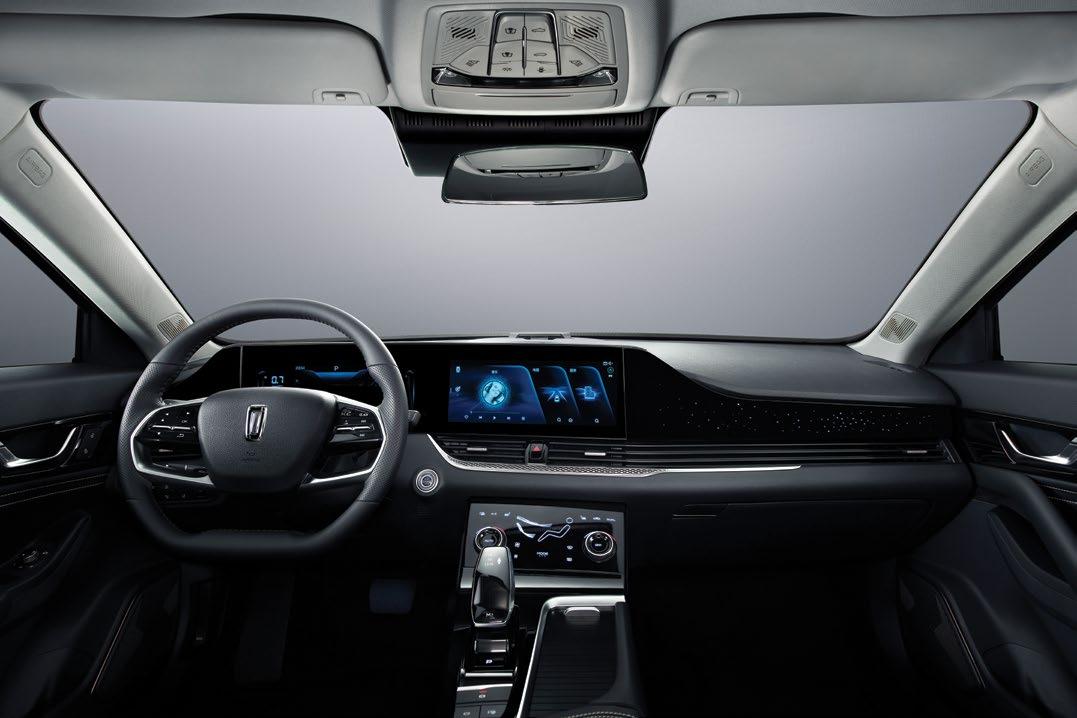
and performance upgrades. Its commanding road presence is accentuated by 19-inch alloy wheels, intelligent high-beam control, puddle lamps, rhythmic rear LED lights, and a sporty square tailpipe, combining elegance with athletic appeal.
The interior of the B70 Limousine is tailored for an executive feel, with ambient lighting, including a starry sky headliner and door accent lights, creating a calming and upscale atmosphere. Comfort features such as heated front seats and a seat courtesy function enhance passenger well-being. Advanced safety and driver assistance features include a 360-degree 3D camera system, adaptive cruise control, forward collision warning, lane-keeping assist, traffic sign recognition, and blind spot monitoring. These systems work together to provide a high level of situational awareness and support while on the road.
Technological refinement is at the heart of the B70 Limousine’s cabin, where a 12.3-inch infotainment screen, a 7-inch LCD digital cluster, and a wireless charging pad create


producing 215 horsepower and 340 Nm of torque, matched to a 6-speed automatic transmission for a smooth and commanding drive.
motoring during the season of giving, complete with generous benefits that make ownership as rewarding as the drive itself.
STRATEGIC PATHWAYS
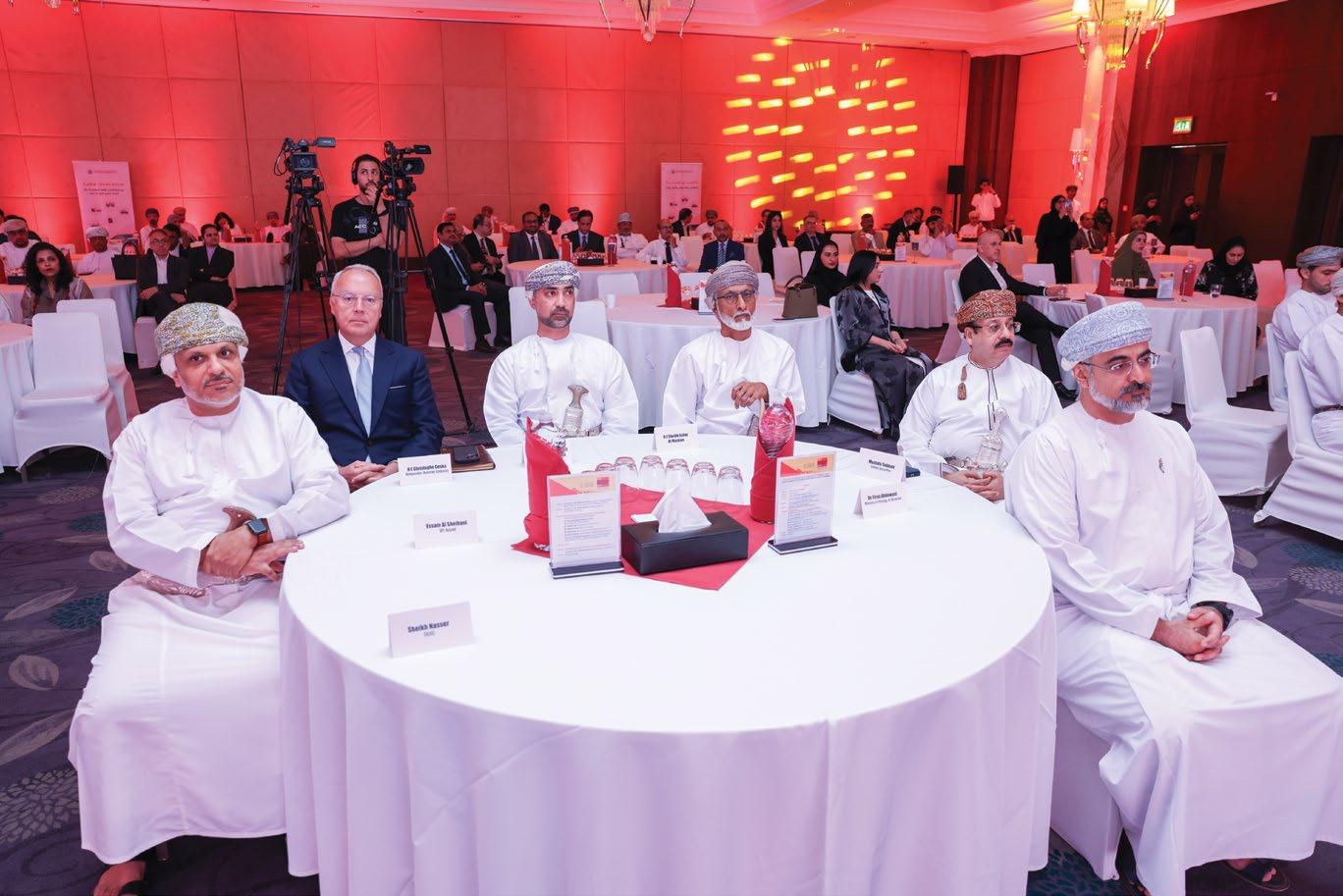
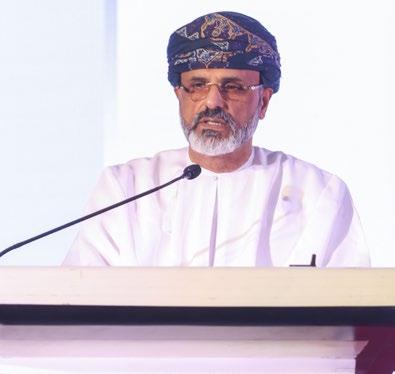
The 16th Edition of OER Business Summit, a flagship event by the Sultanate’s premium business magazine, with a special HR focus, was held at Sheraton Oman on April 30. His Highness Sayyid Mohammed bin Thuwaini Al Said was the Chief Guest at the Summit. Held under the auspices of His Excellency Shaikh Salim bin
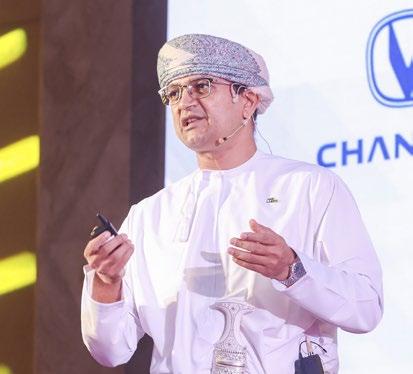
Mustahail Al Mashani and organised by UMS Events, the Summit explored the roadmap to achieving the Sultanate’s medium to long term economic and HR goals in-line with His Majesty Sultan Haitham bin Tarik’s Vision.
Under His Majesty Sultan Haitham bin Tarik’s Visionary Leadership, Oman has taken remarkable strides
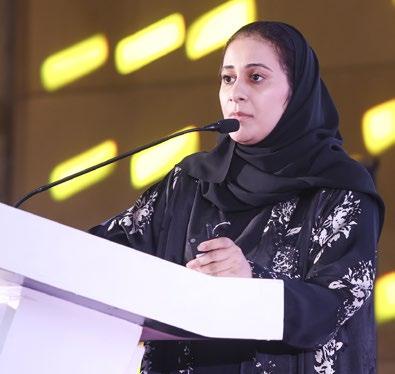
in economic development, social betterment, and robust bilateral ties. The country has also been instrumental in addressing structural challenges, fostering fiscal responsibility and setting the stage for a more diversified and resilient economy. According to the National Center for Statistical Information (NCSI) Oman’s GDP growth is expected to be 1.9 per cent at



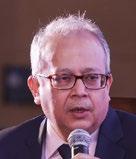

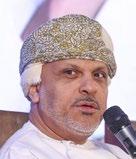
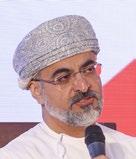
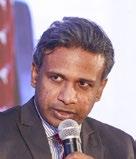
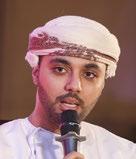
constant prices by the end of Q3 2024. Further, the preliminary results of 2024 show an increase in total revenue that led to a surplus than the deficit that was estimated in the 2024 budget. Total revenue for 2024 is projected to reach RO12.67bn and increase of 15.1 per cent compared with the budgeted figure of RO11.01bn. (up by 15.1 per cent). Overall, the budget is expected to generate a surplus of RO0.54bn compared with the 2024 budget deficit of RO0.64bn.
The Summit had keynote presentations
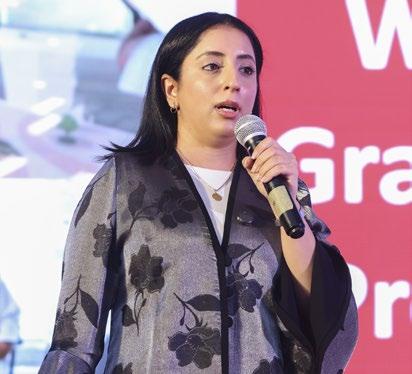
by Alkesh Joshi, Tax Partner, EY Oman and MENA, Sustainability Tax Leader, EY and Reem Al Taie, Investor Relations Associate, Oman Investment Authority and presentation by Wisal Al Rashdi, Human Resources Manager, WUJHA Development. The Summit deliberated on the topic, “Unlocking the Potential of Oman’s Renewed Renaissance.” Panelists included Dr
Firas Al Abduwani, Director General, Renewable Energy & Hydrogen, Ministry of Energy & Minerals, Essam Al Sheibani, VP, Sustainability, ASYAD, Omar Al Harthi, Business Development, Invest Oman, Harssha Shetty, CEO, Jindal Steel Sohar and Karl Jackson, Partner-ESG, Crowe Oman. Mayank Singh, Group Editor, UMS moderated the session.
The Summit was endorsed by Advantage Austria from Embassy of Austria and Embassy of Tanzania,
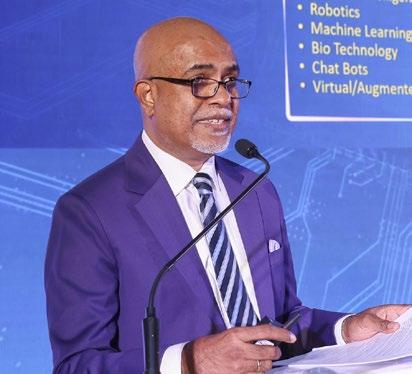
Muscat. RAB Consulting was the Knowledge Partner, while ZiBi (Zanzibar Investments & Business Insights magazine) the Zanzibar Media Partner, Daily Tribune newspaper, the Bahrain Media Partner and Qatar MirchiOne 89.6FM, the Qatar Media Partner. Alam Al Iktisaad was the Arabic media partner and OERLive.com, the Online Media
Partner. The Summit brought together government and business leaders to brainstorm and share their experience on leading the country and companies into an uncertain future. Senior government officials, C-Suite executives discussed a roadmap for building a responsible and resilient business. OER Business Excellence Awards were presented to Companies, CEO’s and senior executives in recognition of their path breaking efforts and success.
The Summit also had presentations
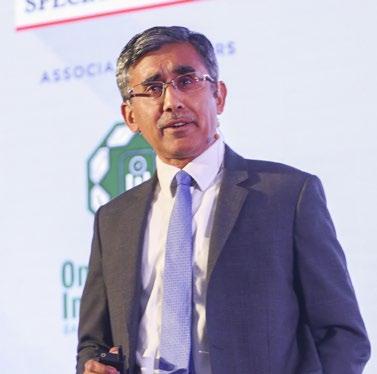
by Venkatesh Palakkad, Director & Principal Consultant, Reem Al Bawadi Business Solutions and Technologies LLC and Dr. Manish Dhameja, Strategic Leader and Senior Banking professional. The HR edition of the Business Summit deliberated on ‘Developing & Nurturing Internal Talent.’ Panelists included Hamza Al Lawati, HR Director, Infoline, Wisal Al


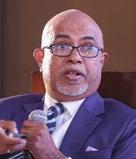
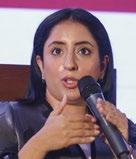
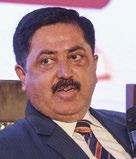
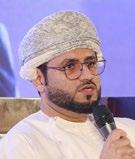
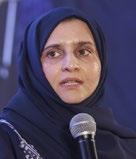

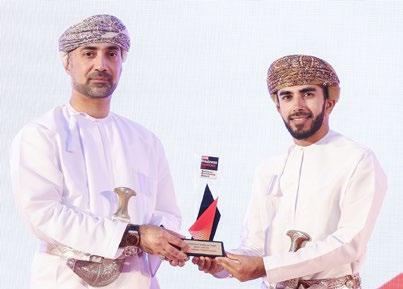

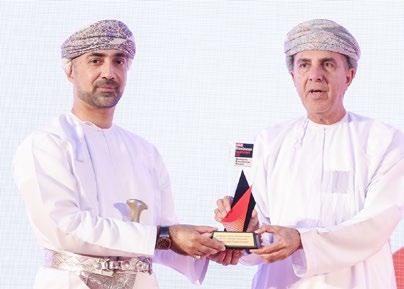
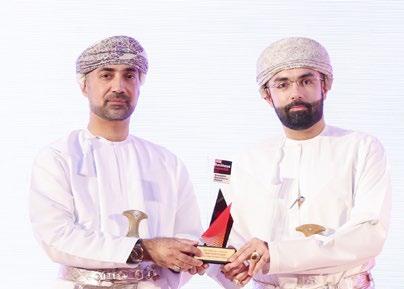
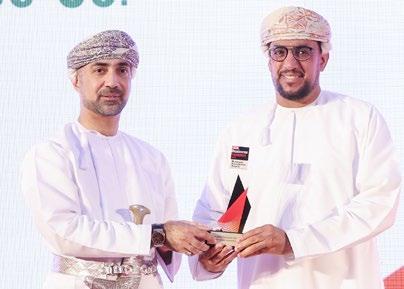
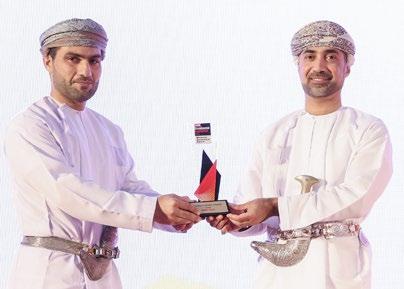
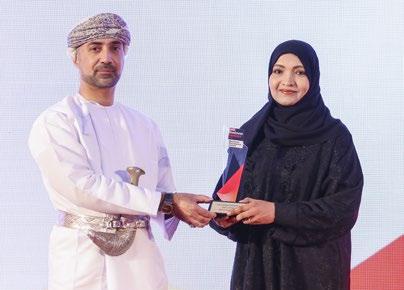

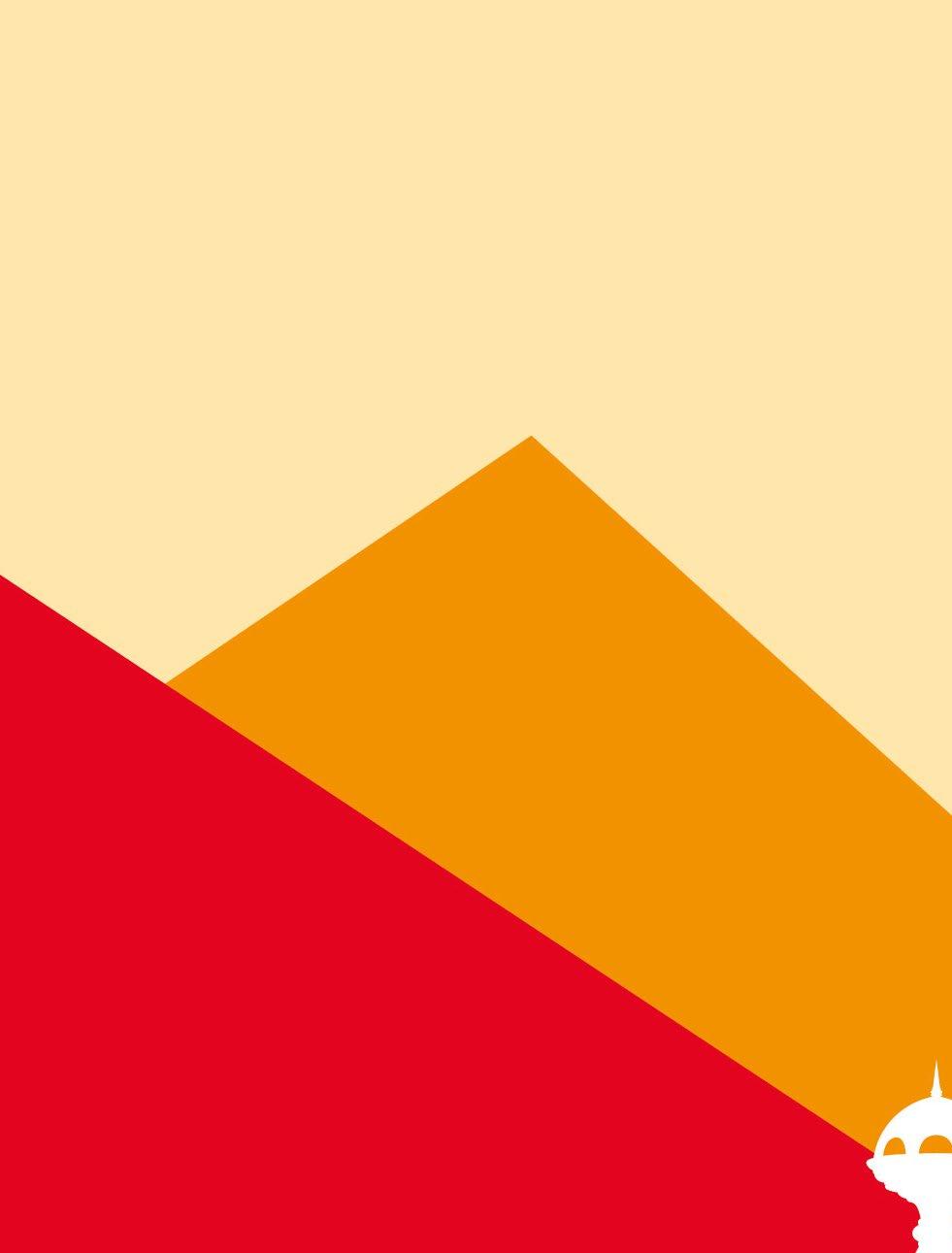
Rashdi, Human Resources ManagerWUJHA Development, Atia Ashfaq
Rasool Muhammad Hanif, Deputy Head of HR, Dhofar Insurance, Fahad Al Jabri, Learning Design Advisor, PDO and Ritesh Arora, Head, Human Capital Development, Bank Muscat. Venkatesh Palakkad, Director & Principal Consultant, Reem Al Bawadi Business Solutions and Technologies LLC moderated the HR Session. In addition, there was an interactive workshop on the theme- Fostering Workplace Mental Wellbeing presented by Roula Saba Mouhanna, Executive and Leadership Coach.
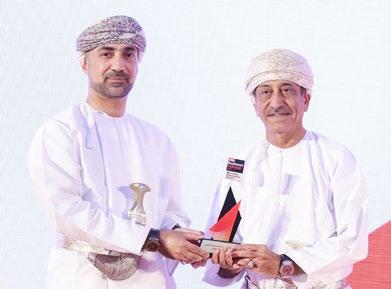
OER BUSINESS AND HR EXCELLENCE AWARD WINNERS
‘Excellence in Innovation & Business Growth’ - National Finance
‘Enabling Economic Diversification and Social Responsibility in Alignment with Vision 2040’ -Jindal Steel Sohar
‘Innovation in Clean Energy Manufacturing’ -Al Tamman Ferro Alloys
‘Leadership in Investment Solutions’ - United Securities
Innovative Technologies and Work Solutions -Xerox from Bishara Establishment LLC
Best Emerging Financial Institution for Cross-Border Service Innovation - Oman Investment Bank
‘Excellence in Industry Standards Award – API 5L Certification Achievement’ - Al Jazeera Steel Products Company
‘Consistent Shareholder Value Creation’ -Oman United Insurance Company
HR Excellence Award for Fostering Omani Talent Development -Wujha Graduate Program by WUJHA Real Estate
Cross Sectoral Contribution to Oman’s Economy -Muscat Overseas Group
SUV of the Year -UNI-S from Changan
Excellence in Next-Gen AI Solutions -Infoline
Greater Brand Visibility and Unique Market Leadership -Gulf Mushroom Products Company
HR Manager of the year- Atia Hanif, Acting Head of HR, Dhofar Insurance
CEO of the Year in the Insurance segment- Hasan Al-Lawati, CEO, Oman Qatar Insurance Company
Zibi -Media partner from Zanzibar
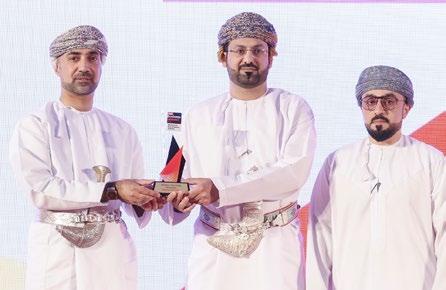
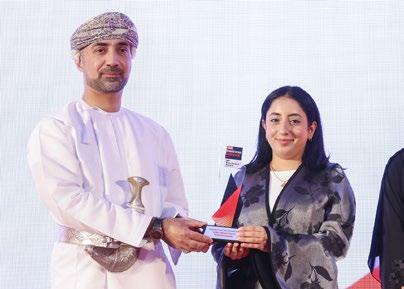

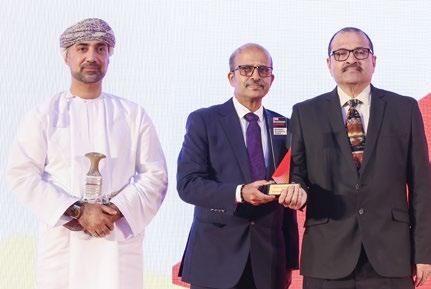
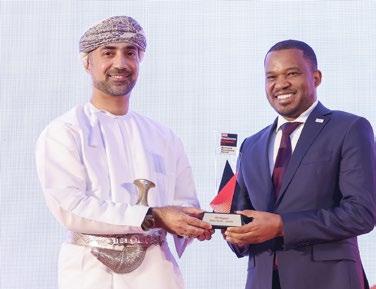
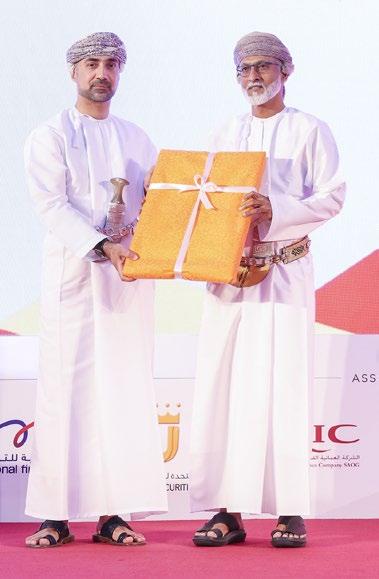
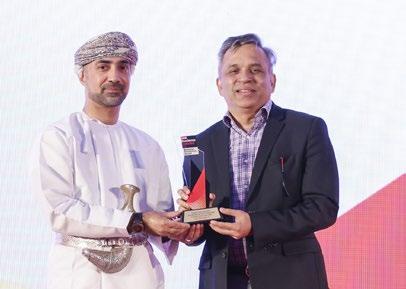

BILLBOARD
Alfardan Properties launches the exclusive “Alfardan Living Privilege Programme” and “Alfardan Oyster Privilege Club” in Oman
Alfardan Properties has officially launched “Alfardan Living Privilege Programme” and “Alfardan Oyster Privilege Club” which was attended by Alfardan Properties’ distinguished tenants at The St. Regis Al Mouj Muscat Resort. Having been successfully launched previously in Qatar, these programs have now been introduced to enhance the lifestyle of distinguished residential and commercial tenants based in premier mixeduse developments in Oman: Alfardan Heights and Finaa Alfardan.
“Alfardan Living Privilege Programme” is designed exclusively for elite residential tenants at Alfardan Properties while “Alfardan Oyster Privilege Club” is a program tailored to their commercial tenants and their employees, both offering access to a world of carefully curated benefits and unparalleled experiences. In Oman, Alfardan Properties’ tenants will enjoy bespoke preferential rates at The St. Regis Al Mouj Muscat Resort, including preferred rates across hotel rooms, award-winning Guerlain Spa and renowned dining outlets such as Em Sherif, Coya, Novikov Café, Roberto’s, Hakkasan, and Zorba, among others. International privileges extend across Qatar and Türkiye, offering preferential rates at 5-star hotels, over 50 award-winning dining outlets, and exclusive spas at premier destinations such as The St. Regis Doha, The St. Regis Marsa Arabia Island, Marsa Malaz Kempinski in Qatar, and Six Senses Kocataş Mansions in Istanbul. Additionally, members enjoy preferred rates across Alfardan Jewellery brands. The remarkable success
BonBird takes flight in Oman with first Muscat location now open
BonBird, Dubai’s favourite fried chicken brand, has made its Oman debut with the opening of its first-ever location at Souq Madinat Al Qaboos, bringing its signature feel-good fried chicken to the heart of Muscat. Known for its fresh, antibiotic-free, preservative-free, and hormone-free fried chicken, BonBird is set to turn Oman’s QSR food scene on its head with bold flavours and unbeatable freshness. Its UAE-born parent company, Yolk Brands, has teamed up with Oman-based partner MENA Foods to bring BonBird to the Sultanate, with sister brand Pickl set to follow soon. A second BonBird location is already in the works for Q2 2025, reflecting MENA Foods’ vision to grow and elevate Oman’s QSR landscape.“We are on a mission to expand Oman’s QSR food scene and saw immense potential in BonBird, not just because of the food, but because of the incredible team and the values it lives by.” said Tahir Al Balushi, Co-founder and CEO of MENA Foods. “We love the fact that the brand focuses on high-quality, fresh chicken with no added hormones or preservatives. You are truly getting all bird, no bull.” MENA Foods’ partnership with Yolk Brands also includes plans to bring its multiaward-winning burger concept Pickl to Oman with its first location set to open in Q1 2026, further strengthening MENA Foods’ presence in the country.
Since its launch in 2023, BonBird has rapidly grown into one of the region’s favourite go-to fried chicken brands, offering a premium quality yet value-driven menu featuring buckets of fresh fried chicken, chicken burgers, wraps, and rice bowls—all customisable with a range of unique seasonings, including its signature BonBird Chicken Salt and the fiery XXX Hot. Inspired by East London’s iconic chicken shops, BonBird delivers a modern spin to comfort food with high-energy dining, sleek, urban design and a commitment to quality
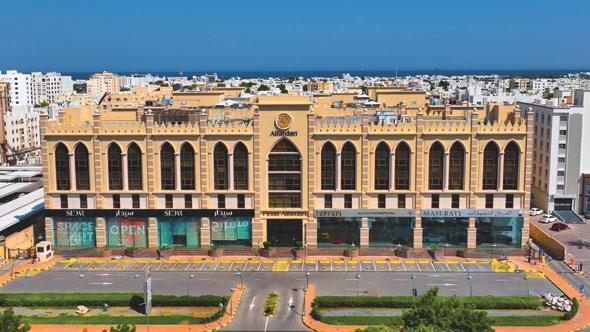
of the “Alfardan Living Privilege Programme” and the “Alfardan Oyster Privilege Club” in Qatar has played a pivotal role in driving their expansion to Oman. These initiatives have become cornerstones of Alfardan Properties’ commitment to distinctive living, elevating residential and corporate experiences through exclusive access to a curated suite of premium lifestyle benefits. Their success and strong impact on tenant satisfaction have underscored the programs’ ability to create meaningful connections and deliver exceptional value – making their introduction to the Omani market a strategic next step.
Commenting on this expansion, Mohamed Sleiman, CEO, Alfardan Properties and Alfardan Hospitality, states: “Introducing these two programs in Oman marks a key milestone for us. By extending tailored privileges across three countries, we are enhancing the living and business experiences of our partners and residents, while setting a new industry benchmark. More than just benefits, these programs build a connected community defined by luxury,
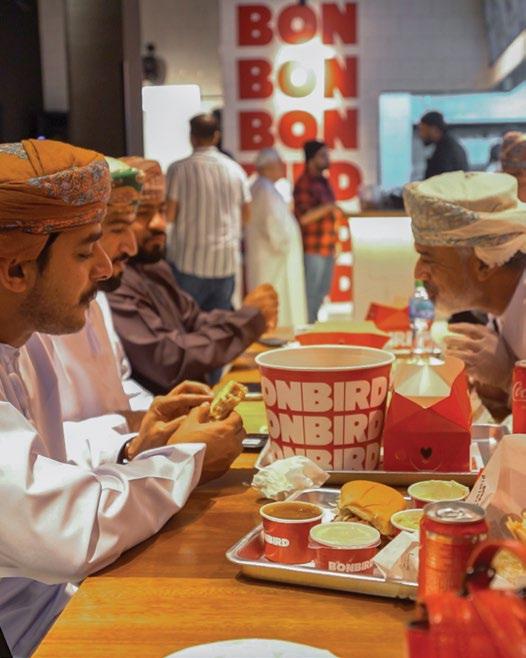
BonBird locations in the UK — with further global expansion plans already in the pipeline. Steve Flawith, Founder and CEO, Yolk Brands, said, “Bringing BonBird to Oman is a significant milestone in our greater vision for the brand and we’re thrilled to have partnered with MENA Foods to make it happen. Since its launch, we have firmly believed in BonBird’s vast global potential and opening doors in our 4th country in less than 2 years fuels our ambitions even more.
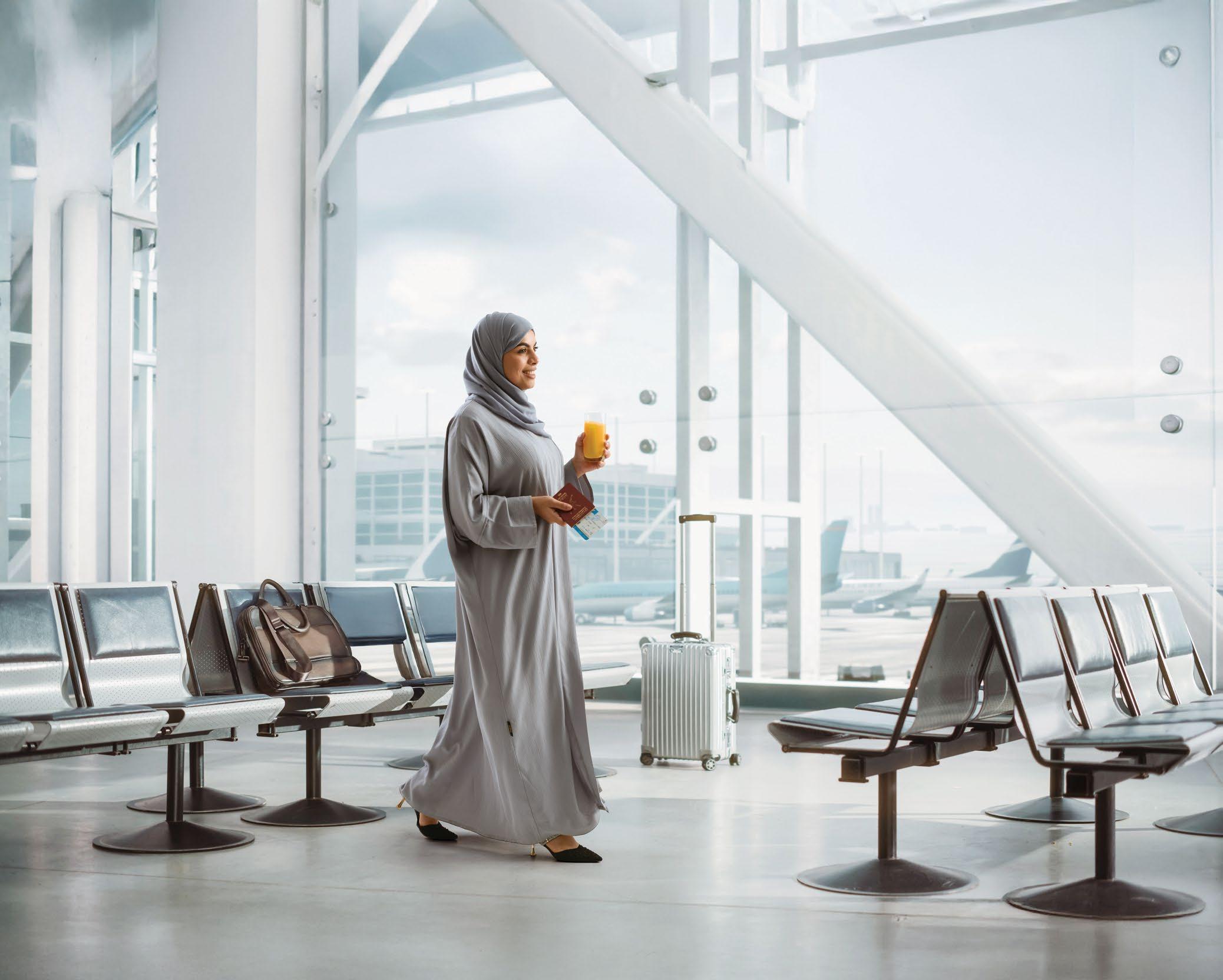
Enjoy exclusive lounge access with Meethaq Credit Cards
Travel in style and experience the world of privileges with Meethaq. With your Meethaq Credit Card, you can access airport lounges worldwide, relax in comfort and enjoy exclusive services designed for our valued customers.
Get started today
• Download the Visa Airport Companion App
• Register your Meethaq Credit Card
• Access airport lounges worldwide
Download and register on the Visa Airport Companion App today!
